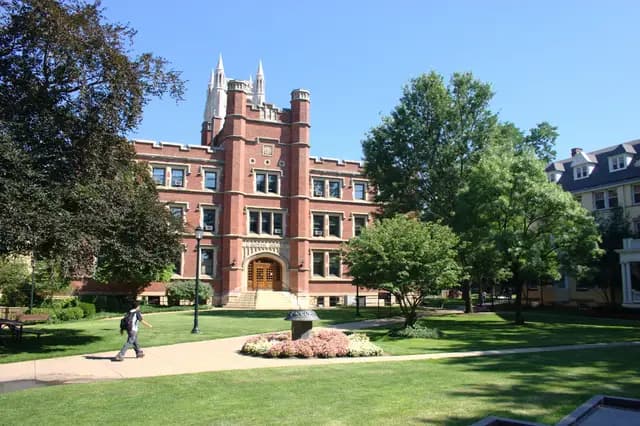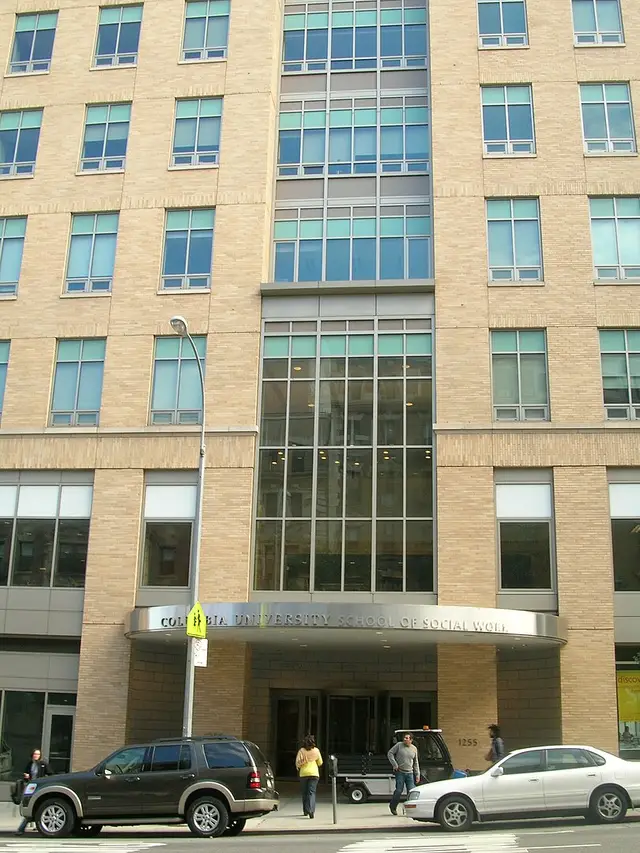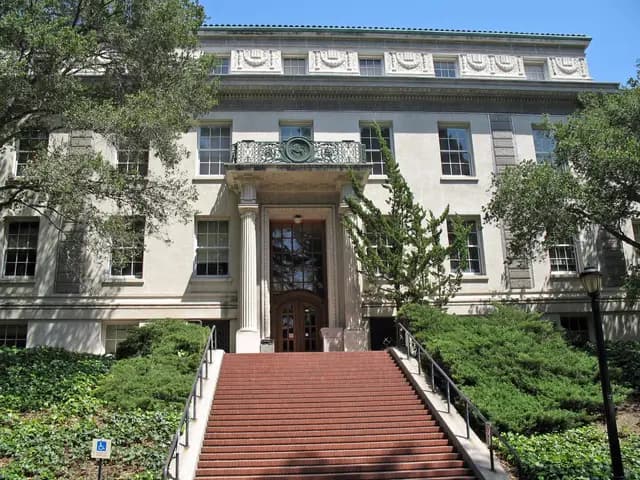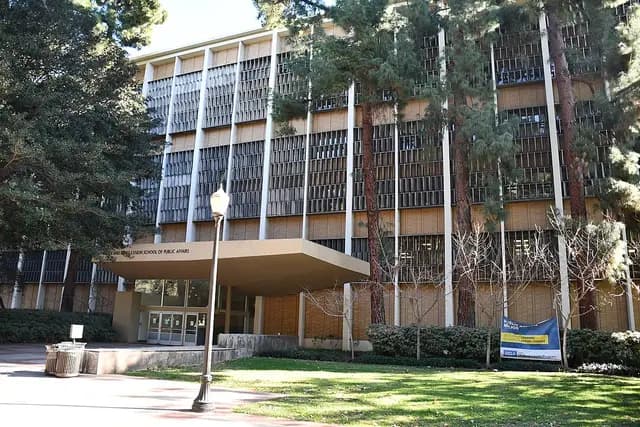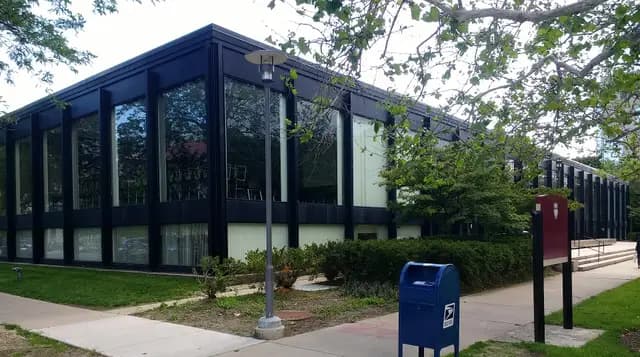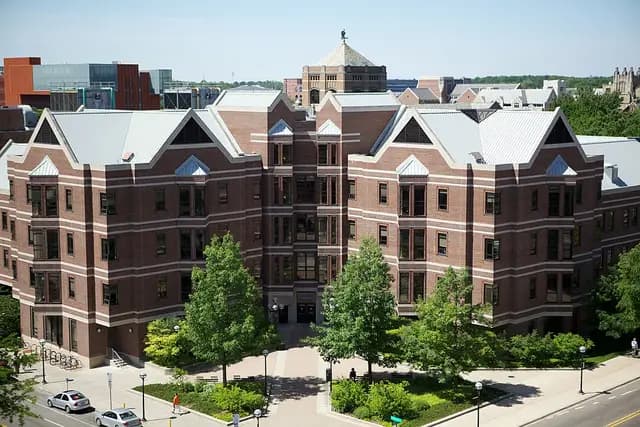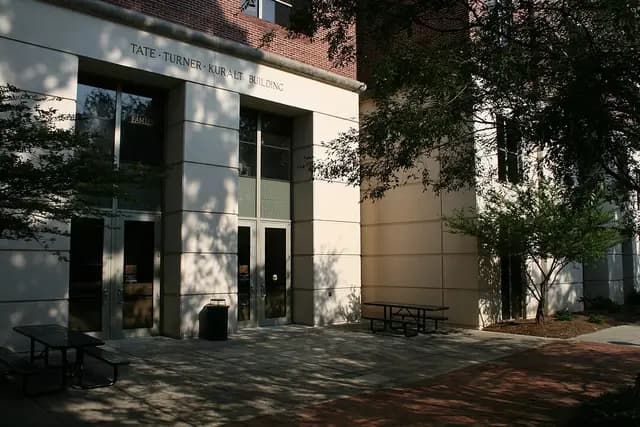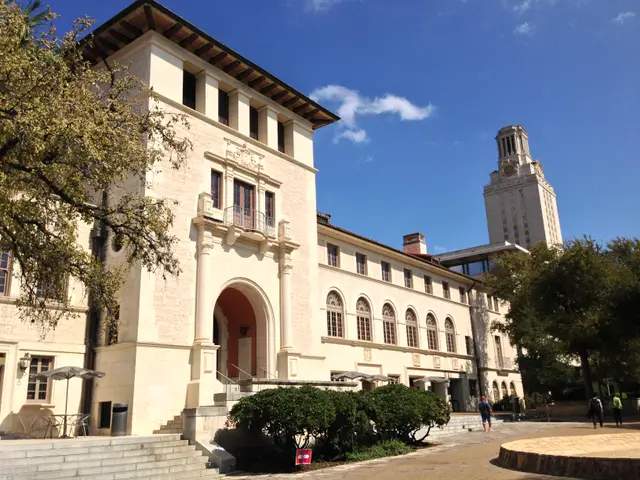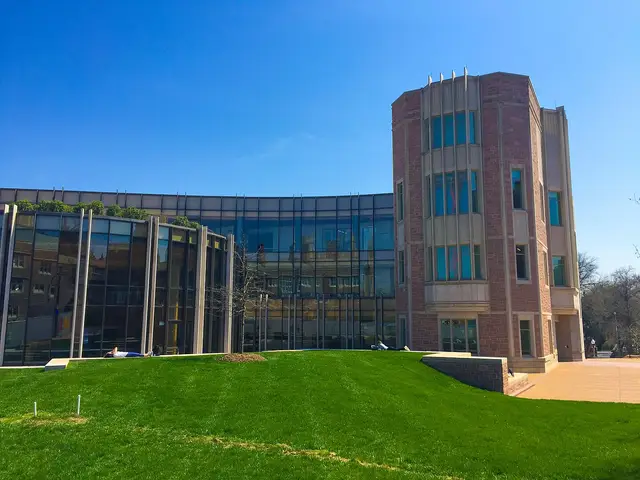
Top graduate schools in the United States

Top graduate schools in the United States
Looking for the top graduate schools? We put together a comprehensive list of the best graduate programs, and put the results below. We include the acceptance rate, average GRE scores, and a brief description of each - all the information you need to kick start your research. Read on!
Want to see the top graduate schools for a specific program? View graduate school programs.
Table of contents
232.Conclusion
American University Communications school acceptance rate
American University's Communications acceptance rate is 44.00%.

Herrperry123 / Wikimedia Commons / "McKinley Building today" / CC BY-SA 4.0
American University's School of Communication (SOC) offers a comprehensive and prestigious graduate program in strategic communication. Located in Washington, DC, the program prepares students to become skilled strategic communicators in various professional settings, including corporations, government agencies, and nonprofit organizations. Through the Master of Arts in Strategic Communication program, students gain cutting-edge tools and insights to develop and execute impactful communication campaigns. With the guidance of experienced faculty, students learn to address complex challenges creatively and strategically, utilizing information in innovative ways. The program also provides access to modern facilities, including specialized classrooms and computer labs, enabling students to acquire practical skills in multimedia editing. Graduates of the program emerge equipped to navigate the ever-changing media landscape and make a significant impact in their careers.
American University International Relations school acceptance rate
American University's International Relations acceptance rate is 82.00%.
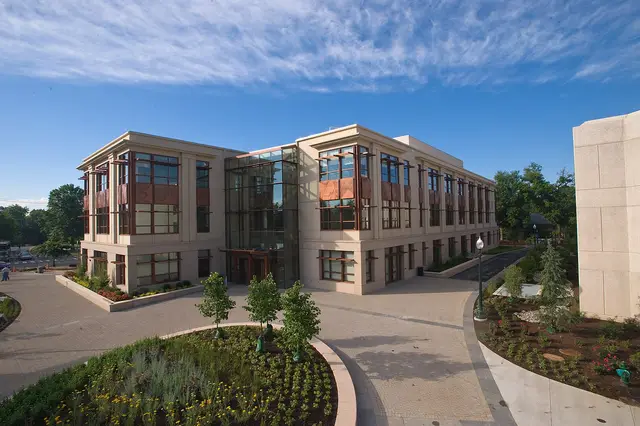
AnnieLyon / Wikimedia Commons / "American University School of International Service building" / CC BY-SA 3.0
American University's Master of Arts in International Relations (MAIR) Online program is a distinctive offering that prepares students to become leaders in our globally interconnected world. Through a flexible online format, students gain essential skills in critical thinking, analysis, questioning, understanding, and action. The program offers four concentration options, including Global Security, U.S. Foreign Policy and National Security, International Development, and International Negotiation and Conflict Resolution. What sets this program apart is its commitment to supporting military service members, veterans, and their families by allowing them to apply their VA education benefits and waiving the application fee for recent active-duty military personnel. Graduates join a global alumni network dedicated to making a positive difference worldwide.
Arizona State University Interior Design school acceptance rate
Arizona State University's Interior Design acceptance rate is 60.10%.

NickSchweitzer / Wikimedia Commons / "Main Entry to the ASU west campus" / CC BY-SA 3.0
The Design School, part of the Herberger Institute for Design and the Arts, is the largest and most comprehensive design school in the nation. Their diverse programs consistently rank in the top 20 nationwide, providing students with the opportunity to master their respective design disciplines. Collaboration and interdisciplinary work are emphasized, fostering an innovative spirit that drives new ideas and problem-solving through partnerships with industry, communities, and other academic units. The school is committed to creating a better future for all, welcoming individuals of all backgrounds and abilities to participate in the design process. With state-of-the-art facilities and a location in the vibrant city of Phoenix, students at the Design School have access to exceptional opportunities for learning, cultural experiences, and professional growth. The school values diversity, equity, inclusion, and belonging, actively engaging in ongoing efforts to promote these principles and ensure the success of every individual in their educational and professional journey.
California Institute of Technology Chemical Engineering school acceptance rate
California Institute of Technology's Chemical Engineering acceptance rate is 18.00%.
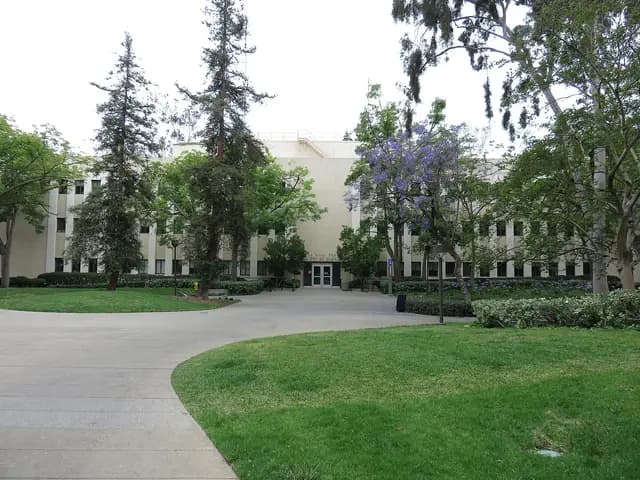
Antony-22 / Wikimedia Commons / "E. Spalding Laboratory Caltech 2018" / CC BY-SA 4.0
The Chemical Engineering program at Caltech offers students a comprehensive education in applying various disciplines to understand chemical reactions, transport phenomena, and the development of new processes and materials. It traces its roots back to Arthur Amos Noyes, who initially established it as applied chemistry. The department's notable involvement in Project 37 of the American Petroleum Institute contributed significantly to advancing knowledge in thermodynamics and phase equilibria in hydrocarbon systems. Admission to these esteemed graduate options is highly competitive, with emphasis on selecting students with broad interests and creative thinking. The programs prioritize immersive research experiences, allowing students to explore their scientific interests fully. The ultimate goal is to equip graduate students with the necessary training and research experiences to obtain a PhD degree.
California Institute of Technology Chemistry school acceptance rate
California Institute of Technology's Chemistry acceptance rate is 10.00%.
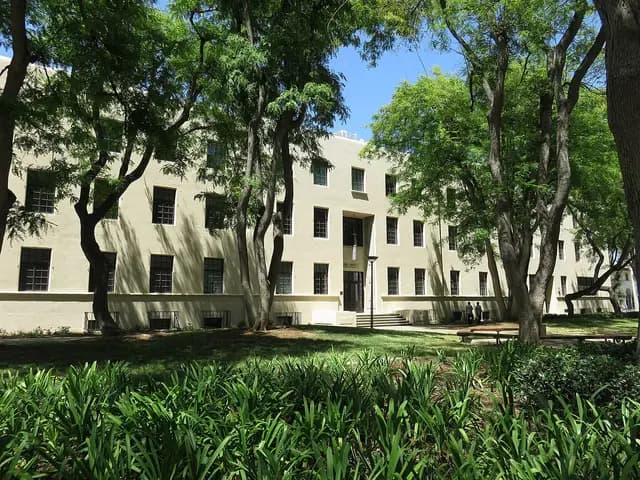
Antony-22 / Wikimedia Commons / "Thomas Laboratory Caltech 2017" / CC BY-SA 4.0
The chemistry program at Caltech offers in-depth education in various areas of chemistry, including organic and inorganic chemistry, chemical physics, theoretical chemistry, and chemical biology. Research opportunities cover chemical synthesis, catalysis, reaction mechanisms, biochemistry, and materials chemistry. Normally, Caltech does not admit students for a Master of Science (M.S.) degree, but exceptions can be made with prior approval. The M.S. degree in Chemistry requires completion of graduate-level courses, participation in a research project supervised by a faculty member, and submission of a satisfactory Master's Thesis. The thesis must be supported by at least 45 units of chemical research and should meet formatting guidelines and approval requirements outlined by the Graduate Office.
California Institute of Technology Electrical Engineering school acceptance rate
California Institute of Technology's Electrical Engineering acceptance rate is 7.00%.
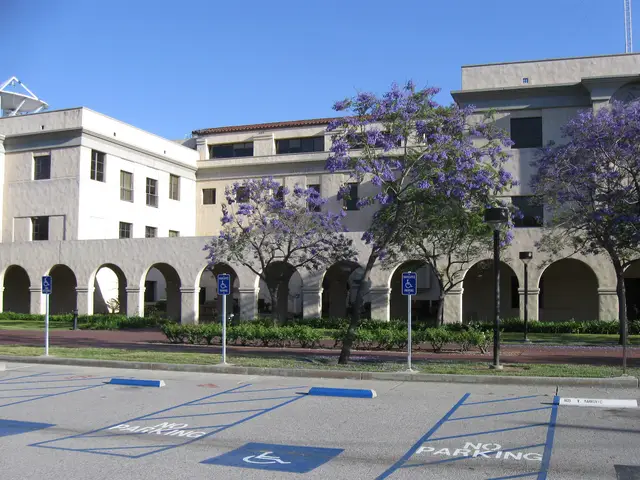
Antony-22 / Wikimedia Commons / "Moore Laboratory Caltech 2013" / CC BY-SA 3.0
Caltech's reputation as a leading research university rests significantly on its exceptional graduate students. The Electrical Engineering Department exemplifies this, with its accomplished and motivated students collaborating closely with professors, establishing it as one of the country's top departments. As the competition for admission is fierce, the Admissions Committee meticulously selects applicants who are both highly qualified and suited for the program. Typically, the master's degree in electrical engineering takes one year to complete. Evaluation criteria include applicants' preparedness for the math- and physics-oriented coursework and the Committee's judgment on their ability to excel in the program. Admission to the master's program is not usually granted if the applicant already possesses a master's degree from another U.S. institution.
California Institute of Technology Engineering school acceptance rate
California Institute of Technology's Engineering acceptance rate is 9.10%.
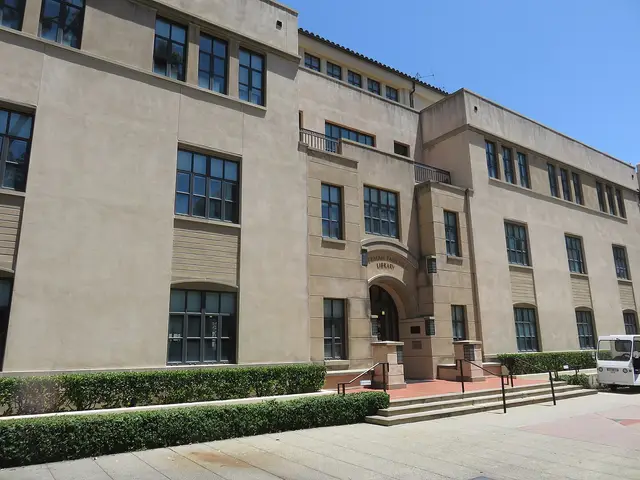
Antony-22 / Wikimedia Commons / "Sherman Fairchild Library Caltech 2019" / CC BY-SA 4.0
The California Institute of Technology's Graduate School of Engineering has made significant contributions to engineering across various fields. Their Jet Propulsion Laboratory, which is a federally funded research and development center they manage for NASA, has been instrumental in aerospace advancements, including America's first Earth-orbiting science satellite. They have pioneered research in materials science, leading to breakthroughs in nanotechnology and semiconductors. Additionally, they have made strides in environmental engineering, addressing issues such as renewable energy and climate change. Through interdisciplinary collaboration and a commitment to scientific excellence, Caltech Engineering remains at the forefront of innovation and impactful research.
California Institute of Technology Math school acceptance rate
California Institute of Technology's Math acceptance rate is 24.00%.
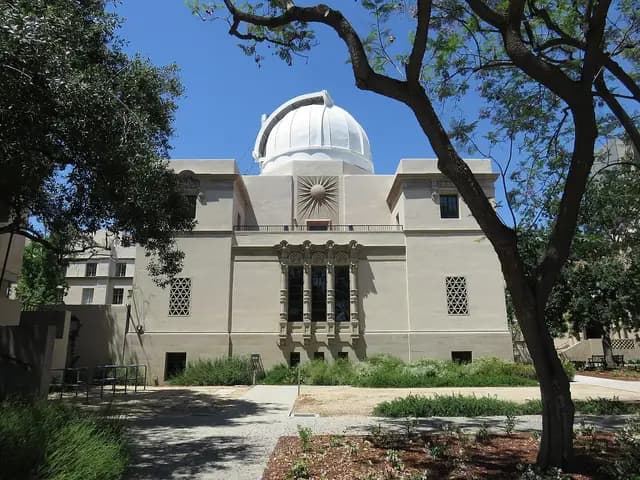
Antony-22 / Wikimedia Commons / "Robinson Laboratory Caltech 2017a" / CC BY-SA 4.0
Caltech's mathematics department is renowned as one of the top in the nation, offering a highly rigorous graduate program. Geared towards preparing students for research careers in academia, industry, or government, the program exclusively admits those pursuing a Ph.D. Over the past fifteen years, Caltech has granted around 90 doctorates in mathematics, with many graduates securing attractive positions as university faculty members or researchers in industry and government. The department fosters a conducive environment for creative research, with a small student body, a sizable faculty, and an informal atmosphere that facilitates close faculty-student interactions. In addition, Caltech boasts an impressive mathematics library and provides students with extensive computing resources on campus.
California Institute of Technology Mechanical Engineering school acceptance rate
California Institute of Technology's Mechanical Engineering acceptance rate is 10.00%.
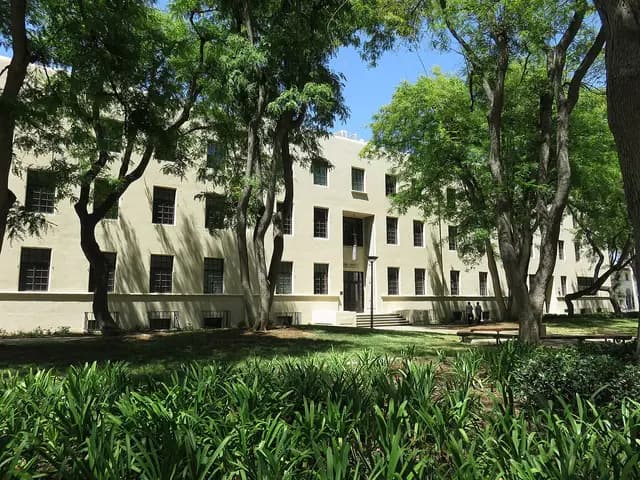
Antony-22 / Wikimedia Commons / "Thomas Laboratory Caltech 2017" / CC BY-SA 4.0
The program in Mechanical Engineering at Caltech is a highly selective and research-oriented graduate program. Admission is primarily granted to those intending to pursue a Ph.D. degree. Graduates from the program have successful careers in both industry and academia, with a significant percentage entering tenure-track academic positions or working in industries such as aerospace, energy, and semiconductors. Financial support in the form of fellowships, teaching or research assistantships is provided to most graduate students, covering tuition fees and living expenses. The program aims to prepare students for research and professional practice in an interdisciplinary technological environment, emphasizing independence, creativity, and leadership.
California Institute of Technology Physics school acceptance rate
California Institute of Technology's Physics acceptance rate is 20.00%.
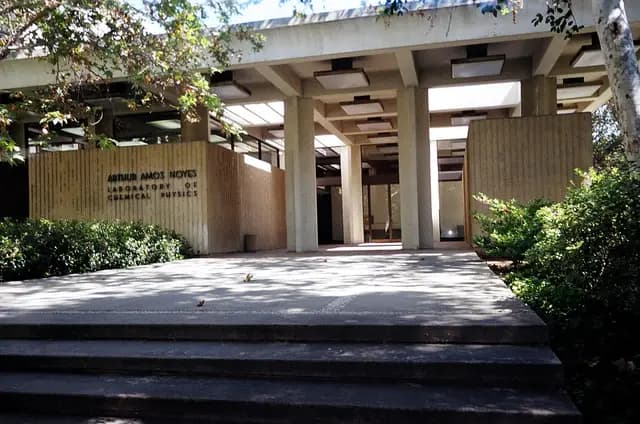
Antony-22 / Wikimedia Commons / "Noyes Laboratory Caltech 2003" / CC BY-SA 3.0
Caltech's Physics program offers a Doctor of Philosophy degree with a focus on research and teaching. Independent research is a key component, supported by courses covering fundamental and specialized physics topics. Research opportunities span diverse fields such as particle physics, astronomy, condensed-matter physics, and quantum information. Graduates gain extensive research experience, broad knowledge of contemporary physics, and the ability to excel as independent researchers. A Master of Science degree can be pursued alongside the Ph.D. Financial support, in the form of fellowships, research assistantships, or teaching assistantships, is available to approximately 99% of doctoral students. Caltech's research facilities, as well as external institutions and private industries, provide additional research opportunities.
Carnegie Mellon University Civil Engineering school acceptance rate
Carnegie Mellon University's Civil Engineering acceptance rate is 23.00%.
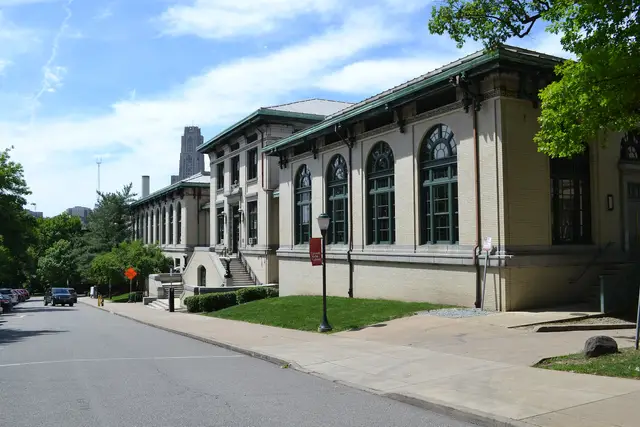
Camerafiend / Wikimedia Commons / "CMU Porter Hall" / CC BY-SA 4.0
The Civil and Environmental Engineering graduate degree programs offer specialized concentrations in Advanced Infrastructure Systems (AIS), Environmental Engineering, Sustainability and Science (EESS), and Mechanics Materials and Computing (MMCA). The programs provide flexibility, allowing students to customize their course of study according to their career and academic goals. Merit-based scholarships are available, covering a portion of tuition costs, and students may also receive paid appointments as teaching assistants and course graders. The CEE degree equips students with valuable skills in continuous learning, entrepreneurship, communication, and problem-solving, enhancing their marketability in the job market and future academic pursuits.
Carnegie Mellon University Computer Science school acceptance rate
Carnegie Mellon University's Computer Science acceptance rate is 4.90%. The average GRE Verbal Reasoning score for Carnegie Mellon University Computer Science is 150.37, and the Quantitative Reasoning score is 153.39.
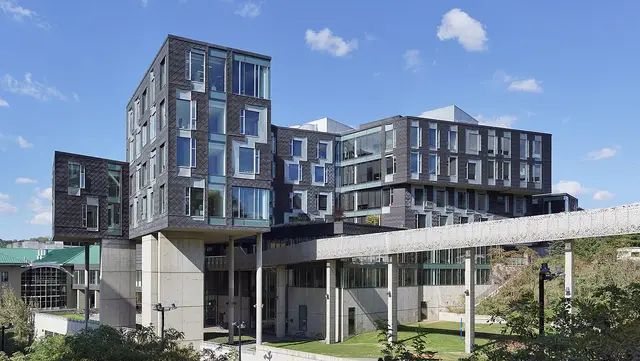
Dllu / Wikimedia Commons / "Gates-Hillman Complex at Carnegie Mellon University 3" / CC BY-SA 4.0
The Carnegie Mellon School of Computer Science, a renowned institution for computing research and education, has been a global leader for over 25 years. Its graduate programs consistently rank among the nation's best, with specialization areas including programming languages, artificial intelligence, systems, and theory. The Master of Science (M.S.) in Computer Science offers individuals with a bachelor's degree the opportunity to enhance their training through advanced study in the field. While a specific bachelor's degree in computer science is not mandatory, the school's stringent acceptance is for those with fundamental analytic skills and a strong inclination towards mathematics, programming, and logical reasoning, with a technical undergraduate background being advantageous. The program allows students to customize their course of study under the guidance of an advisor, and while research is not compulsory, many students choose to engage in it, with a thesis option available.
Carnegie Mellon University Electrical Engineering school acceptance rate
Carnegie Mellon University's Electrical Engineering acceptance rate is 23.00%.

Dllu / Wikimedia Commons / "Carnegie Mellon Hamerschlag Hall and Scott Hall" / CC BY-SA 4.0
The Master's of Science (M.S.) in ECE program at Carnegie Mellon University provides students with a comprehensive foundation in electrical or computer engineering. Students have the opportunity to specialize in specific areas of interest with the guidance of academic advisors and faculty mentors. The program offers several concentrations including Cyber-Physical Systems (CPS), Computer Security (CSec), Data and Network Science (DNS), Integrated Systems Design (ISD), and Wireless Systems (WS). While concentrations are optional, students can choose from a wide range of ECE graduate courses to fulfill their requirements and advance towards their desired career goals.
Carnegie Mellon University Engineering school acceptance rate
Carnegie Mellon University's Engineering acceptance rate is 23.00%. The average GRE Verbal Reasoning score for Carnegie Mellon University Engineering is 158, and the Quantitative Reasoning score is 167.

Dllu / Wikimedia Commons / "Carnegie Mellon Hamerschlag Hall and Scott Hall" / CC BY-SA 4.0
The Carnegie Mellon University Graduate School of Engineering stands out for its interdisciplinary approach, cutting-edge research, strong industry connections, and emphasis on entrepreneurship. With a faculty of distinguished experts, students have the opportunity to engage in groundbreaking research projects and gain practical experience through internships and collaborations. CMU's reputation as a top-ranked engineering program and its vibrant community foster a supportive and collaborative environment. The school's commitment to innovation and translating research into real-world applications prepares students for successful careers. Access to state-of-the-art facilities and resources further enhances the learning experience. Choosing CMU's engineering school means joining a prestigious institution that prioritizes interdisciplinary excellence and empowers students to make a lasting impact in the field of engineering.
Carnegie Mellon University Mechanical Engineering school acceptance rate
Carnegie Mellon University's Mechanical Engineering acceptance rate is 35.00%.

Dllu / Wikimedia Commons / "Carnegie Mellon Hamerschlag Hall and Scott Hall" / CC BY-SA 4.0
The Carnegie Mellon Institute of Technology offers graduate programs in mechanical engineering that combine deep knowledge in fundamental areas with interdisciplinary breadth. The programs emphasize hands-on research and learning, enabling students to solve complex problems through collaboration and innovation. With a low student/faculty ratio and a close-knit environment, the MechE department supports over 300 graduate students. Alumni find opportunities in both industry and academia, as evidenced by the post-grad dashboard provided by the Career and Professional Development Center. The institute offers interdisciplinary majors, global study options, and accelerated master's programs. Faculty and students engage in research projects, with multiple research centers on campus and additional facilities in Silicon Valley.
Columbia University Architecture school acceptance rate
Columbia University's Architecture acceptance rate is 5.80%.
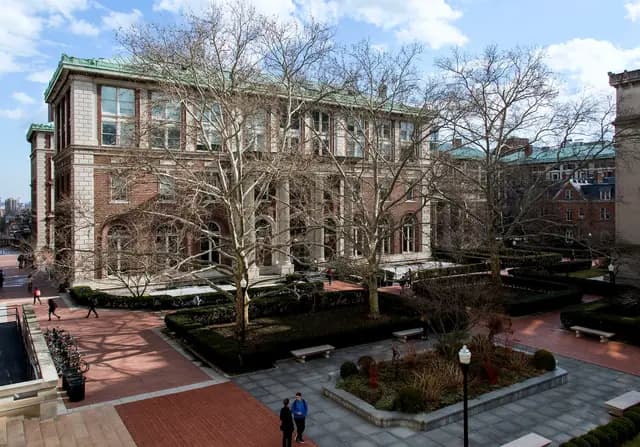
GSAPPstudent / Wikimedia Commons / "Columbia University Avery Hall" / CC BY-SA 4.0
The Columbia University Graduate School of Architecture, Planning and Preservation (GSAPP), established in 1881, is a pioneer in architectural education. Known for its innovative and interdisciplinary approach, the school focuses on urban design, sustainability, and social responsibility. The Avery Architectural and Fine Arts Library, the largest architectural library in the United States, is a valuable resource for students. GSAPP alumni are at the forefront of architectural practice, addressing political, technological, intellectual, and environmental issues. The school redefines the role of architecture within a research university, promoting new forms of practice and interdisciplinary collaboration. Its Centers, Labs, Incubator, and Initiatives lead groundbreaking investigations in the built environment.
Columbia University Business school acceptance rate
Columbia University's Business acceptance rate is 22.06%. The average GRE Verbal Reasoning score for Columbia University Business is 161, and the Quantitative Reasoning score is 161. The average GMAT score for Columbia University Business is 732.
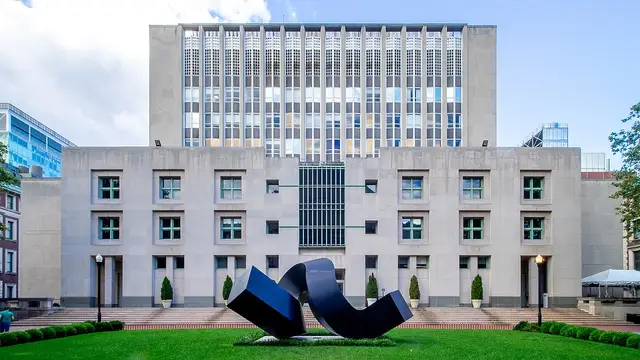
Ajay Suresh from New York, NY, USA / Wikimedia Commons / "Columbia Business School - Uris Hall" / CC BY 2.0
Columbia University's Business School, known as Columbia Business School (CBS), stands as a prestigious institution with a rich legacy and a global impact. Established in 1916, CBS has been a trailblazer in business education, cultivating innovative thinkers and transformative leaders. Situated in the vibrant city of New York, CBS provides unparalleled access to industry opportunities and a thriving business ecosystem. With its selective acceptance rate, CBS attracts exceptional students from diverse backgrounds. The school's rigorous curriculum, renowned faculty, and emphasis on experiential learning prepare graduates to navigate complex business challenges. Notably, CBS boasts an impressive alumni network that includes notable figures such as Warren Buffett, Henry Kravis and Sallie Krawcheck. This network provides valuable connections and mentorship opportunities for students. With a commitment to academic excellence, entrepreneurship, and global perspectives, Columbia Business School continues to shape the future of business by nurturing leaders who make a significant impact in their fields.
Columbia University Communications school acceptance rate
Columbia University's Communications acceptance rate is 54.00%.
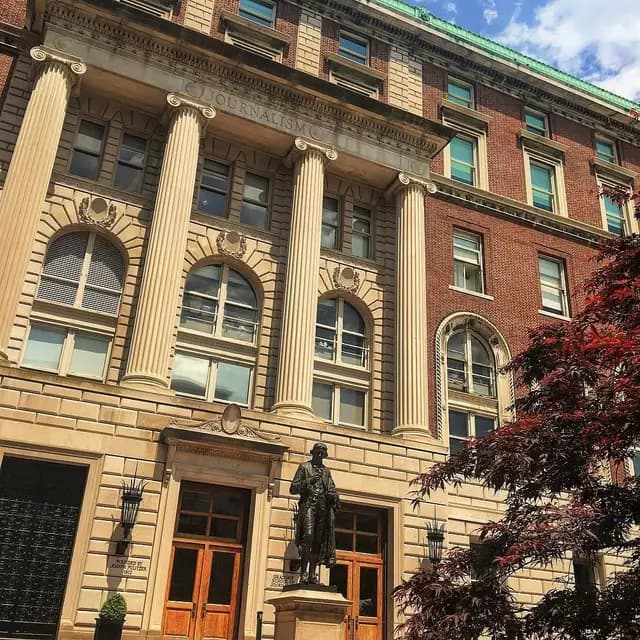
Columbex / Wikimedia Commons / "Columbia J-School" / CC0
The Strategic Communication program at Columbia University's School of Professional Studies aims to address the industry's need for critical thinking and exceptional communication skills. The program takes advantage of Columbia's position as a creative leader and offers hands-on learning in the media market. Students engage in improvisation exercises, design sessions, and real-world communication challenges. They gain experience in crisis management, campaign analysis, and internal communication. The program offers different formats for students with varying levels of professional experience, including executive, part-time, and full-time paths. Columbia College Chicago also provides Strategic Communication courses tailored to working professionals with flexible scheduling options.
Columbia University Economics school acceptance rate
Columbia University's Economics acceptance rate is 25.00%.
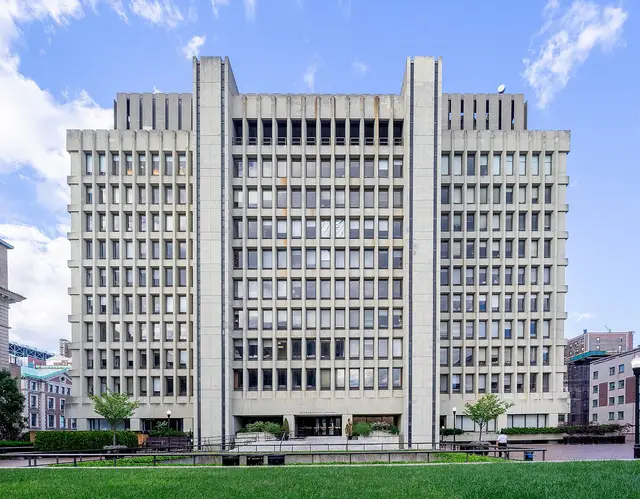
Ajay Suresh from New York, NY, USA / Wikimedia Commons / "Columbia University - School of International and Public Affairs" / CC BY 2.0
The Master of Arts program in the Department of Economics at Columbia University is aimed at students seeking to enhance their knowledge and skills in economics for future career opportunities or academic pursuits. This program offers a comprehensive curriculum that emphasizes a rigorous and technical approach to studying economics. Students have the opportunity to explore elective courses within the department for further specialization. The program admits around 75-85 students annually, equipping them with the necessary tools to conduct applied economic research. Graduates are prepared to tackle economic problems using quantitative methods, construct and analyze economic models, compete for well-paid jobs, and pursue enrollment in a doctoral program.
Columbia University International Relations school acceptance rate
Columbia University's International Relations acceptance rate is 65.00%.
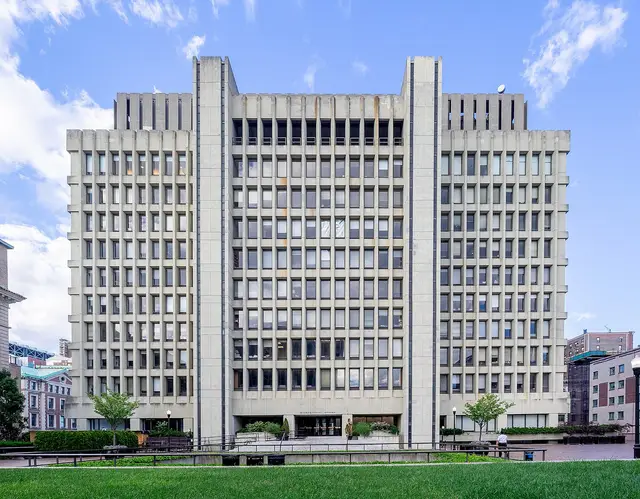
Ajay Suresh from New York, NY, USA / Wikimedia Commons / "Columbia University - School of International and Public Affairs" / CC BY 2.0
MIA students at Columbia University gain comprehensive knowledge, practical skills, and real-world experience to tackle global challenges in international affairs. The program combines academic excellence with experiential learning, including workshops with organizations worldwide. The core curriculum offers customization with various courses on international politics and political economy. Students can specialize in majors such as International Security Policy, International Finance and Economic Policy, Economic and Political Development, Human Rights and Humanitarian Policy, Energy and Environment, or Urban and Social Policy. Graduates join a vibrant network of MIA alumni in prestigious positions across public, private, and nonprofit sectors globally. Notable employers include the United Nations, government departments, banking firms, consulting companies, and humanitarian organizations. The program also provides language proficiency, international immersion courses, fieldwork opportunities, and dual degree options. The employment and further study rate is at an impressive 93.2%.
Columbia University Journalism school acceptance rate
Columbia University's Journalism acceptance rate is 19.11%.
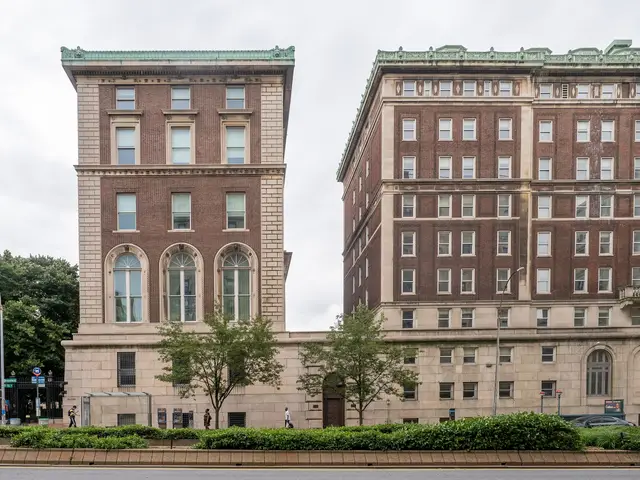
ajay_suresh / Wikimedia Commons / "Columbia University Graduate School of Journalism - Pulitzer Hall" / CC BY 2.0
The Columbia University Graduate School of Journalism, founded in 1912, is located in Pulitzer Hall on Columbia's Morningside Heights campus in New York City. It is one of the oldest journalism schools globally and the only Ivy League journalism school. The school offers four graduate degree programs and shares facilities with the Pulitzer Prizes. It also administers other prestigious awards such as the Alfred I. duPont-Columbia University Award and co-sponsors the National Magazine Awards. The school is home to various centers focusing on digital journalism, media innovation, and journalism and trauma. Admission is highly selective, and the Master of Science program is a cornerstone, emphasizing newsgathering skills and specialized areas like data journalism and investigative reporting.
Columbia University Law school acceptance rate
Columbia University's Law acceptance rate is 11.40%. The average GRE Verbal Reasoning score for Columbia University Law is 167, and the Quantitative Reasoning score is 163.
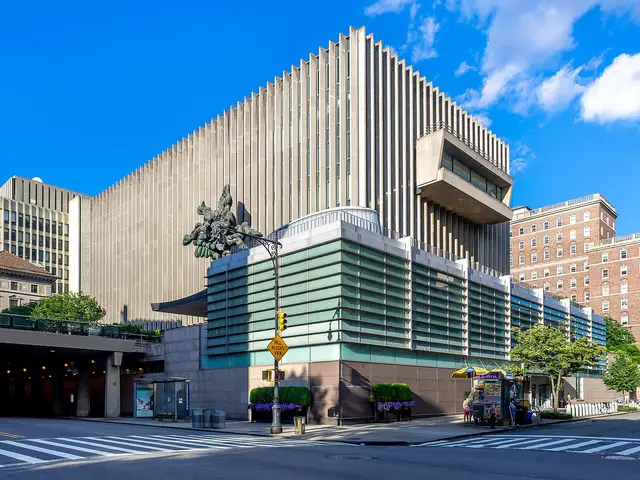
Ajay Suresh from New York, NY, USA / Wikimedia Commons / "Columbia Law School - Jerome L. Greene Hall" / CC BY 2.0
The Columbia University School of Law, located in New York City, is renowned for its exceptional legal education and rich historical relevance. The program stands out for its rigorous academic curriculum and the groundbreaking scholarship of its faculty. Columbia Law is especially well known for its strength in corporate law and its placement power in the nation's elite law firms. The school boasts an impressive track record of producing influential alumni, including United States presidents Theodore Roosevelt and Franklin Delano Roosevelt; nine justices of the Supreme Court of the United States; numerous U.S. Cabinet members and presidential advisers; US senators; representatives; governors; and more members of the Forbes 400 than any other law school in the world.
Columbia University Math school acceptance rate
Columbia University's Math acceptance rate is 28.00%.
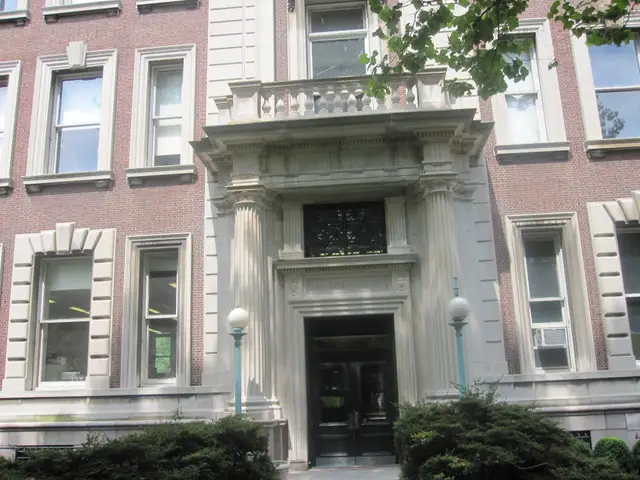
Billy Hathorn at en.wikipedia / Wikimedia Commons / "Mathematics Building at Columbia University" / CC BY-SA 3.0
The Columbia University Mathematics Department, in collaboration with Barnard College, provides comprehensive mathematics courses across different degree programs. It comprises 51 faculty members, including 30 senior and 21 junior professors, along with 18 adjunct professors, 12 Post-Doctoral Research Fellows and Scientists, and 57 PhD students. The department focuses on research activities within sub-fields of mathematics, with faculty members forming groups based on shared interests. The PhD program emphasizes research and university teaching, while the MA degree is obtained after completing residence units and a qualifying examination. Doctoral students receive five years of full fellowship support, with a teaching commitment for four years during their second year onwards. Fellowships recognize academic achievement and promote research and teaching experience for graduate students.
Columbia University Medicine school acceptance rate
Columbia University's Medicine acceptance rate is 3.60%.

Mightychip26; cropped by Beyond My Ken / Wikimedia Commons / "Columbia Medical Center" / Public domain
The Columbia University School of Medicine, established in 1767, stands as a prestigious institution renowned for its excellence in medical education and research. Located in New York City, the program benefits from its proximity to renowned hospitals and a vibrant healthcare ecosystem. It is unique for its P&S Scholars Program, an accelerated program that offers early acceptance to a select group of high-achieving college sophomores. The school has been ranked #5 in the U.S. News & World Report's Best Medical Schools for Research in 2022. Notably, Columbia University School of Medicine has produced notable alumni, including 16 Nobel laureates. With an impressive residency match rate of over 97% and a commitment to innovative medical advancements, the program ensures graduates are well-equipped to excel in their medical careers.
Columbia University Physics school acceptance rate
Columbia University's Physics acceptance rate is 25.00%.

Ajay Suresh from New York, NY, USA / Wikimedia Commons / "Columbia University - Department of Physics" / CC BY 2.0
Columbia University's Physics Department offers a rigorous Ph.D. program for students seeking the highest academic degree in physics. The program involves coursework and research in cutting-edge areas of physics. Students collaborate closely with faculty sponsors, fellow graduate students, and postdoctoral researchers during their research phase. The department exclusively admits students pursuing a Ph.D. in Physics, but also awards Master of Arts and Master of Philosophy degrees in the process. For those interested solely in a master's degree, there is a program in the Philosophical Foundations of Physics offered jointly with the Philosophy Department. The department admits a limited number of students annually and emphasizes research collaborations with other disciplines and state-of-the-art facilities worldwide.
Columbia University (Fu Foundation) Biomedical Engineering school acceptance rate
Columbia University (Fu Foundation)'s Biomedical Engineering acceptance rate is 28.00%.
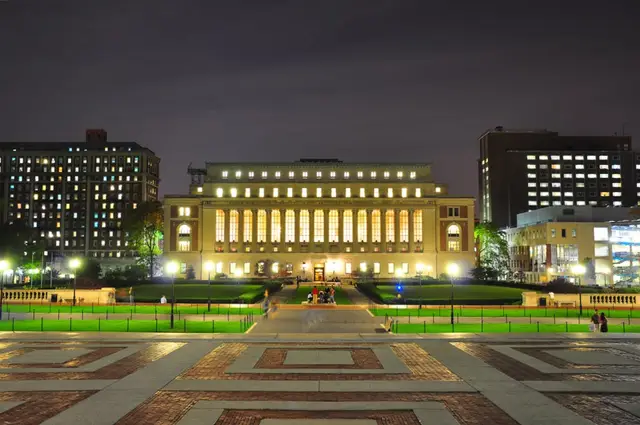
Andrew Chen (Achen33) / Wikimedia Commons/ "Columbia University's Butler Library at nighttime" / CC BY-SA 3.0
The Master of Science program in Biomedical Engineering at Columbia University offers a world-class education and research opportunities. It aims to prepare talented students from diverse backgrounds to become innovative leaders in engineering, science, and medicine. Graduates have secured top positions in the medical device industry, founded their own medical technology companies, and pursued advanced studies. The program combines the intellectual atmosphere of an Ivy League institution with the sense of community found in a small college, enriched by the diversity of New York City. Students can engage in off-campus internships and may receive academic credit for relevant experiences, subject to department approval.
Cornell University Architecture school acceptance rate
Cornell University's Architecture acceptance rate is 19.77%.

Kenneth C. Zirkel / Wikimedia Commons / "Milstein Hall" / CC BY-SA 4.0
Cornell University's graduate school of Architecture, established in 1871, is renowned worldwide for its excellence in architectural education. Located in Ithaca, New York, the school benefits from its picturesque setting amidst the natural beauty of the Finger Lakes region. Cornell's Architecture program holds a significant place in history as one of the oldest in the United States. It is known for its rigorous curriculum, emphasis on interdisciplinary collaboration, and innovative design research. Students are encouraged to push the boundaries of traditional architectural practice, explore innovative design solutions, and develop a strong design sensibility. The school consistently ranks among the top architecture programs globally, with notable alumni including Richard Meier, the Pritzker Prize-winning architect known for his modernist designs.
Cornell University Communications school acceptance rate
Cornell University's Communications acceptance rate is 8.40%.
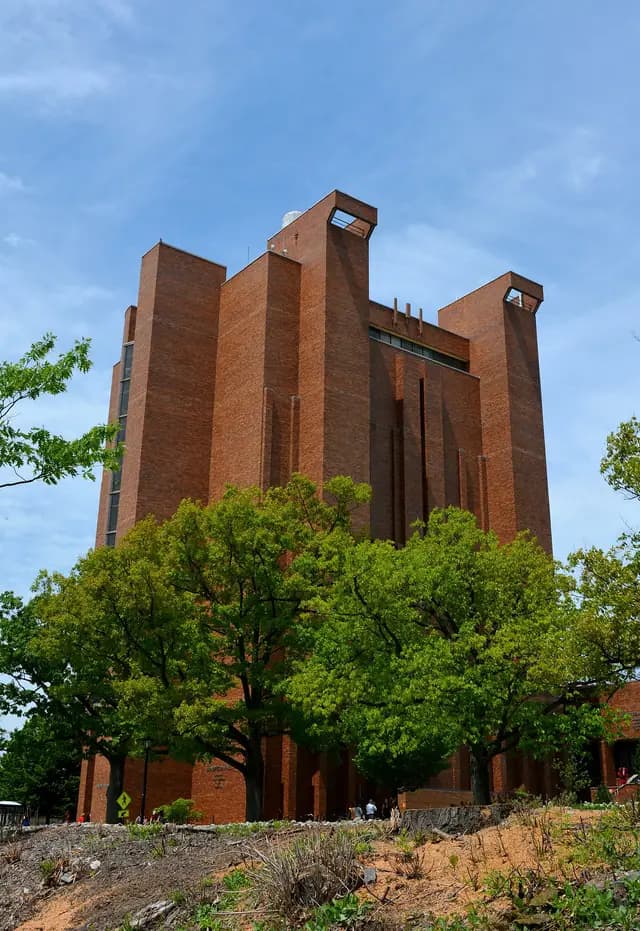
Ɱ / Wikimedia Commons / "Bradfield Hall" / CC BY-SA 4.0
Cornell University's Communication program offers a top-rated PhD program focused on training the next generation of scholars and leaders. With an emphasis on diverse and interdisciplinary approaches, students engage in cutting-edge research alongside renowned faculty members. The program fosters a vibrant community of innovators and encourages inclusivity, valuing diverse perspectives. Admitted students receive comprehensive financial support, including tuition coverage, health insurance, and a generous stipend. The program's three core tenets are scholarship, professionalization, and ethics, ensuring a well-rounded education. Graduates have gone on to secure faculty positions at prestigious institutions and pursue leading roles in industry research. Cornell's Communication program equips students with the skills and knowledge to make a significant impact in academia and society.
Cornell University Computer Science school acceptance rate
Cornell University's Computer Science acceptance rate is 19.23%.
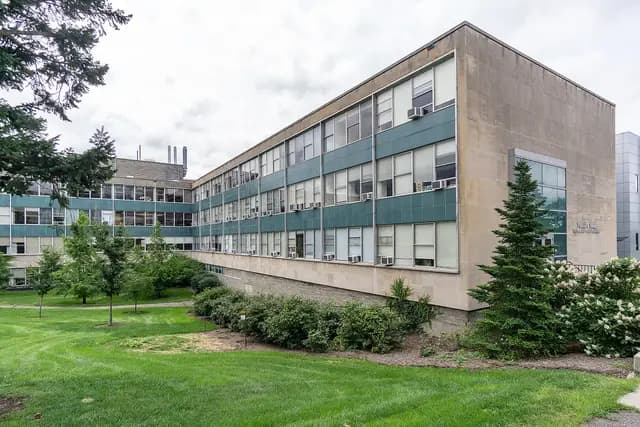
Kenneth C. Zirkel / Wikimedia Commons / "Phillips Hall" / CC BY-SA 4.0
The CS MS program is a highly selective and compact four-semester program designed for students aiming to enhance their understanding of computer science through advanced coursework, research, writing, and teaching. It caters to self-driven individuals with strong communication skills, a passion for research, and a desire to work with undergraduates in introductory courses. Successful applicants are chosen based on their exceptional performance as undergraduate teaching assistants (TAs) and their proven ability to conduct independent research. With an annual admission of 7-8 students, the program is quite exclusive, offering full tuition coverage and a stipend to its participants.
Cornell University Electrical Engineering school acceptance rate
Cornell University's Electrical Engineering acceptance rate is 27.91%.
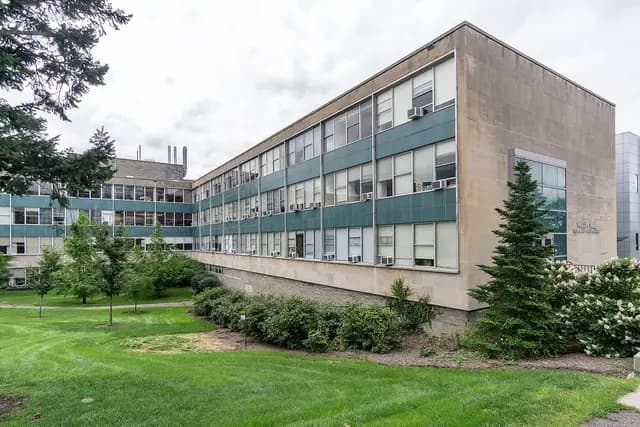
Kenneth C. Zirkel / Wikimedia Commons / "Phillips Hall" / CC BY-SA 4.0
The Cornell ECE Master of Engineering Degree (M.Eng.) provides comprehensive education in electrical and computer engineering. It is designed for students seeking advanced training in current technology and engineering design. The program is course-focused, emphasizing a design project and a written report rather than a research thesis. Students can tailor their programs to their individual interests and career goals. Cornell offers two M.Eng. programs: one at the Ithaca Campus with a broad focus and interdisciplinary research opportunities, and another at the Cornell Tech Campus in NYC with a digital technology and entrepreneurship focus. Students benefit from renowned faculty, develop leadership skills, and become part of a diverse and collaborative graduate community. The Cornell brand and alumni network offer long-term career advantages, including higher starting salaries compared to the national average.
Cornell University Mechanical Engineering school acceptance rate
Cornell University's Mechanical Engineering acceptance rate is 25.04%.
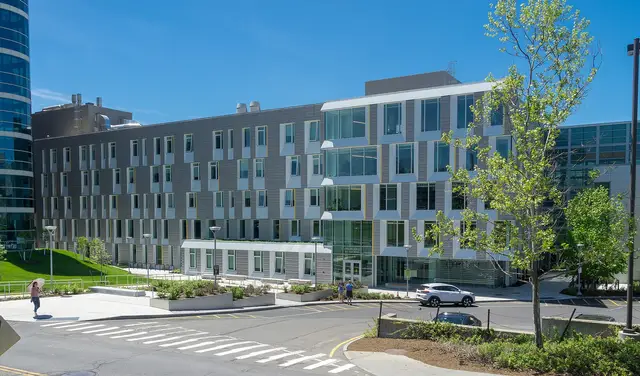
Kenneth C. Zirkel / Wikimedia Commons / "Upson Hall after 2017 renovation, Cornell University" / CC BY-SA 4.0
Cornell University's mechanical and aerospace engineering program offers students the chance to learn from renowned faculty and work on projects alongside them. The program provides exceptional facilities, including rapid prototyping labs and cutting-edge research labs, to support hands-on learning. With a vast alumni network of over 57,000 members on LinkedIn, students have access to valuable networking opportunities and career guidance. The MAE MEng program stands out for its flexible coursework, project-oriented approach, and industry connections, leading to job prospects and higher starting salaries. Emphasizing real-world experience and engineering skill enhancement, the program focuses on tackling global challenges through in-depth projects that mirror professional employment and foster collaborations with faculty and industry partners.
Cornell University Physics school acceptance rate
Cornell University's Physics acceptance rate is 18.91%.

Kenneth C. Zirkel / Wikimedia Commons / "Clark Hall of Science, Cornell University" / CC BY-SA 4.0
Cornell University's graduate physics program offers a multidisciplinary and congenial environment with superb facilities. It focuses on two key aspects: mastering advanced general physics to broaden employment options and conducting original research in a specific area. The program supports students through the Physics Graduate Society, providing social and professional activities. With over 40 active professors, research opportunities, and collaborative interactions, Cornell's mid-sized department cultivates a friendly atmosphere. Graduate students engage in sports, dancing classes, and musical ensembles together. The program also offers access to state-of-the-art research facilities, enabling students to gain practical skills in areas like particle accelerators, electron microscopy, and chip fabrication.
Cornell University Psychology school acceptance rate
Cornell University's Psychology acceptance rate is 5.24%.
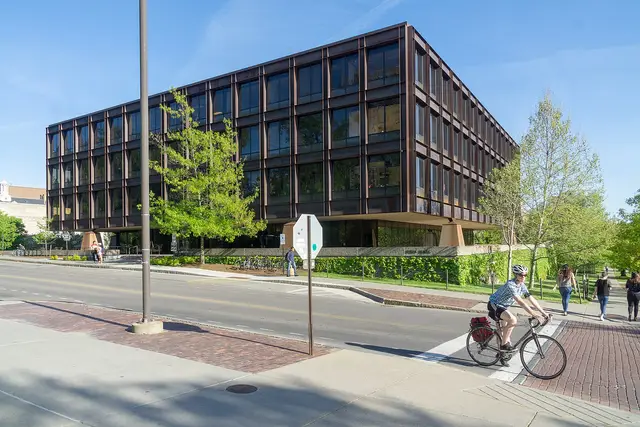
Kenneth C. Zirkel / Wikimedia Commons / "Uris Hall and cyclist" / CC BY-SA 4.0
The Graduate Field of Psychology at Cornell University consists of faculty members from different departments, including Psychology, Neurobiology and Behavior, Communication, and Philosophy. It offers M.A. and Ph.D. programs to train students as researchers, scholars, and teachers in psychology. Cornell's graduate study utilizes a field structure where faculty members with shared interests form fields, and students are admitted to specific fields of study. Within their chosen field, students can select major and minor subjects aligned with their research interests. The Graduate Field of Psychology is responsible for graduate training in psychology, independent of specific departments. Only faculty members belonging to the Graduate Field can serve on students' special committees, emphasizing their role in guiding and mentoring students. Student well-being is a priority for Cornell University's Graduate School, recognizing its importance for academic and life success.
CUNY Bernard M Baruch College Accounting school acceptance rate
CUNY Bernard M Baruch College's Accounting acceptance rate is 41.00%. The average GRE Verbal Reasoning score for CUNY Bernard M Baruch College Accounting is 155, and the Quantitative Reasoning score is 162.
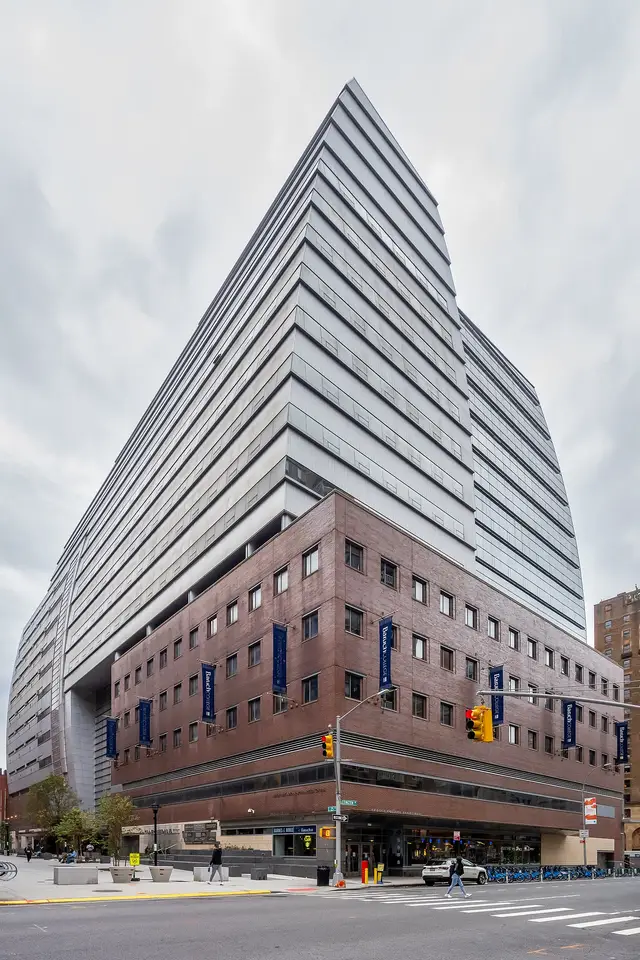
ajay_suresh / Wikimedia Commons / "Baruch College - Newman Vertical Campus (51709671813)" / CC BY 2.0
Zicklin College of Business offers several programs for students interested in pursuing a career in accounting and public accountancy. The Master of Science (MS) in Accountancy is the most popular program, catering to students who already have an undergraduate degree in accountancy or a related business field. Students in the MS program may have the opportunity to shorten their program length through course waivers based on their prior undergraduate coursework. The MBA in Accountancy is designed for students without an accounting or business undergraduate degree, providing them with a strong foundation in accounting theory and concepts alongside core business and management skills. The BBA/MS pathway is available exclusively to Baruch undergraduate students, allowing them to complete their master's degree in one year and meet the requirements for CPA licensure in New York State.
Duke University Medicine school acceptance rate
Duke University's Medicine acceptance rate is 1.44%.
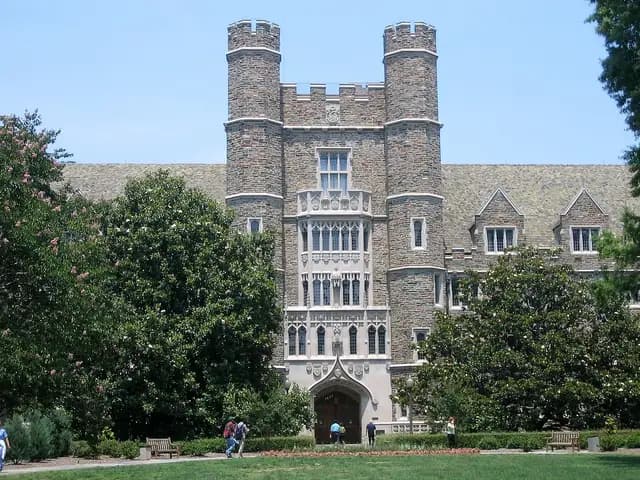
self / Wikimedia Commons / "Medical Center" / Public domain
The Duke University School of Medicine, established in 1930, is a prestigious institution known for its commitment to innovation and excellence. Located in Durham, North Carolina, the program benefits from its close proximity to the Duke University Medical Center, a leading medical facility renowned for its groundbreaking research and patient care. It is unique for offering Physician-Scientist Training Program that intends to support trainees as they transition from medical school graduation to full-time academic appointment. Duke School of Medicine consistently ranks among the top medical schools in the United States, with U.S. News & World Report placing it at #9 for research and #24 for primary care in their 2022 rankings. Notable awards include the school's National Institutes of Health (NIH) funding, with over $400 million awarded annually, and the Clinical and Translational Science Award (CTSA), which Duke has received since 2006. With a strong focus on research, exceptional student outcomes, and its commitment to serving the community, Duke University School of Medicine continues to make a lasting impact in healthcare and medical research.
Duke University (Pratt) Biomedical Engineering school acceptance rate
Duke University (Pratt)'s Biomedical Engineering acceptance rate is 14.80%. The average GRE Verbal Reasoning score for Duke University (Pratt) Biomedical Engineering is 158, and the Quantitative Reasoning score is 163.

self / Wikimedia Commons / "CIEMAS-complete2" / Public domain
The Duke Master of Science in Biomedical Engineering is a prestigious and highly-regarded graduate degree program, offering students a range of unique opportunities. With a flexible curriculum, students can choose their concentration and have the option of completing a thesis or non-thesis track. Additionally, the program provides access to graduate certificate programs in high-demand career areas. Dedicated career support is a priority, with the Duke Engineering Master's Career Services & Professional Development team offering individual and group coaching, online learning, workshops, and events. The program boasts a strong track record of positive career outcomes, with nearly 80% of recent graduates finding work or pursuing further education within six months of graduation. Extensive networking opportunities and employer recruitment events are facilitated through industry connections, a global network of Duke alumni, and collaboration with the Duke University Career Center.
Eastern Michigan University Interior Design school acceptance rate
Eastern Michigan University's Interior Design acceptance rate is 56.00%.
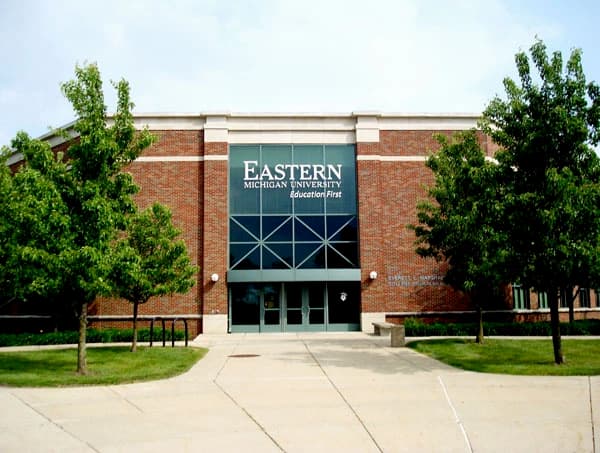
Pwojdacz / Wikimedia Commons / "Marshall EMU" / CC BY-SA 3.0
The Interior Design program at EMU focuses on design research, critical thinking, and creativity in the built environment. With the integration of virtual reality, students can envision the future of design today. The Masters of Science in Interior Design emphasizes sustainable and forward-thinking practices, ensuring graduates are competitive in the industry. The program offers an intensive, hands-on curriculum that blends theory, technical skills, and environmental responsibility. Exclusive industry partnerships provide real-world experience. The campus facilities have been rebuilt and reimagined, creating an innovative learning environment that sets the pace for cutting-edge design education. Graduates are prepared to thrive professionally in both commercial and residential sectors of the profession.
Florida State University Accounting school acceptance rate
Florida State University's Accounting acceptance rate is 32.00%.
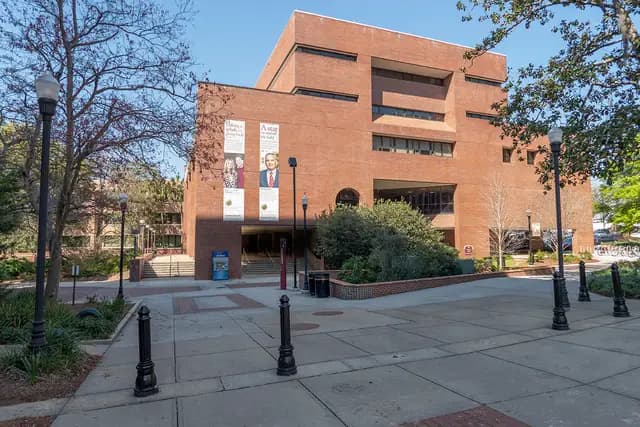
Mmh15f / Wikimedia Commons / "Rovetta Business Building A" / CC BY-SA 4.0
The Master of Accounting (MAcc) program at the Florida State University College of Business provides high-quality instruction for a comprehensive understanding of accounting functions. Students gain quantitative, analytical, and research skills to make informed business decisions and meet the educational requirements for becoming a Certified Public Accountant. The program offers majors in Assurance and Advisory Services, Generalist, and Taxation. Recognized as a STEM degree, it ensures employer demand and allows international students to extend their U.S. work stay. A Combined BS/MAcc Pathway accelerates coursework for top junior accounting students. The faculty excels in research and teaching, covering topics such as auditing, corporate governance, and financial reporting. Networking opportunities and scholarships support students throughout their journey.
Florida State University Interior Design school acceptance rate
Florida State University's Interior Design acceptance rate is 83.00%.
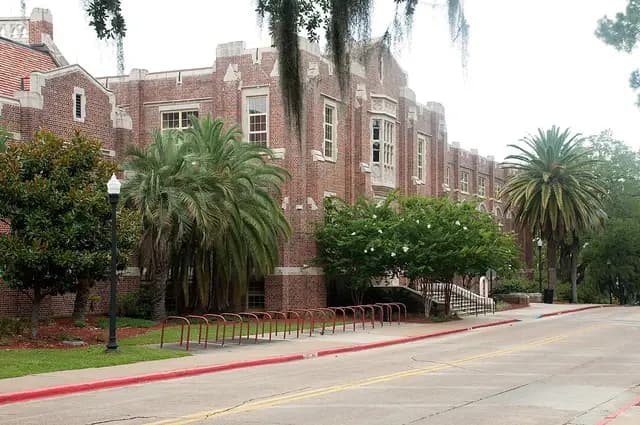
Patrick from Austin, TX / Wikimedia Commons / "Montgomery Hall FSU" / CC BY-SA 2.0
The Interior Architecture and Design Graduate Program at Florida State University nurtures successful alumni who excel in their careers. Graduates hold positions at renowned companies like Gensler, Daimler Chrysler, U.S. Library of Congress, Uber, HOK, and Corgan as project managers, design researchers, and administrators. Ranked sixth for being the most hired from and tenth as the most admired design school, the program emphasizes communication skills, design theory, interdisciplinary studies, sustainable design, and collaboration. Over 85% of graduate students secure employment or gain admission to graduate school within nine months. The department offers a supportive learning community, faculty guidance, and teaching opportunities through Graduate Assistant positions with tuition waivers and stipends.
George Washington University International Relations school acceptance rate
George Washington University's International Relations acceptance rate is 81.00%.
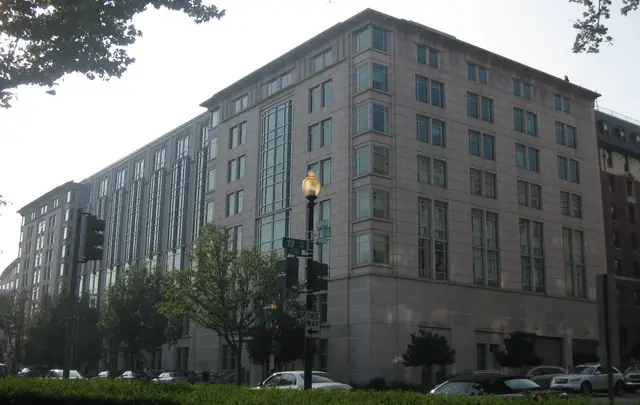
Pjn1990 / Wikimedia Commons / "Elliott School from Park" / CC BY 3.0
The George Washington University's Elliott School of International Affairs is a renowned institution offering exceptional graduate programs in international affairs. Located in Washington, DC, its prime position near key global organizations enriches the educational experience by providing unparalleled opportunities for engagement with the policy community. The Elliott School offers 12 distinctive Master of Arts programs, including global communication, international affairs, international development, international trade and investment policy, international science and technology policy, security policy, and regional programs focused on Asia, Europe and Eurasia, Latin America, and the Middle East. In addition, the school offers a master's degree for mid-career professionals and a dual-degree master's program in international studies in collaboration with 19 international partner universities. The Elliott School's graduate programs equip students with the knowledge and skills necessary to excel in the international arena, and its esteemed alumni hold leadership positions across various sectors worldwide.
Georgetown University International Relations school acceptance rate
Georgetown University's International Relations acceptance rate is 37.16%.
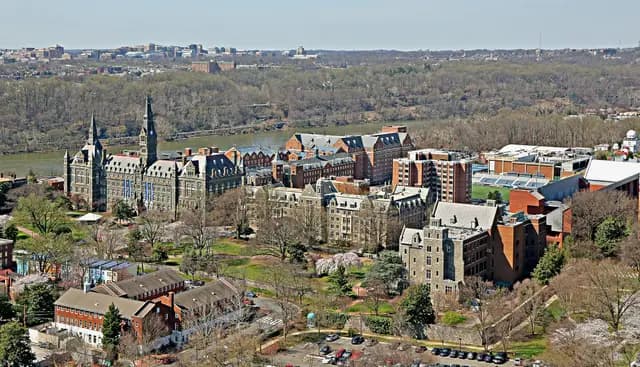
Duane Lempke / Wikimedia Commons / "GeorgetownUniv" / CC0
Georgetown University's Department of Government is a leading institution for doctoral studies in international relations. Their graduate program prepares students with cutting-edge research and professional training, while faculty members have produced award-winning work in prestigious journals and university presses. Graduates have secured faculty positions at top universities and prestigious fellowships at Harvard and Princeton. The department's core strengths include international security, political economy, law and organizations, and methodology. Collaborations with other departments and schools provide a diverse and comprehensive learning experience. The Georgetown University International Theory and Research Seminar (GUITARS) allows students to engage with global scholars and their research. The department's institutional resources support research and teaching in various areas of international affairs.
Georgia Institute of Technology Biomedical Engineering school acceptance rate
Georgia Institute of Technology's Biomedical Engineering acceptance rate is 31.00%.
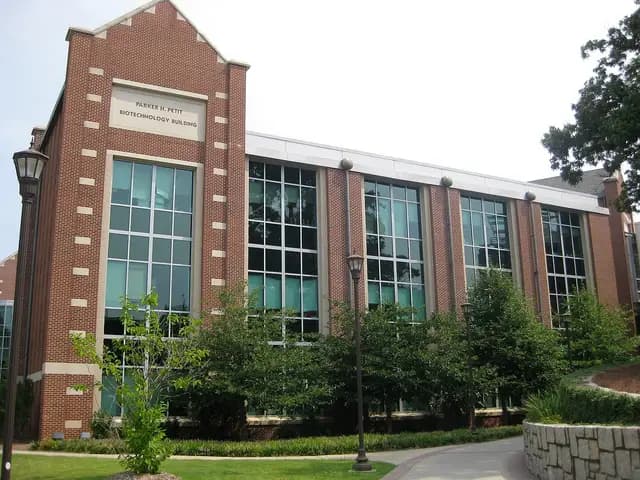
Jiuguang Wang / Wikimedia Commons / "Parker H. Petit Biotechnology Building" / CC BY-SA 3.0
The Wallace H. Coulter Department of Biomedical Engineering is a highly regarded program known for its excellence in research and collaboration. Students engage in cutting-edge projects within a team-driven culture, addressing unmet clinical challenges in well-equipped laboratories. The department offers advanced studies in various areas, including neuroengineering, biomedical imaging, immunoengineering, and more. Located in a vibrant city, Georgia Tech's College of Engineering provides the advantages of a major university and an urban campus, empowering students to pursue their ambitions. The college's engineering graduate programs consistently rank among the top ten in the nation, offering a comprehensive education that prepares students for successful careers in biomedical engineering.
Georgia Institute of Technology Chemical Engineering school acceptance rate
Georgia Institute of Technology's Chemical Engineering acceptance rate is 31.00%.

JJonahJackalope / Wikimedia Commons / "Ford Environmental Science and Technology Building" / CC BY-SA 4.0
The School of Chemical & Biomolecular Engineering at Georgia Tech offers graduate programs for MS and PhD degrees in chemical engineering. The MS degree can be earned through coursework, while both programs provide flexible course selection and individualized study plans. Research opportunities cover a wide range of areas, including catalysis, microfluidics, sustainable development, and bioinformatics. The school also collaborates with other departments to offer degrees in Bioengineering. With esteemed faculty and cutting-edge laboratories, the school focuses on groundbreaking research for disease therapeutics, environmental sustainability, and technological advancements. Georgia Tech's College of Engineering consistently ranks among the top, providing a comprehensive education integrating diverse disciplines and hands-on research.
Georgia Institute of Technology Civil Engineering school acceptance rate
Georgia Institute of Technology's Civil Engineering acceptance rate is 29.70%.
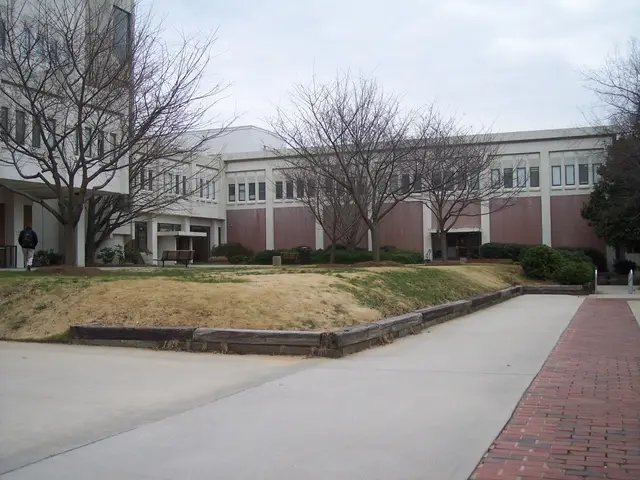
Joseph Zollo from Marietta, GA, United States of America / Wikimedia Commons / "Georgia Tech Mason Building" / CC BY 2.0
The School of Civil & Environmental Engineering at Georgia Tech provides a challenging graduate program leading to a Master of Science in Civil Engineering. Georgia Tech's MS Degree in Civil Engineering is well-regarded globally, attracting international students for its high employability rate. The university offers excellent education quality, hands-on learning, and ample work opportunities. Graduates of this program will be equipped to conduct extensive research in the field. Georgia Tech's interactive curriculum, research opportunities, and experienced faculty provide a transformative learning experience. Specializations in this program include Construction and Infrastructure Systems Engineering, Environmental Engineering, Geosystems Engineering, Structural Engineering, Mechanics, and Materials, Transportation Systems Engineering, and Water Resources Engineering.
Georgia Institute of Technology Computer Science school acceptance rate
Georgia Institute of Technology's Computer Science acceptance rate is 36.60%.
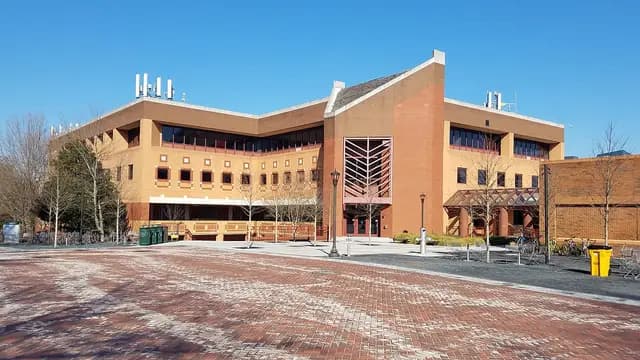
JJonahJackalope / Wikimedia Commons / "College of Computing Building" / CC BY-SA 4.0
The Master of Science in Computer Science (M.S. CS) program is a competitive and rigorous terminal degree program aimed at preparing students for successful careers in the industry. Admission to the program is highly selective due to the abundance of qualified applicants and limited spots available. The College of Computing carefully evaluates various aspects, including the statement of purpose, letters of recommendation, test scores, and GPA, to identify the most deserving candidates. Additionally, the College offers a unique opportunity for graduate students to study abroad and obtain two Masters degrees, one from Georgia Tech and another from a partner European university, through the Georgia Tech-Europe program. This exceptional initiative allows students to gain two esteemed qualifications.
Georgia Institute of Technology Electrical Engineering school acceptance rate
Georgia Institute of Technology's Electrical Engineering acceptance rate is 21.00%.

JJonahJackalope / Wikimedia Commons / "Van Leer Building" / CC BY-SA 4.0
The Georgia Institute of Technology's College of Engineering has achieved a top-five ranking in the US News & World Report national rankings for graduate programs. This recognition reflects the College's commitment to providing a high-quality education to a diverse range of students, preparing them for a rapidly changing world and workplace. The College offers a wide range of courses, allowing students to enter various industries such as energy, robotics, manufacturing, defense, and computing. Students also gain hands-on experience in research centers and labs, equipping them to compete in the global and high-tech marketplace. The master's degree program offers specializations in areas like bioengineering, computer systems, and telecommunications. Additionally, the College offers a joint BS/MS degree program, providing undergraduate students with the opportunity to expand their studies and improve their career prospects.
Georgia Institute of Technology Engineering school acceptance rate
Georgia Institute of Technology's Engineering acceptance rate is 29.70%. The average GRE Verbal Reasoning score for Georgia Institute of Technology Engineering is 157, and the Quantitative Reasoning score is 166.
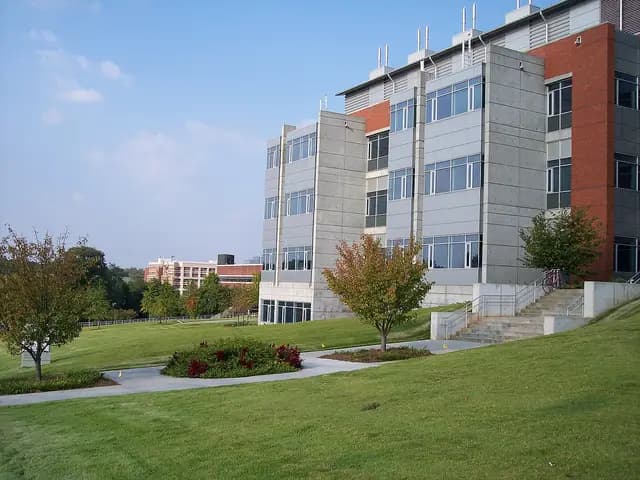
Joseph Zollo from Marietta, GA, United States of America / Wikimedia Commons / "J Erskine Love Jr Manufacturing Building" / CC BY 2.0
Located in Atlanta, Georgia, the College at Georgia Tech is renowned for its diverse range of degree programs and its urban campus environment. With a strong reputation both in the United States and abroad, the College equips its students with the necessary skills and knowledge to excel in the engineering field. Emphasizing innovation and entrepreneurship, the College fosters leadership qualities, allowing students to develop solutions to global challenges and pursue careers in various industries. Georgia Tech's commitment to global education is evident through its numerous study abroad opportunities and international internships, providing students with valuable experiences and language skills.
Georgia Institute of Technology Mechanical Engineering school acceptance rate
Georgia Institute of Technology's Mechanical Engineering acceptance rate is 31%.
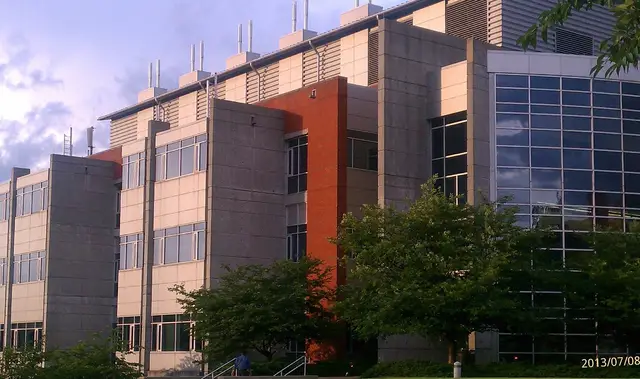
Mistercontributer / Wikimedia Commons / "J. Erskine Love Jr. Mfg Building (adjusted)" / CC BY-SA 3.0
The mechanical engineering program at Georgia Tech is renowned for its size and reputation, making it one of the most prestigious programs in the United States. It distinguishes itself by offering a combination of theoretical knowledge and practical design experiences, providing students with a well-rounded education. The program's history is noteworthy, with the establishment of the master's degree in 1922 and the doctoral program in 1946. Notably, the program has made significant strides in diversity, with the first Ph.D. awarded to a minority student in 1984 and the first Ph.D. awarded to a woman in 1987. Georgia Tech's mechanical engineering program consistently ranks among the top five nationally, emphasizing a curriculum that blends engineering fundamentals with hands-on design opportunities.
Harvard University Architecture school acceptance rate
Harvard University's Architecture acceptance rate is 8.00%.
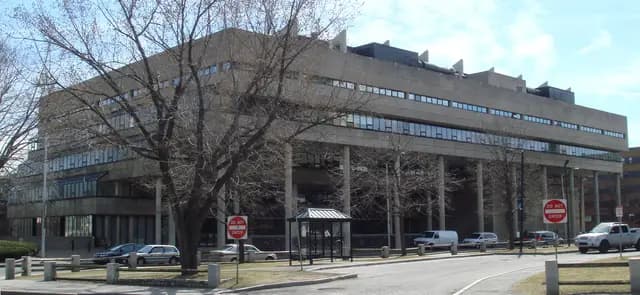
Bobak Ha'Eri / Wikimedia Commons / "03-28-07-Harvard-GSD" / CC BY 3.0
Harvard University Graduate School of Architecture, established in 1936, is renowned worldwide for its excellence in architectural education with a faculty composed of renowned thought leaders. The school's commitment to preserving architectural heritage and promoting adaptive reuse is noteworthy, advocating for historically significant structures and sustainable approaches. It publishes influential research shaping architectural discourse and theory. With collaborations and projects globally, students and faculty engage in international initiatives, addressing urbanization, climate change, and social inequality. The school counts Michael Graves, a world renowned Architect, among its distinguished alumni.
Harvard University Business school acceptance rate
Harvard University's Business acceptance rate is 12.28%. The average GRE Verbal Reasoning score for Harvard University Business is 147-170, and the Quantitative Reasoning score is 150-170. The average GMAT score for Harvard University Business is 730.

Marco Carrasco / Wikimedia Commons / "Harvard University" / CC BY-SA 4.0
Harvard University's Harvard Business School (HBS) stands as an iconic and prestigious institution renowned for its unparalleled business education. Established in 1908, HBS has consistently been a global leader in shaping business practices and cultivating influential leaders. With an incredibly selective admission rate of around 11%, HBS attracts top-tier talent from around the world. The school's case method, pioneered by HBS, immerses students in real-world scenarios, fostering critical thinking and decision-making skills. HBS boasts an accomplished faculty composed of leading scholars, practitioners, and Nobel laureates, ensuring a world-class learning experience. The school's vast alumni network spans over 80 countries and includes prominent figures across industries. HBS graduates have demonstrated outstanding career outcomes, with 95% securing employment within three months of graduation. By nurturing an environment of intellectual curiosity, collaboration, and ethical leadership, HBS empowers its students to make a lasting impact on the global business landscape.
Harvard University Chemistry school acceptance rate
Harvard University's Chemistry acceptance rate is 24.00%.
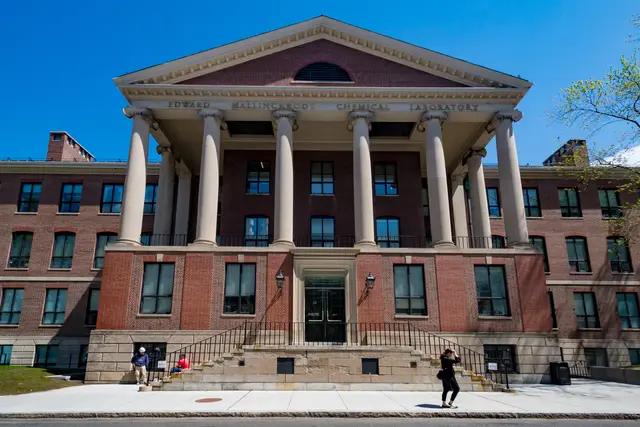
xiquinhosilva / Wikimedia Commons / "Mallinckrodt Laboratory, Harvard" / CC BY 2.0
The Chemistry and Chemical Biology program at Harvard University is part of the Harvard Integrated Life Sciences initiative, fostering collaboration and interdisciplinary research. Students gain expertise in chemical inquiry and molecular-level investigation. The program features a distinguished faculty, including Nobel Prize and Welch Award laureates. Students have access to cutting-edge instrumentation and collaborations with institutions like the Broad Institute and the Howard Hughes Medical Institute. Research projects range from gene editing to advanced imaging systems. Graduates secure faculty positions at prestigious institutions or pursue successful careers with pharmaceutical companies such as Pfizer and GlaxoSmithKline. The program provides a strong foundation for thriving in the chemical and life sciences.
Harvard University Economics school acceptance rate
Harvard University's Economics acceptance rate is 4.00%.
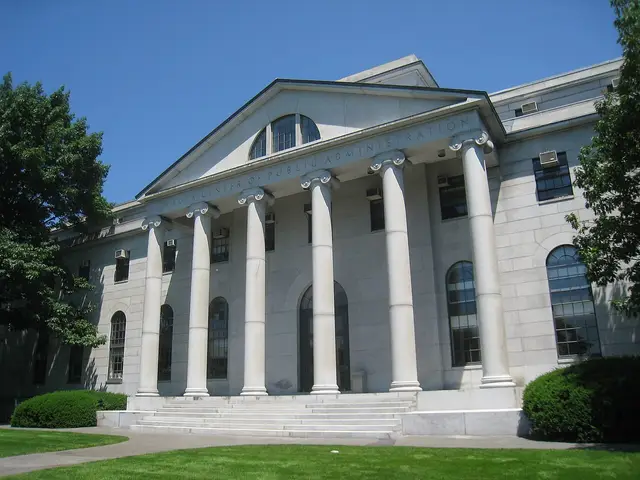
Daderot / Wikimedia Commons / "Littauer Center of Public Administration, Harvard University - IMG 9016-1" / Public domain
The Harvard Department of Economics is renowned for its commitment to addressing global challenges through scholarly research. The department offers a unique program that encompasses various fields, ranging from finance to political economy, ensuring a comprehensive understanding of economics. Students benefit from seminars conducted by renowned scholars from around the world and gain access to an extensive collection of over 13 million books and pamphlets across 90 separate library units. The department encourages diverse research, including investigations into bond price dynamics and the impact of temporary upstream steel tariffs. Graduates have achieved prestigious academic positions and secured careers at esteemed organizations like the International Monetary Fund, Vanguard, and Amazon.
Harvard University Education school acceptance rate
Harvard University's Education acceptance rate is 39.40%. The average GRE Verbal Reasoning score for Harvard University Education is 160, and the Quantitative Reasoning score is 158.
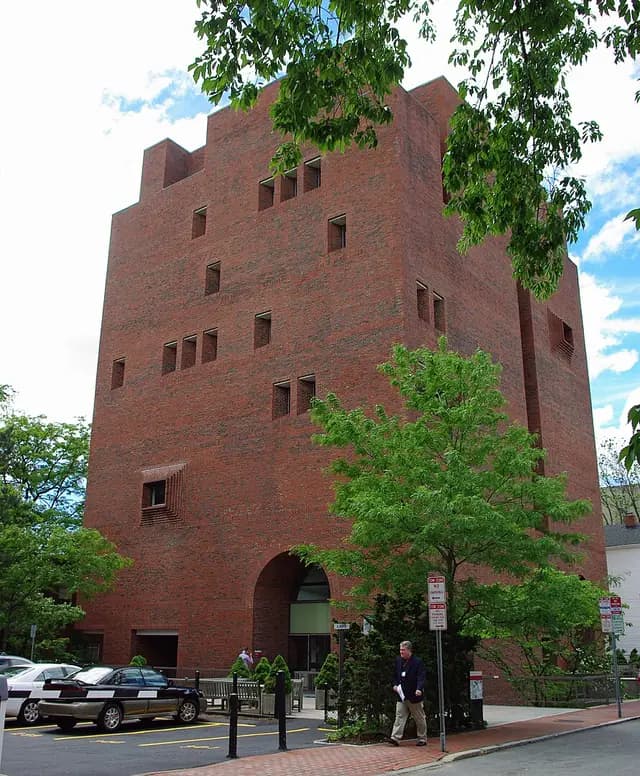
Bostonian13 / Wikimedia Commons / "Larsen Hall" / CC BY-SA 3.0
The Harvard University Graduate School of Education (HGSE), established in 1920, is renowned for its excellence in shaping the field of education. Situated in Cambridge, Massachusetts, it benefits from being part of the prestigious Harvard University campus, allowing for interdisciplinary collaborations and access to world-class resources. HGSE holds a significant place in history as the first school to grant doctoral degrees in education. Its commitment to student success is reflected in its impressive outcomes, with graduates assuming leadership roles in education globally. The school consistently ranks among the top graduate schools of education and has garnered numerous awards for its innovative research and impactful programs. Notably, HGSE is recognized for its focus on social justice, diversity, and equity in education, making it a trailblazer in these areas. With a vibrant and supportive community, cutting-edge research opportunities, and a rich legacy of educational transformation, HGSE stands out as a truly exceptional institution.
Harvard University International Relations school acceptance rate
Harvard University's International Relations acceptance rate is 4.00%.
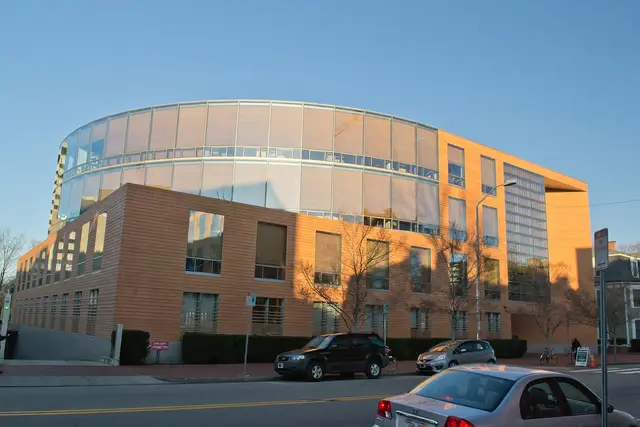
Josh Graciano / Wikimedia Commons / "CGIS Knafel" / CC BY-SA 2.0
A master's degree in international relations at Harvard provides numerous career opportunities, ranging from diplomacy and journalism to international business and conflict resolution. It equips individuals with a comprehensive understanding of global issues, multicultural competence, and the ability to navigate changing circumstances. The program offers a customizable curriculum with stackable certificates and experiential learning. Taught by expert instructors, including faculty from Harvard University, students receive personalized academic and career advising. Graduates have the option to pursue a thesis or applied research project with paid research opportunities. The program attracts professionals from various industries, and graduates find employment in fields such as international affairs, law, and environmental services. Additionally, graduates become part of the prestigious Harvard Alumni Association and receive support from the Mignone Center for Career Success.
Harvard University Law school acceptance rate
Harvard University's Law acceptance rate is 6.90%. The average GRE Verbal Reasoning score for Harvard University Law is 167, and the Quantitative Reasoning score is 165.
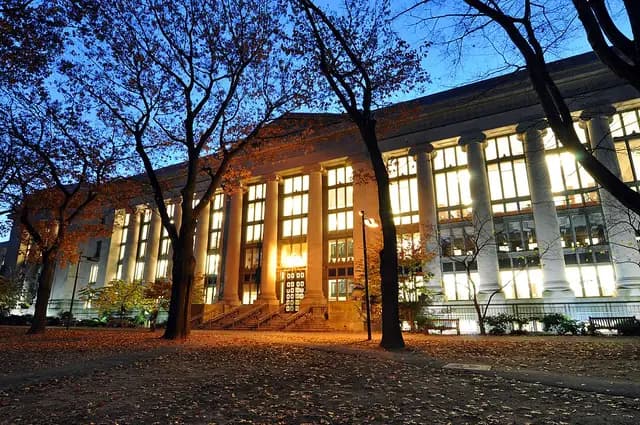
Chensiyuan / Wikimedia Commons / "Harvard Law School Library in Langdell Hall at night" / CC BY-SA 4.0
Harvard Law School, established in 1817, stands as one of the oldest and most prestigious law schools in the United States, and is home to the largest academic law library in the world. Notably, the school has produced numerous influential legal minds, including former President Barack Obama. The school's legal clinics offer students invaluable hands-on experience, allowing them to apply their knowledge and skills to real-world legal issues. Additionally, Harvard Law School's strong emphasis on public service and social justice has cultivated a culture of activism and advocacy among its students and alumni.
Harvard University Math school acceptance rate
Harvard University's Math acceptance rate is 13.00%.

Gunnar Klack / Wikimedia Commons / "Harvard Science Center Josep Lluis Sert Apr 2014" / CC BY-SA 4.0
The Math PhD program at Harvard University is tailored for students aspiring to become research mathematicians and engage in original mathematical research. Its campus location, Cambridge, Massachusetts, is renowned as a vibrant hub of mathematics, hosting esteemed institutions such as MIT, Boston University, and Brandeis University. Participants will have access to abundant resources, including the Center of Mathematical Sciences and Applications, which facilitates interdisciplinary collaboration through conferences, seminars, and workshops. Graduates have excelled in securing postdoctoral fellowships in academia, with some earning prestigious fellowships like the Clay Fellowship, Simons Fellowship, and NSF Graduate Research Fellowship. Others have pursued careers in industry. Inclusivity and welcoming practices are prioritized through embracing inclusive pedagogy and affinity groups that provide a supportive environment for individuals with shared identities to connect, educate, process, heal, and work together.
Harvard University Medicine school acceptance rate
Harvard University's Medicine acceptance rate is 3.30%.

SBAmin / Wikimedia Commons / "Harvard Medical School HDR" / CC BY-SA 3.0
The Harvard University School of Medicine, founded in 1782, stands as a renowned institution that has left an indelible mark on medical education and research. Located in Boston, Massachusetts, the school enjoys a distinct advantage with its close proximity to world-class hospitals and research institutions, facilitating extensive collaborations and enriching learning opportunities. The program's emphasis on rigorous academic training combined with hands-on clinical experience produces graduates who excel as compassionate clinicians, pioneering researchers, and visionary leaders in healthcare. Harvard Medical School has consistently been recognized for its excellence, earning top rankings and numerous awards. It is consistently ranked among the best medical schools globally, and its faculty and alumni have received prestigious accolades, including Nobel Prizes and other distinguished honors. Harvard University School of Medicine continues to shape the future of medicine through its dedication to innovation, groundbreaking discoveries, and exceptional student outcomes.
Harvard University Physics school acceptance rate
Harvard University's Physics acceptance rate is 7%.
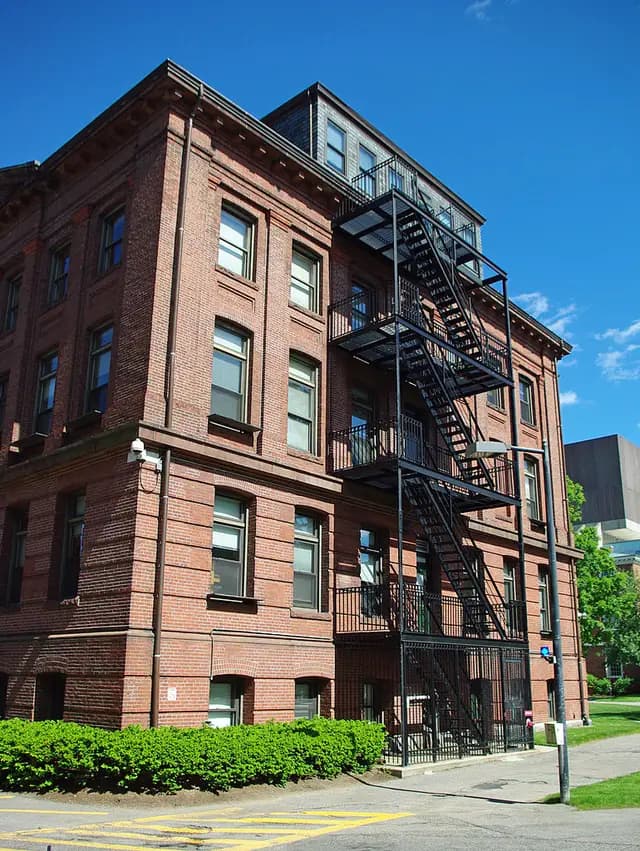
Bostonian13 / Wikimedia Commons / "Jefferson Laboratory 2" / CC BY-SA 3.0
The Harvard Department of Physics offers students a wide range of educational and research opportunities with renowned faculty in state-of-the-art facilities. They explore fundamental physics problems at different scales, covering areas like atomic physics, astrophysics, biophysics, and more. Students contribute to exciting discoveries, such as the Higgs boson, quantum computing, and studying black holes. The department fosters inclusivity and attracts students from diverse backgrounds. They provide comprehensive advising, counseling, and career events. On-site resources include labs and fabrication shops. Interdisciplinary collaborations involve fields like ultracold atoms, quantum materials, and quantitative biology. Simultaneous applications to other departments are encouraged, promoting interdisciplinary research.
Harvard University Psychology school acceptance rate
Harvard University's Psychology acceptance rate is 10.00%.
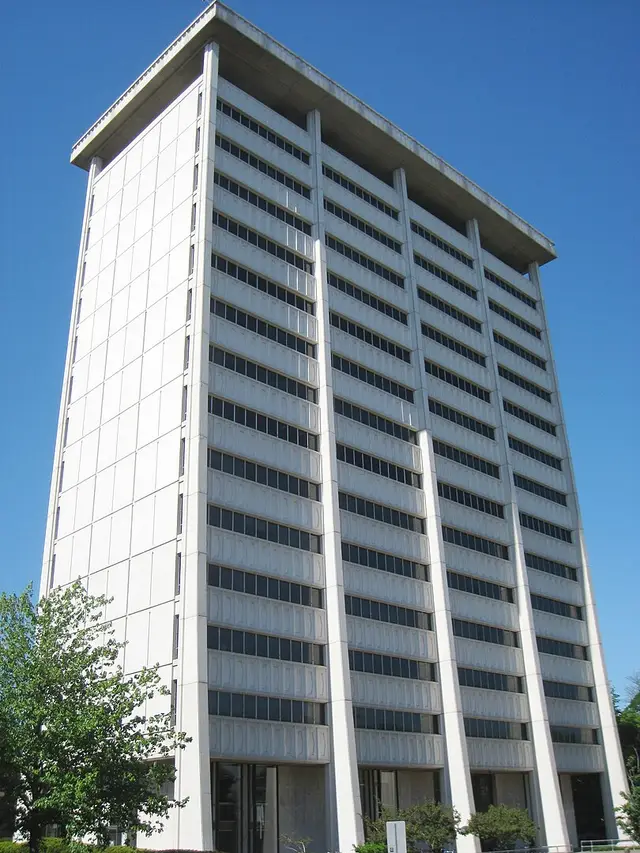
Daderot / Wikimedia Commons / "William James Hall, Harvard University" / Public domain
Harvard's Psychology department is renowned for its interdisciplinary approach and focus on the science of mental life. Dating back to the late 1800s with William James, the department has a rich history and has been at the forefront of the field. Notable figures like B.F. Skinner, Gordon Allport, and George Miller have contributed to its legacy. Presently, the department boasts 27 faculty members and was ranked #1 for Faculty Scholarly Productivity in a 2007 survey. The Graduate Program in Psychology trains 74 graduate students across four major research programs: Cognition, Brain, & Behavior; Developmental Psychology; Social Psychology; and Clinical Science.
Johns Hopkins University Communications school acceptance rate
Johns Hopkins University's Communications acceptance rate is 59.00%.
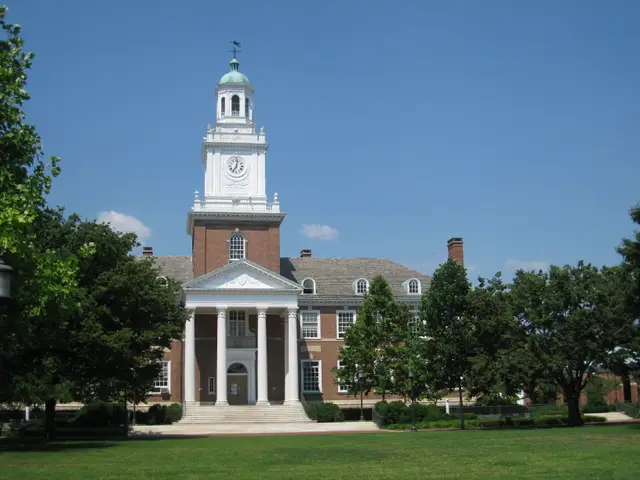
Daderot / Wikimedia Commons / "Gilman Hall, Johns Hopkins University, Baltimore, Maryland, USA." / Public domain
The Master of Arts in Communication program offers a unique and career-focused approach for professionals looking to advance or transition in the communication field. It attracts a diverse student body and boasts successful alumni holding leadership positions in various organizations. Students and graduates have access to an exclusive job opportunities network, enhancing their career prospects. The program allows for a personalized curriculum through official Areas of Concentration, catering to individual interests and goals. Learning from industry leaders and experienced faculty members adds practical knowledge to the classroom. Overall, this program stands out due to its career-oriented nature, diverse community, alumni success, personalized curriculum options, and industry connections.
Johns Hopkins University International Relations school acceptance rate
Johns Hopkins University's International Relations acceptance rate is 89.00%.
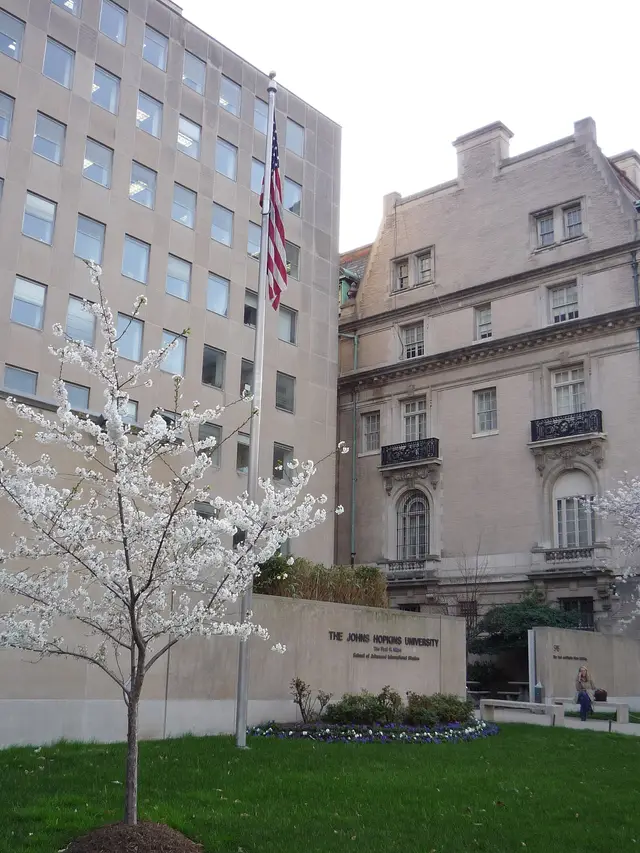
Worawutc / Wikimedia Commons / "Nitze Building at The Johns Hopkins University Paul H. Nitze School of Advanced International Studies Washington, DC" / Public domain
Johns Hopkins SAIS offers a Master of Arts in International Relations degree program that prepares students to understand the interconnectedness of economics, geopolitics, security, and the environment. The program features a flexible curriculum with core areas of study such as leadership, decision-making, data analytics, economics, geopolitics, and research methods. Students can then customize their learning experience by selecting courses in functional areas like development, climate, and sustainability, or regional areas such as Africa or Asia. The program also includes capstone projects, internships, language training, and professional skills training to equip students with the necessary knowledge and skills to tackle global challenges.
Johns Hopkins University Medicine school acceptance rate
Johns Hopkins University's Medicine acceptance rate is 2.59%.
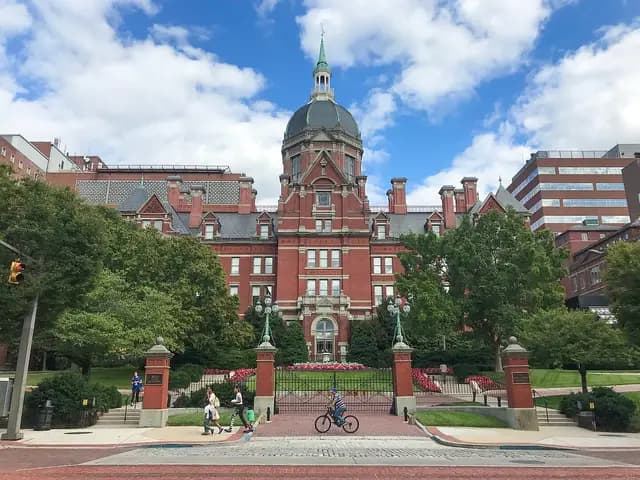
Baltimore Heritage from Baltimore, MD, USA / Wikimedia Commons / "Billings Hospital Administration Building (1889), Johns Hopkins Hospital" / CC0
Established in 1893, the Johns Hopkins University School of Medicine holds a distinguished reputation in medical education. Located in Baltimore, Maryland, the school benefits from its affiliation with the renowned Johns Hopkins Hospital, providing students with unparalleled clinical opportunities. The program's unique "genius grant" system offers merit-based scholarships to all students, ensuring financial support and fostering a diverse and talented student body. Notably, Johns Hopkins School of Medicine consistently ranks among the top medical schools in the United States, securing the #2 spot in U.S. News & World Report's Best Medical Schools for Research in 2022. The school has produced numerous Nobel laureates and boasts a strong student outcome, with over 90% of graduates matching into one of their top three residency choices.
Johns Hopkins University (Whiting) Biomedical Engineering school acceptance rate
Johns Hopkins University (Whiting)'s Biomedical Engineering acceptance rate is 67.76%.
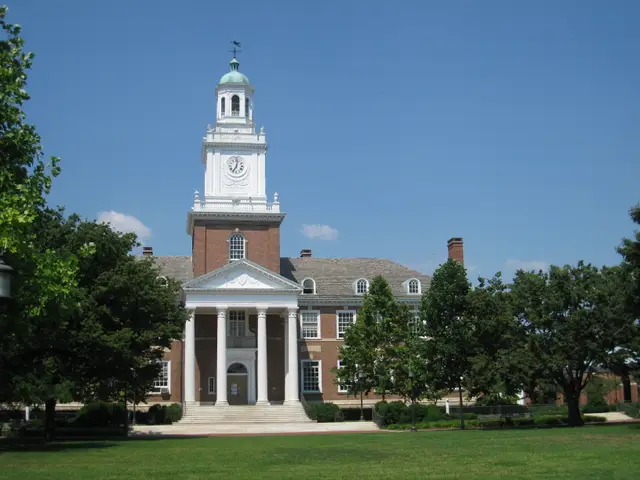
Daderot / Wikimedia Commons / "Gilman Hall, Johns Hopkins University, Baltimore, Maryland, USA." / Public domain
Johns Hopkins University's biomedical engineering graduate programs have consistently been ranked as the best in the nation. By combining resources from the Whiting School of Engineering and the School of Medicine, students have access to world-class clinical scientists. The curriculum emphasizes practical experience, allowing students to solve real-world healthcare and engineering challenges through project-based learning. With the option to specialize in one of six modern BME disciplines, students work closely with faculty and clinical collaborators to contribute to scientific discovery, innovation, and translational research. The master's program offers opportunities for research and prepares students for careers in various fields, including research, industry, consulting, and government. Additionally, medical students and trainees can pursue a specialized focus area in AI in Medicine without requiring GRE scores.
Massachusetts Institute of Technology Architecture school acceptance rate
Massachusetts Institute of Technology's Architecture acceptance rate is 12.00%.
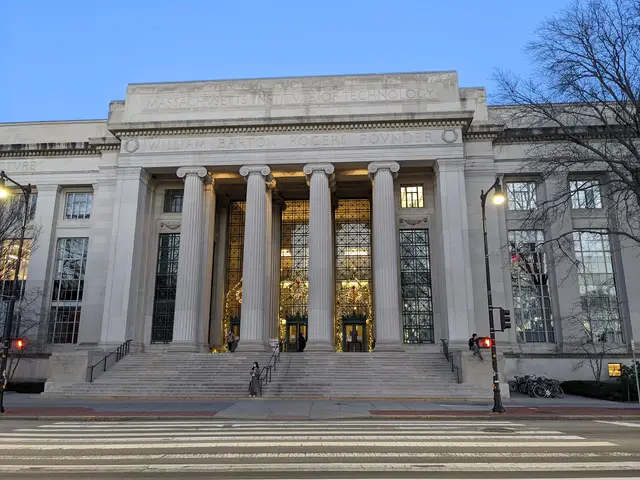
Sintakso / Wikimedia Commons / "MIT Rogers Building 02" / CC BY-SA 4.0
The Massachusetts Institute of Technology (MIT) graduate school of Architecture is renowned worldwide for its cutting-edge research and innovative design approach. It has pioneered digital design and fabrication techniques, revolutionizing how architects conceive and construct buildings. MIT's emphasis on sustainable design and environmental innovation has led to the development of eco-friendly materials and strategies. The school's research in urban design and planning has influenced city planning globally. MIT promotes interdisciplinary collaboration, resulting in groundbreaking projects that push the boundaries of architectural practice. Its culture of design thinking and innovation fosters a spirit of creativity and problem-solving. Overall, MIT's architecture program has had a profound impact on technology, sustainability, urban design, and design thinking in the field of architecture.
Massachusetts Institute of Technology Biomedical Engineering school acceptance rate
Massachusetts Institute of Technology's Biomedical Engineering acceptance rate is 8.00%.
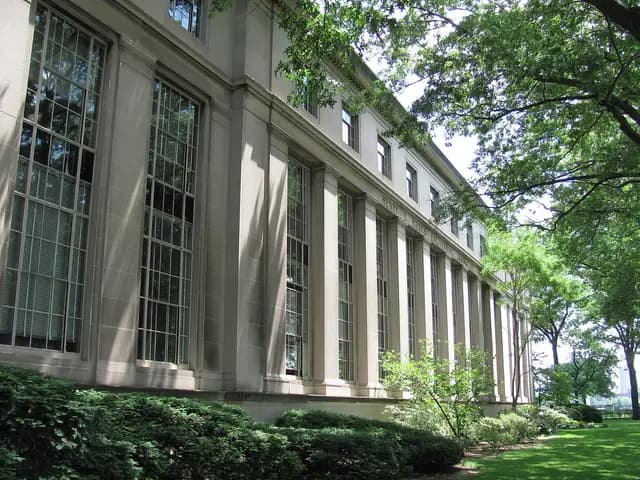
John Phelan / Wikimedia Commons / "MIT Building 1, Pierce Engineering Laboratory, Cambridge MA" / CC BY 3.0
The Master of Engineering in Biomedical Engineering (MEBE) program at MIT is a five-year program that awards a bachelor's degree in a science or engineering field as well as a Master of Engineering in Biomedical Engineering. This program is exclusively available to MIT undergraduate students who have demonstrated strong quantitative and engineering skills through their undergraduate coursework. Graduate students in the Department of Biological Engineering have the opportunity to conduct research in various interdisciplinary research centers at MIT, such as the Center for Biomedical Engineering, the Center for Environmental Health Sciences, and the Synthetic Biology Engineering Research Center. Collaboration opportunities exist with faculty from MIT's Schools of Engineering and Science, as well as prestigious institutions like Harvard University School of Medicine and Boston University School of Medicine. The program's focus lies in integrating engineering principles with modern molecular-to-genomic biology, mirroring the approach taken in their SB and PhD degree programs.
Massachusetts Institute of Technology Chemical Engineering school acceptance rate
Massachusetts Institute of Technology's Chemical Engineering acceptance rate is 12.38%.

John Phelan / Wikimedia Commons / "MIT Building 1, Pierce Engineering Laboratory, Cambridge MA" / CC BY 3.0
MIT's chemical engineering department boasts 40 expert professors specializing in energy, sustainability, materials, polymers, biotechnology, and manufacturing. Well-funded research projects provide graduate students with invaluable immersion opportunities. MIT chemical engineering offers ample time and financial support, whether students aim for academia, industry, or entrepreneurship. Graduate study at MIT allows for leading-edge research and collaboration with distinguished faculty members. The department provides extensive resources, and the location in Greater Boston adds to the intellectual and cultural richness. MIT Chemical Engineering offers three graduate programs: PhD/ScD Degree, PhDCEP Degree (with industrial experience and leadership training), and MSCEP Degree (hands-on experience in industrial settings). These programs equip students for successful careers in their chosen fields.
Massachusetts Institute of Technology Chemistry school acceptance rate
Massachusetts Institute of Technology's Chemistry acceptance rate is 18.00%.
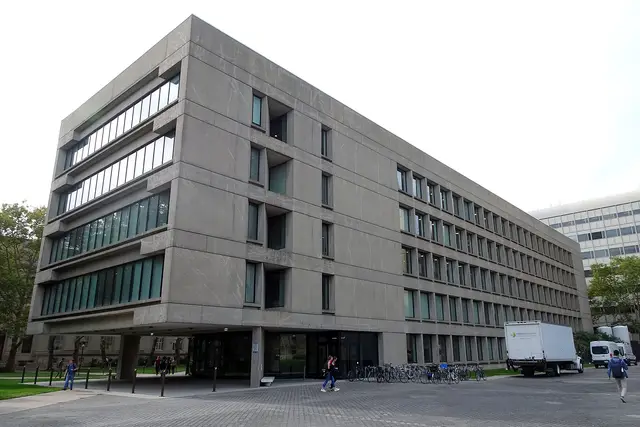
Alacoolwiki / Wikimedia Commons / "MIT Building 18 (Dreyfus Building)" / CC BY-SA 4.0
The MIT Department of Chemistry graduate program is renowned for its excellence in education and research, fostering an inclusive and innovative community. With a rich history of pioneering advancements in chemical research, the department integrates these achievements into its educational mission. Chemistry serves as a foundational science, contributing to diverse areas such as sustainable energy, biomedical research, environmental improvement, and material development. Collaborations with interdisciplinary laboratories and programs offer students opportunities to engage in cross-disciplinary research. Moreover, the department prioritizes the well-being of its graduate students through activities promoting work-life balance, including intramural athletics, yoga classes, and social events.
Massachusetts Institute of Technology Civil Engineering school acceptance rate
Massachusetts Institute of Technology's Civil Engineering acceptance rate is 20.00%.

Beyond My Ken / Wikimedia Commons / "2017 Maclaurin Buildings (MIT Building 10) and Great Dome" / CC BY-SA 4.0
MIT's Department of Civil and Environmental Engineering (CEE) is praised by former students and professionals for its commitment to addressing global challenges like climate change and inequality. The department focuses on educating engineering leaders who can tackle these issues and create a better world. CEE fosters a close-knit community, where faculty members genuinely get to know students and encourage collaboration. The curriculum emphasizes multidisciplinary approaches, integrating biology, chemistry, physics, and social science to address public health and sustainability. The graduate programs at CEE offer advanced degrees in various areas, providing limitless possibilities for students to make a lasting impact through research and innovation. The department's commitment to hands-on learning and theory embodies the ethos of MIT.
Massachusetts Institute of Technology Computer Science school acceptance rate
Massachusetts Institute of Technology's Computer Science acceptance rate is 10%.
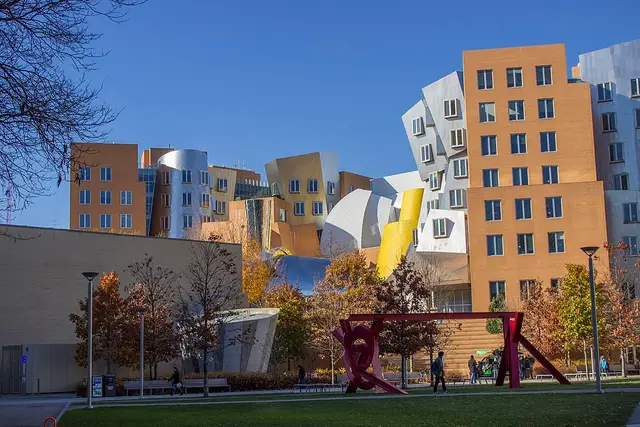
Lucy Li / Wikimedia Commons / "Ray and Maria Stata Center (MIT)" / CC BY-SA 3.0
The Department of Electrical Engineering and Computer Science (EECS) at MIT prepares students for leadership roles in academia, industry, government, and research. Its renowned faculty have made pioneering contributions to computer science, transforming the world and shaping the future. Research areas include AI for Healthcare, Artificial Intelligence and Machine Learning, Communications Systems, Computational Fabrication and Manufacturing, Computer Architecture, Educational Technology, Graphics and Vision, Human-Computer Interaction, Programming Languages and Software Engineering, Quantum Computing, Robotics, Security and Cryptography, Systems and Networking, and Theory of Computation. Each area explores cutting-edge technologies and applications in their respective domains.
Massachusetts Institute of Technology Economics school acceptance rate
Massachusetts Institute of Technology's Economics acceptance rate is 5.00%.
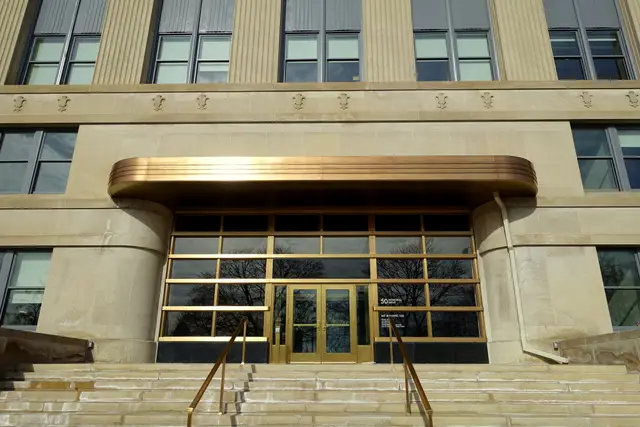
Daderot / Wikimedia Commons / "Morris and Sophie Chang Building (MIT Building E52), Cambridge, MA - DSC05617" / CC0
The master's program in Data, Economics, and Development Policy (DEDP) offered by MIT's Department of Economics is at the forefront of the data-driven fight against poverty. The program, a collaboration between the Economics Department and the Abdul Latif Jameel Poverty Action Lab (J-PAL), equips development professionals worldwide with the practical skills and theoretical knowledge necessary to tackle global challenges. What sets the program apart is its innovative admissions model, where applicants must first complete the online MITx MicroMasters credential before applying, eliminating the need for standardized tests like the GRE or GMAT. This approach attracts students from diverse backgrounds who excel at MIT and possess a strong dedication to improving the lives of millions.
Massachusetts Institute of Technology Electrical Engineering school acceptance rate
Massachusetts Institute of Technology's Electrical Engineering acceptance rate is 8.34%.

John Phelan / Wikimedia Commons / "MIT Building 1, Pierce Engineering Laboratory, Cambridge MA" / CC BY 3.0
The MIT Department of Electrical Engineering and Computer Science has made significant contributions to the field, including the development of the first computer, advancements in radar technology, pioneering work in artificial intelligence, breakthroughs in semiconductor technology, and innovations in communications and networking. These contributions have revolutionized computing, transformed military and civilian applications of radar, pushed the boundaries of AI research, revolutionized the electronics industry with the invention of the transistor, and shaped modern communication technologies. MIT's impact on Electrical Engineering has been profound, with its research and innovations influencing various industries and everyday life.
Massachusetts Institute of Technology Engineering school acceptance rate
Massachusetts Institute of Technology's Engineering acceptance rate is 14.80%. The average GRE Verbal Reasoning score for Massachusetts Institute of Technology Engineering is 159, and the Quantitative Reasoning score is 163.

John Phelan / Wikimedia Commons / "MIT Building 1, Pierce Engineering Laboratory, Cambridge MA" / CC BY 3.0
The Massachusetts Institute of Technology (MIT) Graduate School of Engineering, established in 1861, is renowned for its cutting-edge research and innovation in the field of engineering. MIT has played a pivotal role in shaping scientific and technological advancements throughout history, with notable achievements such as the development of radar, the founding of modern computer science, and the invention of magnetic core memory. The school boasts exceptional student outcomes, with graduates making significant contributions to various industries worldwide. Its engineering expertise extends beyond its campus, and the institution actively seeks to address global challenges. It collaborates with international partners, governments, and organizations to tackle issues such as climate change, healthcare, transportation, and sustainable development. MIT's engineering research and policy recommendations have a significant impact on shaping global agendas and influencing decision-making.
Massachusetts Institute of Technology Math school acceptance rate
Massachusetts Institute of Technology's Math acceptance rate is 10.00%.
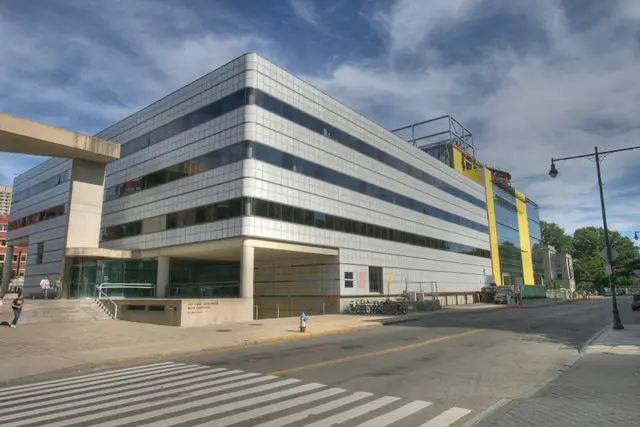
Madcoverbody at English Wikipedia / Wikimedia Commons/ "MIT's Media Laboratory and expansion under construction" / CC BY-SA 3.0
The Massachusetts Institute of Technology (MIT) Department of Mathematics has made notable contributions to various areas of mathematics. The school's emphasis on mathematical physics has led to advancements in quantum mechanics and general relativity. MIT has also been influential in mathematical finance, contributing to the development of option pricing models. Additionally, its focus on applied mathematics and computational science has yielded breakthroughs in fields such as computer graphics and machine learning. These contributions have solidified MIT's reputation as a leading institution in advancing mathematical knowledge. Studying at the MIT Department of Mathematics offers an intellectually stimulating and collaborative environment, working closely with renowned faculty, engaging in cutting-edge research, and preparing for successful careers in mathematics.
Massachusetts Institute of Technology Mechanical Engineering school acceptance rate
Massachusetts Institute of Technology's Mechanical Engineering acceptance rate is 6-9%.

John Phelan / Wikimedia Commons / "MIT Building 1, Pierce Engineering Laboratory, Cambridge MA" / CC BY 3.0
MIT's contributions to mechanical engineering have been diverse and groundbreaking. The institution has excelled in advanced robotics, additive manufacturing, sustainable energy solutions, biomechanics, medical devices, and autonomous vehicles. MIT's research in these areas has resulted in the development of technologies such as the MIT Cheetah in robotics, advancements in 3D printing, breakthroughs in sustainable energy, innovations in biomechanics and medical devices, and contributions to autonomous vehicle technologies. With a culture of innovation and interdisciplinary collaboration, MIT continues to push the boundaries of mechanical engineering, making significant contributions to the field and shaping the future of technology.
Massachusetts Institute of Technology Physics school acceptance rate
Massachusetts Institute of Technology's Physics acceptance rate is 11.00%.
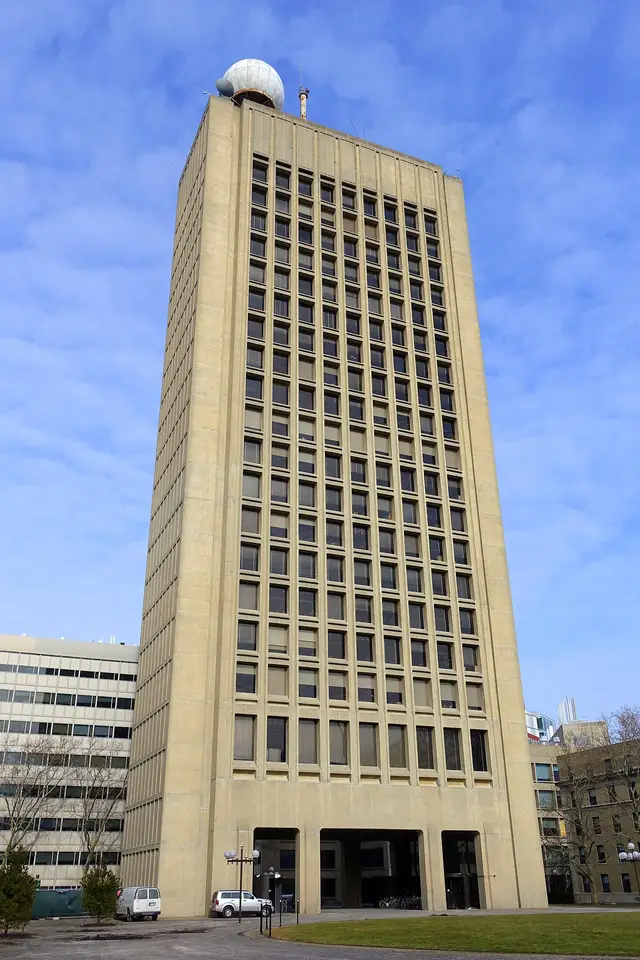
Daderot / Wikimedia Commons / "Green Building - MIT, Cambridge, MA - DSC05589" / CC0
The MIT Department of Physics has a graduate program with 260 to 290 students pursuing a PhD in Physics. Around 45 students start and graduate each year, with a typical study duration of 5 to 7 years. The department conducts groundbreaking research in various areas, exploring space, time, matter, and energy from the subatomic to the cosmic level. Impressive achievements include 14 alumni and 8 faculty members, including 4 current faculty, receiving the Nobel Prize in Physics. The department is renowned for its contributions to physics education, with 8 faculty members honored with the Oersted Medal. They prioritize combining research and instruction, allowing students to engage in original research early on. The department is committed to excellence in research, education, and fostering a positive working environment.
Massachusetts Institute of Technology (Sloan) Business school acceptance rate
Massachusetts Institute of Technology (Sloan)'s Business acceptance rate is 15%. The average GRE Verbal Reasoning score for Massachusetts Institute of Technology (Sloan) Business is 162, and the Quantitative Reasoning score is 163. The average GMAT score for Massachusetts Institute of Technology (Sloan) Business is 724.
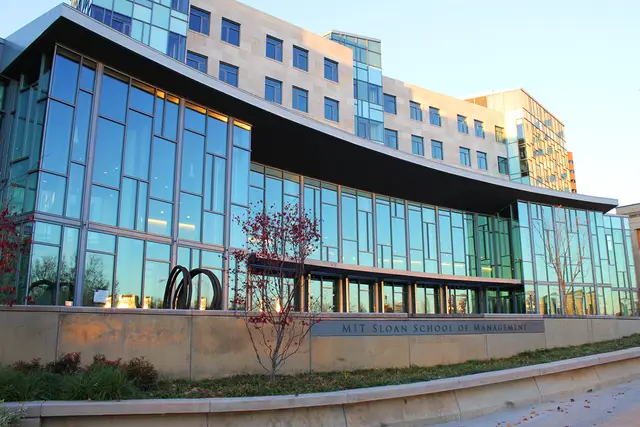
Vitor Pamplona / Wikimedia Commons / "MIT Sloan School of Management" / CC BY 2.0
The Massachusetts Institute of Technology (MIT) Sloan School of Management stands as a prestigious institution known for its world-class business education. Founded in 1914, Sloan has consistently pushed the boundaries of innovation and entrepreneurship. With a highly selective acceptance rate, Sloan attracts exceptional students from diverse backgrounds who are drawn to its unique blend of rigorous academics and cutting-edge research. The school's emphasis on analytics and data-driven decision-making sets it apart, equipping students with the skills to navigate complex business challenges. Sloan's close-knit community fosters collaboration and encourages interdisciplinary exploration, creating an environment that inspires creative thinking and problem-solving. Additionally, the school's location in the vibrant ecosystem of MIT provides unparalleled opportunities for collaboration with renowned researchers, startups, and industry leaders. This combination of academic excellence, technological focus, and collaborative spirit makes MIT Sloan a compelling choice for students seeking to drive innovation and make a lasting impact in the business world.
Michigan State University Interior Design school acceptance rate
Michigan State University's Interior Design acceptance rate is 47.00%.
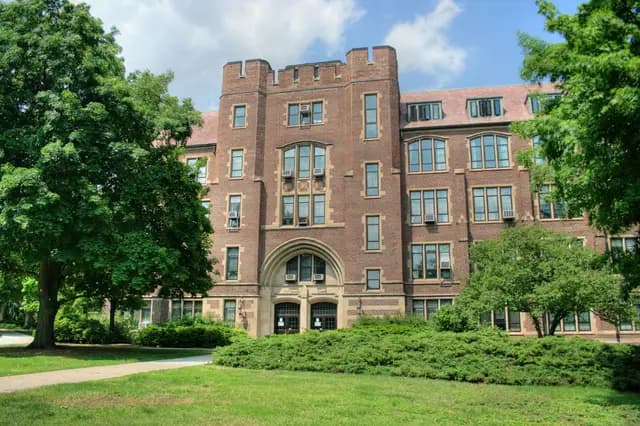
The original uploader was Jeffness at English Wikipedia / Wikimedia Commons / "MSU_Human_Ecology_Building" / CC BY-SA 2.5
The Interior Design Program at Michigan State University (MSU) is a comprehensive and integrated program that focuses on both theoretical and practical aspects of interior design. It is part of the School of Planning, Design, & Construction, which provides a vibrant environment for interdisciplinary learning and collaboration. The program has been accredited since 1976 and offers a rigorous curriculum that emphasizes creativity, innovation, sustainability, ethics, and critical thinking. Faculty and students in the program work together to develop a holistic approach and actively participate in diverse collaboration opportunities to contribute to the development of sustainable built environments. The program also promotes diversity, intellectual integrity, and professional collaboration, and offers study abroad programs to enhance global perspectives. Furthermore, the program engages in research and professional career development to support the mission of MSU as a research-oriented university, aiming to improve the quality of human life and built environments locally and globally.
New York University Journalism school acceptance rate
New York University's Journalism acceptance rate is 56.00%.

Isabella Ruffalo-Burgat / Wikimedia Commons / "Washington Square Arch-Isabella" / CC BY-SA 4.0
NYU's Arthur L. Carter Journalism Institute offers a groundbreaking journalism education that diverges from traditional structures. The program responds to industry demands by producing well-informed journalists who specialize in their reporting subjects. With eight subject areas to choose from, students can focus on cultural criticism, science, or the environment. The small cohort size allows for personalized learning, and critical thinking skills are prioritized. Located in New York City, the program benefits from the city's dynamic atmosphere and provides numerous publishing opportunities. Many students secure competitive internships and publish in esteemed publications before completing their degrees. The program boasts two Pulitzer Prize-winning faculty members, and the Class of 2019 achieved an 84% internship rate and a 94% post-graduation employment rate.
New York University Law school acceptance rate
New York University's Law acceptance rate is 14.50%. The average GRE Verbal Reasoning score for New York University Law is 167, and the Quantitative Reasoning score is 162.
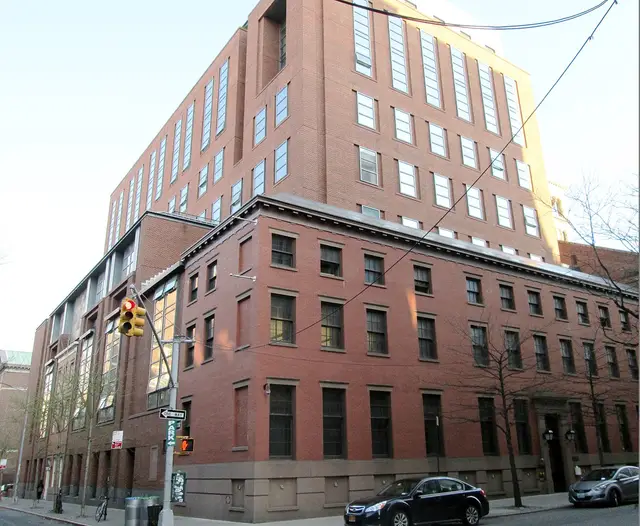
Beyond My Ken / Wikimedia Commons / "Furman Hall NYU Law School" / CC BY-SA 4.0
The New York University School of Law (NYU Law), established in 1835, is renowned for its distinguished reputation and cutting-edge legal education. It is regarded for its interdisciplinary research and teaching, with special strengths in law and philosophy, economics, politics, history, and social theory. The oldest law school in New York City and the oldest surviving law school in New York State, NYU Law offers a vibrant and intellectually stimulating environment for aspiring legal professionals. NYU Law stands out for its commitment to public interest law, providing extensive clinical programs and pro bono opportunities. The school boasts impressive rankings, consistently placing among the top law schools in the United States. With its rich history, exceptional faculty, and strong student outcomes, NYU Law continues to be a premier institution for legal education and a gateway to success in the legal profession.
New York University Math school acceptance rate
New York University's Math acceptance rate is 27.00%.

ajay_suresh / Wikimedia Commons / "NYU - Silver Center" / CC BY 2.0
NYU's Master's degree in mathematics provides specialized training in real analysis, complex analysis, linear algebra, probability, scientific computing, and differential equations. Graduates have the opportunity to pursue advanced courses in pure and applied mathematics. An M.S. degree from NYU prepares students for careers in government, business, and industry, while a Ph.D. opens up broader options, including joining the faculty of universities, conducting research, or pursuing post-doctoral positions. The program offers individual attention and a customized curriculum. Graduates can explore diverse career paths, such as software design, biostatistics, industrial engineering, imaging science, aerospace mathematics, and economics. NYU Mathematicians are sought after in various sectors, including finance and government organizations like the National Security Agency.
New York University (Grossman) Medicine school acceptance rate
New York University (Grossman)'s Medicine acceptance rate is 2.50%.

Jim Henderson / Wikimedia Commons / "New York University (Grossman)" / CC0
Established in 1841, the New York University (Grossman) School of Medicine stands as a remarkable institution that sets itself apart in medical education. Located in New York City, the program benefits from its proximity to esteemed hospitals and research centers. It is unique for its three-year curriculum, which allows students to enter residency programs earlier than traditional programs. The school has received numerous accolades, including being ranked #9 in the U.S. News & World Report's Best Medical Schools for Research in 2022. Notably, NYU Grossman School of Medicine became tuition-free in 2018, making it one of the few institutions to provide financial relief to medical students. With an impressive residency match rate of 98% and a strong focus on patient-centered care, the program ensures graduates are well-prepared for successful medical careers.
New York University (Steinhardt) Education school acceptance rate
New York University (Steinhardt)'s Education acceptance rate is 64.10%. The average GRE Verbal Reasoning score for New York University (Steinhardt) Education is 154, and the Quantitative Reasoning score is 157.
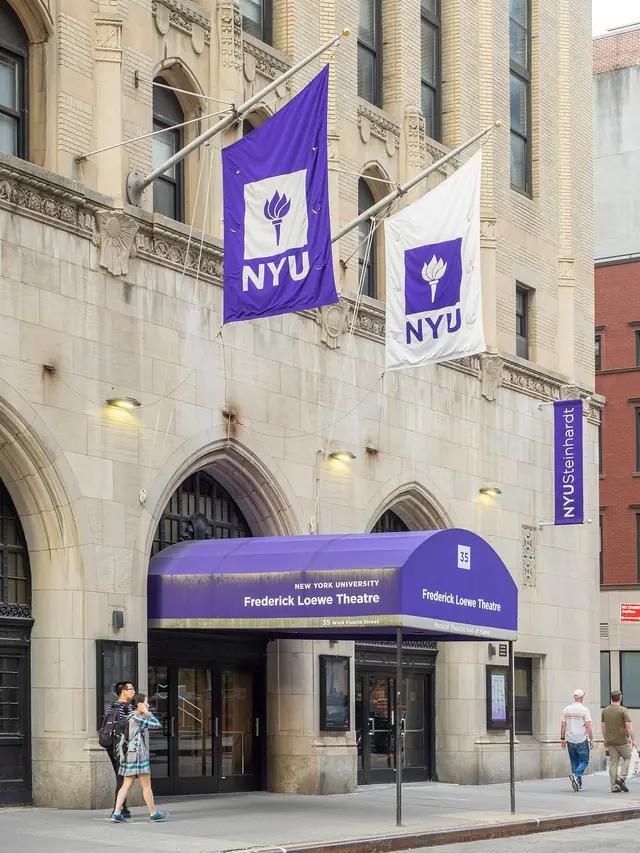
Ajay Suresh from New York, NY, USA / Wikimedia Commons / "Frederick Loewe Theatre (48072656586)" / CC BY 2.0
The New York University (NYU) Steinhardt Graduate School of Education, established in 1890, is renowned for its commitment to social justice and innovative approaches to education. The school has a long history of challenging conventional practices and promoting equity and inclusion in education. It stands out for its commitment to research-driven teaching methods, which equip students with the latest knowledge and tools to address real-world educational challenges. Moreover, Steinhardt's location in New York City provides students with unique opportunities for internships, networking, and collaboration with leading educational institutions and organizations. The school's emphasis on interdisciplinary collaborations further sets it apart, allowing students to explore diverse perspectives and approaches to education. This combination of a progressive mindset, practical experiences, and a vibrant educational ecosystem makes the NYU Steinhardt Graduate School of Education truly standout.
Northwestern University Chemistry school acceptance rate
Northwestern University's Chemistry acceptance rate is 27.00%.
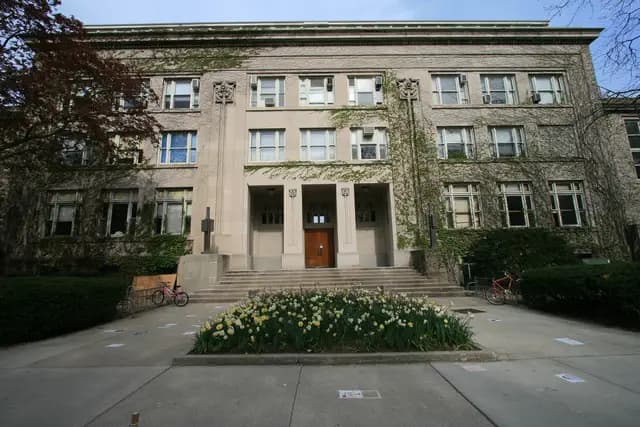
Madcoverboy at English Wikipedia / Wikimedia Commons / "Swift Hall at Northwestern" / CC BY-SA 3.0
The Department of Chemistry prioritizes graduate education and research at the forefront of the field, equipping students for research positions in academia or industry. They offer advanced courses, seminars, and research opportunities covering various branches of chemistry, such as inorganic, organic, physical, and biological chemistry. The department actively promotes interdisciplinary research in materials chemistry, environmental chemistry, and the chemistry of life processes. Collaboration between students and faculty extends to several research centers on campus, including the Materials Research Science and Engineering Center (MRSEC), Center for Catalysis and Surface Science, International Institute for Nanotechnology (IIN), Argonne-Northwestern Solar Energy Research Center, Chemistry of Life Processes Institute (CLP), Center for Molecular Innovation and Drug Discovery (CMIDD), and the Center for Bio-Inspired Energy Science (CBES).
Northwestern University Communications school acceptance rate
Northwestern University's Communications acceptance rate is 29.00%.
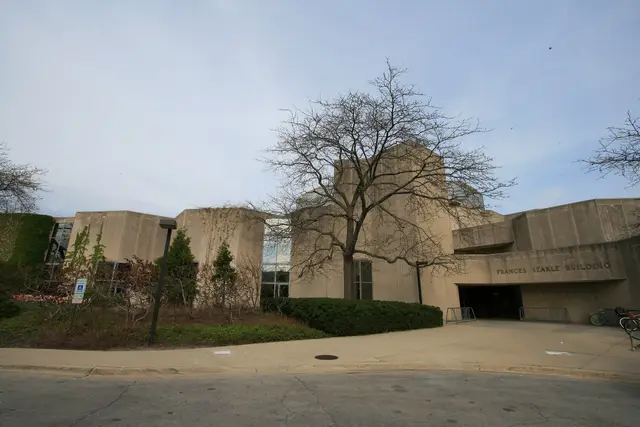
Madcoverboy at English Wikipedia / Wikimedia Commons / "Francis Searle Building" / CC BY-SA 3.0
The Northwestern MSC degree program equips students with leadership skills to excel in their careers. It integrates communication theory and practical application for a competitive advantage. Students learn to navigate complex organizational structures, lead collaboratively, and deliver effective messages tailored to audiences. The program culminates in a three-part cumulative deliverable, including brand collateral that showcases their growth as professionals and Northwestern MSC graduates. Professors are personally invested in the program, teaching out of belief in its importance and a desire to connect with students. Students can participate in co-curricular activities, receive support from the program's team, and explore job opportunities to build their network and personal brand.
Northwestern University Economics school acceptance rate
Northwestern University's Economics acceptance rate is 10.96%.
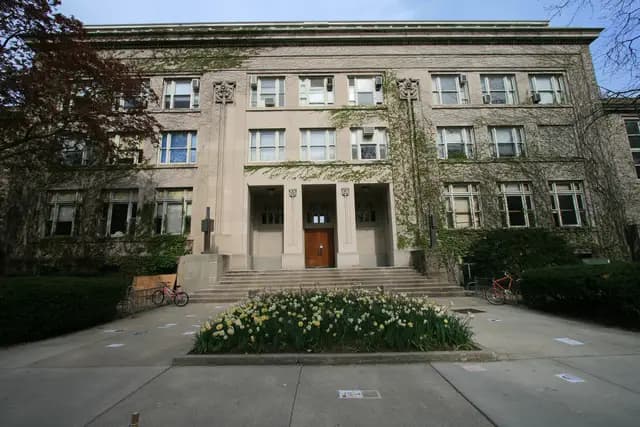
Madcoverboy at English Wikipedia / Wikimedia Commons / "Swift Hall at Northwestern" / CC BY-SA 3.0
Located in Evanston, just outside of Chicago, Northwestern University offers students the best of both worlds with its scenic lakefront campus and proximity to a vibrant city. The university's strong focus on economic history, supported by esteemed faculty and a comprehensive course selection, provides students with a unique foundation for research and teaching in the field. Students have various housing options, including apartments near campus and access to the city's public transportation system. Northwestern also offers on-campus graduate residence halls. Additionally, students benefit from a wealth of cultural and recreational opportunities both on campus and in the surrounding areas. The economics department boasts distinguished faculty, with many fellows and research associates of prestigious organizations, as well as former editors of prominent journals. Notably, Dale Mortensen, a longtime faculty member, was awarded the Nobel Prize in Economics in 2010.
Northwestern University Journalism school acceptance rate
Northwestern University's Journalism acceptance rate is 29.00%.
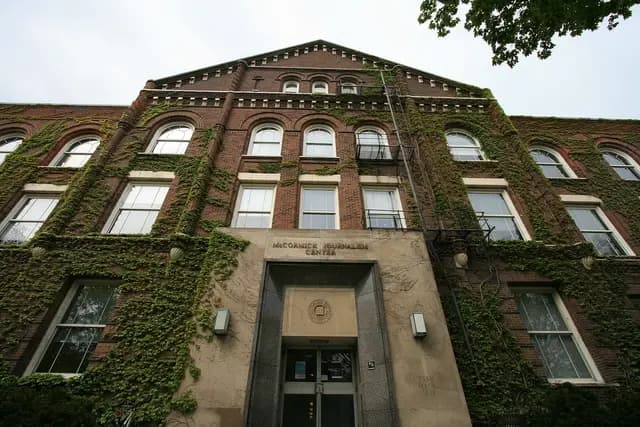
Madcoverboy at English Wikipedia / Wikimedia Commons / "Fisk Hall at Northwestern" / CC BY-SA 3.0
Medill is a top-notch graduate journalism program that empowers journalists to excel in today's digital media landscape. With real-world reporting opportunities and immersive experiences through Medill Explores, students develop enduring skills, explore different subject areas, and engage with diverse cultures. The program's association with Northwestern University, a top 10 institution, adds to its reputation. Students can specialize in their passion, benefiting from a vast alumni network in journalism and other industries worldwide. Medill offers job search support, access to renowned scholars and professionals, and the opportunity to learn from influential guest speakers. Its coast-to-coast campuses provide a varied learning environment, and the MSJ program is STEM-designated.
Northwestern University Psychology school acceptance rate
Northwestern University's Psychology acceptance rate is 5.00%.
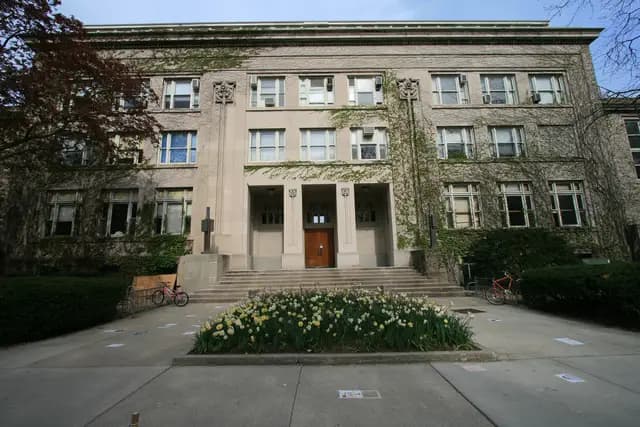
Madcoverboy at English Wikipedia / Wikimedia Commons / "Swift Hall at Northwestern" / CC BY-SA 3.0
Northwestern University's Psychology Department offers prestigious Ph.D. programs in Clinical Psychology, Personality, Development, and Health Psychology, Cognitive Psychology, Brain, Behavior, & Cognition (BBC), and Social Psychology. Graduate students and faculty conduct influential research in these areas, presenting their findings at conferences and publishing in renowned journals. The program provides comprehensive training in methodology, statistics, and psychology's diverse content. Students receive full funding for five years and engage in interdisciplinary research opportunities. Northwestern's Psychology Department aims to cultivate exceptional scientists for academic and research positions. Located near Chicago on a picturesque campus, the department fosters a dynamic and supportive community for scholars and researchers.
Northwestern University (Kellogg) Business school acceptance rate
Northwestern University (Kellogg)'s Business acceptance rate is 10.96%. The average GRE Verbal Reasoning score for Northwestern University (Kellogg) Business is 162, and the Quantitative Reasoning score is 163. The average GMAT score for Northwestern University (Kellogg) Business is 729.
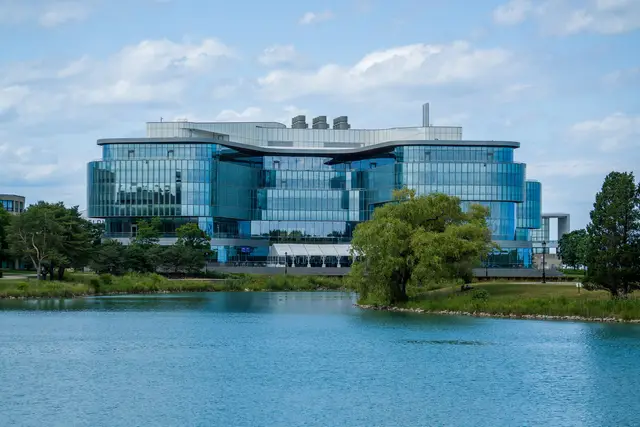
Joseph Gage / Wikimedia Commons / "Northwestern University (Kellogg)." / CC BY-SA 2.0
Established in 1908, Northwestern University's Kellogg School of Business has evolved into a leading institution renowned for its exceptional business education. Kellogg's commitment to collaboration and interdisciplinary learning has garnered global recognition, consistently ranking among the top business schools worldwide. With an impressive faculty-to-student ratio of 1:6, Kellogg offers a highly personalized learning experience. The school's innovative MMM Program, launched in 1951, uniquely combines management, design thinking, and technology management. Kellogg boasts a strong alumni network of over 60,000 professionals spread across 130 countries, providing unparalleled networking opportunities. Moreover, Kellogg's graduates enjoy remarkable career outcomes, with 95% of the class of 2020 receiving job offers within three months of graduation. With its unwavering focus on leadership development and ethical decision-making, Kellogg equips students to become impactful leaders who shape the future of business.
Princeton University Architecture school acceptance rate
Princeton University's Architecture acceptance rate is 9.00%. The average GRE Verbal Reasoning score for Princeton University Architecture is 162.5, and the Quantitative Reasoning score is 162.
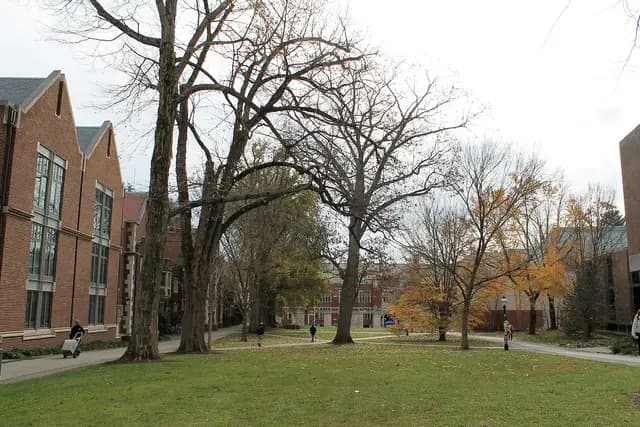
Patrick Nouhailler from Suisse / "Princeton" / CC BY-SA 2.0
Studying at the Princeton University Graduate School of Architecture offers a unique and enriching experience. The school provides a vibrant and collaborative learning environment that encourages exploration, experimentation, and critical thinking. Students have access to state-of-the-art facilities, including design studios, research labs, and fabrication workshops, fostering hands-on learning and creative expression. The faculty comprises renowned architects, scholars, and practitioners who mentor and guide students through their academic journey. The curriculum emphasizes interdisciplinary approaches, allowing students to engage with various fields such as urban planning, sustainability, and digital fabrication. The school also organizes guest lectures, exhibitions, and workshops, providing opportunities for intellectual discourse and networking. Overall, studying at Princeton's architecture school offers a transformative experience that nurtures individual growth and prepares students for successful careers in the field.
Princeton University Chemical Engineering school acceptance rate
Princeton University's Chemical Engineering acceptance rate is 13.00%.
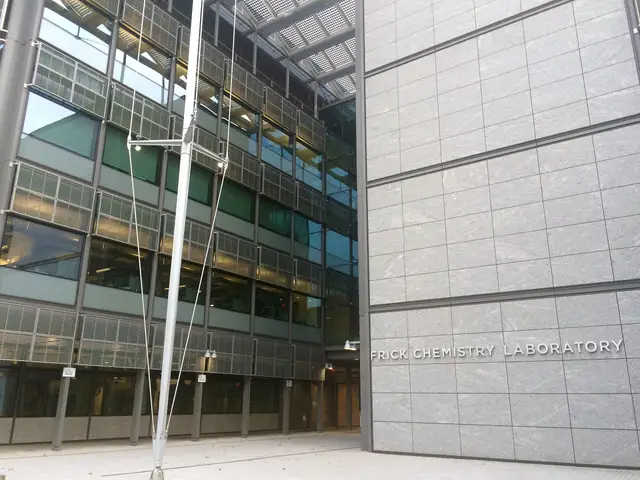
David Keddie / Wikimedia Commons / "Frick Chemistry Laboratory (new)" / CC BY-SA 4.0
Princeton University's Ph.D. program is distinctive in several ways. It aims to prepare students for research careers in industry or academia, providing them with a livable stipend and exempting them from tuition fees for five years, as long as they make satisfactory progress. The program's focus is on original research leading to a Ph.D. dissertation, complemented by coursework in chemical engineering and related fields. The program emphasizes close mentorship, effective communication skills, and offers ample collaboration opportunities, including access to advanced technologies and connections with leading researchers. Additionally, Princeton's favorable location near major cities and outdoor recreational areas adds to its uniqueness.
Princeton University Chemistry school acceptance rate
Princeton University's Chemistry acceptance rate is 10.00%.
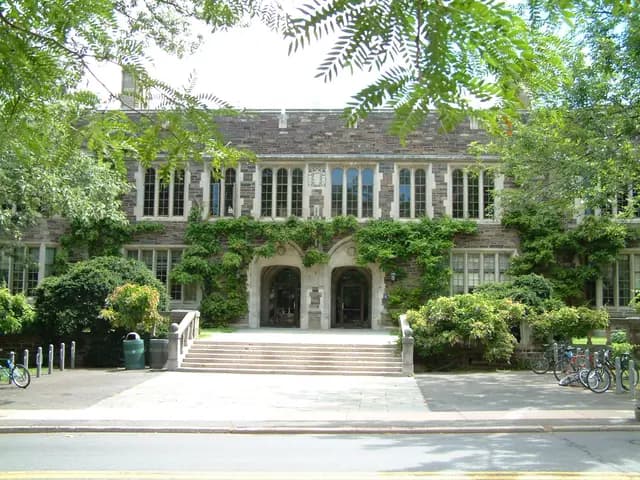
Quantockgoblin 18:08, 2 December 2006 (UTC) / Wikimedia Commons / "Princeton University Frick Lab" / Public domain
The Department of Chemistry at Princeton University provides a Ph.D. program with a diverse community of approximately 165 graduate students and 120 postdoctoral researchers, visiting faculty, and senior scholars. Research in various chemistry fields is pursued both within the department and in collaboration with other departments and programs on campus. The program offers interdisciplinary and collaborative research opportunities, with a focus on areas such as catalysis, organic synthesis, chemical biology, inorganic chemistry, physical experimental chemistry, theoretical and computational chemistry, and materials chemistry. Students benefit from faculty mentoring, access to resources, and the opportunity to pursue individualized programs. The program culminates in a thesis-based research project and a public oral examination for the Ph.D. degree. A Master of Science program is also available for select industry-sponsored candidates.
Princeton University Computer Science school acceptance rate
Princeton University's Computer Science acceptance rate is 13.00%.
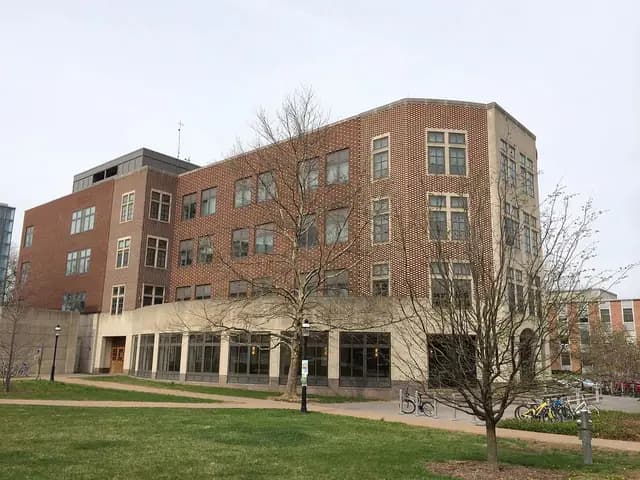
PointsofNoReturn / Wikimedia Commons / "Princeton University Computer Science Building" / CC BY-SA 3.0
Princeton University's Department of Computer Science boasts a distinguished legacy, with notable residents like Alan Turing and John von Neumann. The department houses 46 tenure-track and 12 teaching faculty, specializing in a wide range of areas including theory, networks/systems, vision/graphics, and machine learning. They maintain a robust computing and network infrastructure, featuring a 10 Gb/sec Ethernet backbone connecting various buildings, along with access to shared campus computing resources. Storage needs are met through a high-performance modular filesystem with 1.1 PB of usable storage. Overall, Princeton CS utilizes its esteemed faculty, advanced infrastructure, and campus resources to drive innovative research and education in computer science.
Princeton University Economics school acceptance rate
Princeton University's Economics acceptance rate is 9.00%.
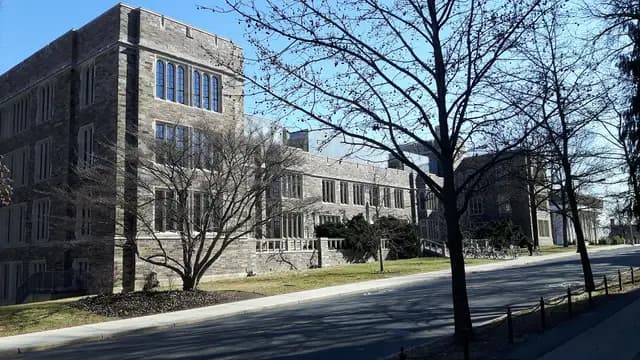
Sonny415 / Wikimedia Commons / "Julis Romo Rabinowitz Building" / CC BY-SA 4.0
Princeton University's Department of Economics is highly regarded for its study of economics. It is part of the prestigious "big five" schools in the field, along with Harvard, Stanford, MIT, and the University of Chicago. The graduate program attracts applicants from over 30 countries and provides specialization in areas like Macroeconomics, Industrial Relations, and International Finance. Graduates have achieved notable placements in leading universities worldwide. The department consistently ranks among the top in the world, according to QS World University Rankings and Times Higher Education World University Rankings. Unique aspects of studying at Princeton University's Department of Economics include its esteemed faculty, rigorous curriculum, and a diverse international student community.
Princeton University International Relations school acceptance rate
Princeton University's International Relations acceptance rate is 9.00%.

Zane R. at Wikimedia Commons / "Woodrow Wilson School of Public and International Affairs - Robertson Hall" / CC BY 2.0
The Master in Public Affairs (M.P.A.) program at Princeton University is a rigorous two-year program that prepares students for careers in international and domestic policy. It emphasizes a commitment to public service and offers a wide range of courses to develop analytical skills in areas such as politics, economics, and quantitative analysis. Students can specialize in one of four fields and pursue joint degree options in law or business. Financial aid is available to support students in pursuing public service careers. The program includes policy workshops, a focus on diversity and inclusion, qualifying examinations, and an internship component. Collaboration with top law schools is also offered for joint degrees.
Princeton University Math school acceptance rate
Princeton University's Math acceptance rate is 10.00%.
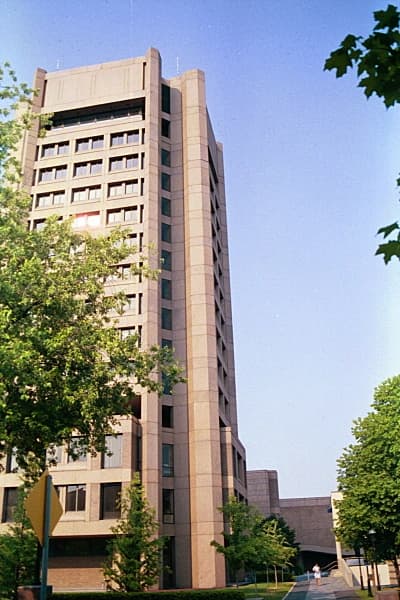
Joseph Barillari at en.wikipedia / Wikimedia Commons / "Fine Hall, Princeton University" / CC BY-SA 3.0
The Department of Mathematics graduate program stands out among other prestigious mathematics institutions in the United States due to its focus on independent research. The program offers extensive research and educational opportunities while maintaining minimal requirements for admission. The student body is highly motivated and diverse in terms of backgrounds. Despite the emphasis on independent work, a strong sense of camaraderie exists among the graduate students, fostering an atmosphere of excitement, stimulation, and support. Additionally, the department maintains a close relationship with the nearby Institute for Advanced Study (IAS), providing students with access to IAS members and seminars. Graduates of the program consistently secure academic positions at leading mathematical institutions and industries, typically completing their dissertations within four to five years.
Princeton University Physics school acceptance rate
Princeton University's Physics acceptance rate is 10.00%.
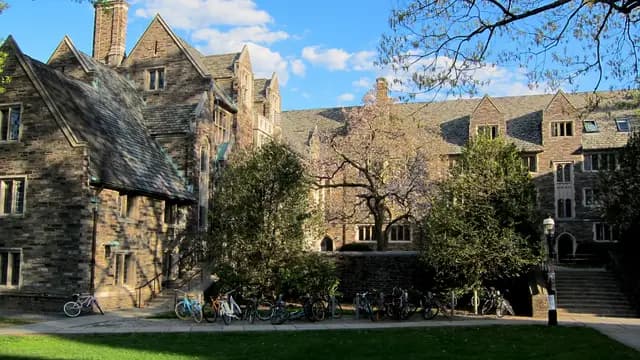
cultivar413 / Wikimedia Commons / "One of the first interwar dormitories constructed, Pyne Hall would come to serve as the home of first female students on campus." / CC BY 2.0
The Department of Physics focuses on research-intensive graduate studies leading to a Ph.D. degree. They prioritize inclusiveness, welcoming students from diverse backgrounds and fostering a strong sense of community. The department emphasizes both theoretical and experimental studies, covering areas such as elementary particle physics, gravity and cosmology, nuclear and atomic physics, condensed matter physics, and biophysics. Early research involvement helps students develop essential skills and establish connections with faculty members, preparing them for independent research. Additionally, the department provides training in teaching and scholarly presentation. Collaborations with other departments and institutes offer interdisciplinary research opportunities. While not mandatory, graduate students have the chance to gain teaching experience. The program aims to equip students for careers in academia, research, and non-academic sectors.
Princeton University Psychology school acceptance rate
Princeton University's Psychology acceptance rate is 9.00%.
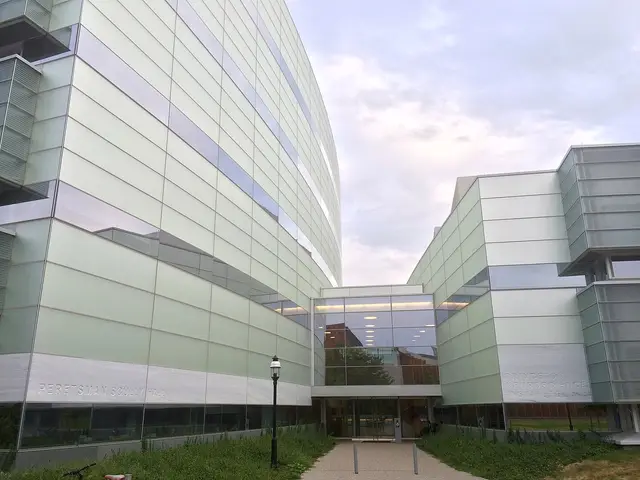
David Keddie / Wikimedia Commons / "Peretsman-Scully Hall" / CC BY-SA 4.0
The Department of Psychology's graduate program focuses on preparing students for a Ph.D. degree and a successful career in psychological science. It offers specializations in diverse areas, such as behavioral economics, cognitive neuroscience, culture, developmental science, diversity science, emotion, language and communication, learning and memory, perception and cognition, the psychology of inequality, social neuroscience, social psychology, and systems neuroscience. The program emphasizes the importance of teaching experience, encouraging students to explore their roles as educators through pedagogy-related talks and workshops. This approach fosters a comprehensive understanding of effective teaching practices, enhancing students' overall educational experience.
Purdue University, West Lafayette Civil Engineering school acceptance rate
Purdue University, West Lafayette's Civil Engineering acceptance rate is 47.00%.
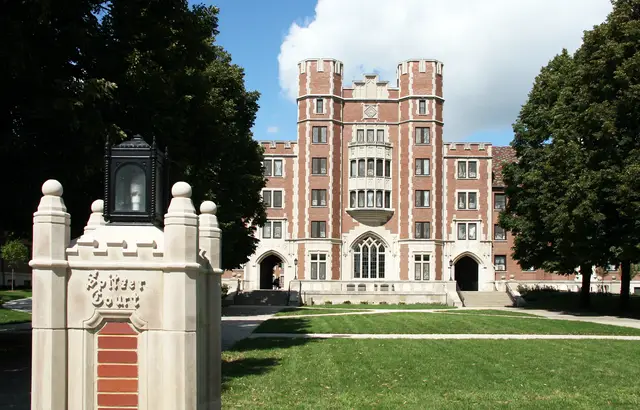
Huw Williams (Huwmanbeing) / Wikimedia Commons / "Cary Quad (formally Franklin Levering Cary Quadrangle), a student residence hall on the campus of Purdue University in West Lafayette, Indiana." / Public domain
Established in 1887, Purdue's Lyle's School of Civil Engineering has gained a global reputation for its excellence and attracts around 670 students from various parts of the world. The Graduate Program in Civil Engineering at Purdue University is a thriving academic community with more than 250 students pursuing Master's or PhD degrees. The Master's program is designed to be flexible, allowing students to collaborate with faculty members to create a customized study plan that aligns with their career aspirations and enables them to develop specialized skills. On the other hand, the PhD program provides an opportunity for intensive research and academic pursuits. The university offers online labs and recorded classes, ensuring convenience for students, with a high employment rate of 97% for those enrolling in online graduate engineering programs.
Purdue University, West Lafayette Communications school acceptance rate
Purdue University, West Lafayette's Communications acceptance rate is 64.00%.
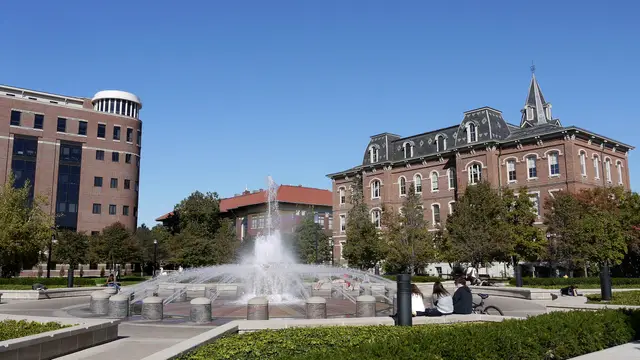
Quinn Thomson / Wikimedia Commons / "Purdue University Liberal Arts fountain" / CC BY-SA 3.0
Purdue University's Communication Studies department has a storied history, offering master's degrees since 1947 and doctoral degrees since 1948. The program has been at the forefront of advancements in the field, with faculty and graduate students leading the way in discovery, learning, and engagement. With a flexible curriculum covering various communication theories and research methodologies, Purdue University Northwest provides a master's degree program that caters to professionals seeking career growth. The program's rolling admissions policy allows for enrollment up to the start of each semester, and evening classes accommodate full-time work schedules. Graduates have successfully enhanced their skills, pursued teaching positions, or prepared for further study in communication.
Purdue University, West Lafayette Electrical Engineering school acceptance rate
Purdue University, West Lafayette's Electrical Engineering acceptance rate is 37%.
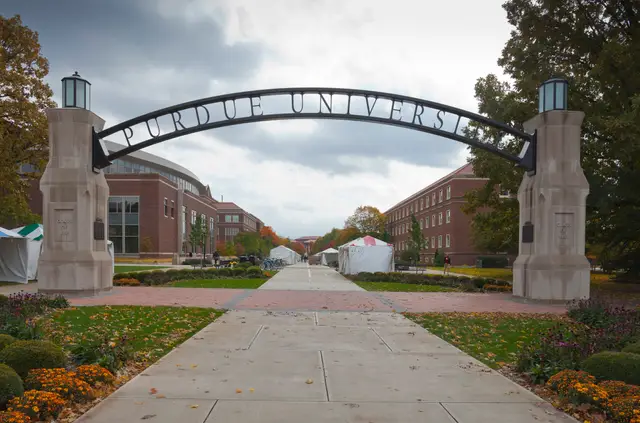
Diego Delso / Wikimedia Commons / "Purdue University, West Lafayette, Indiana, USA" / CC BY-SA 3.0
Purdue University's School of Electrical and Computer Engineering is a renowned department founded in 1888, known for its large size and excellence in education. Their graduate programs are highly ranked and offer a stimulating learning environment for students. The faculty members are internationally recognized for their research, teaching, and mentoring. The admission rate is competitive at 29%, and 37% of students receive funding. The program duration is typically three years, but the average completion time is 1.9 years. The student-to-faculty ratio is 10.1:1. Purdue ECE provides various Master's tracks and partners with TaskHuman, a mobile app for personal wellness goals, in addition to existing wellness programs.
Purdue University, West Lafayette Engineering school acceptance rate
Purdue University, West Lafayette's Engineering acceptance rate is 32.70%. The average GRE Verbal Reasoning score for Purdue University, West Lafayette Engineering is 155, and the Quantitative Reasoning score is 164.
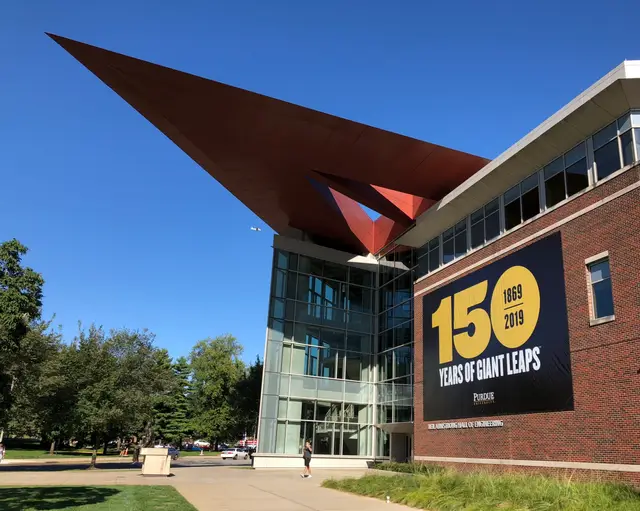
Alexeenko / Wikimedia Commons / "Neil Armstrong Hall of Engineering Stadium Ave Entrance" / CC0
Purdue University's engineering program has made significant contributions to space exploration through its research, innovation, and collaboration with NASA and other space agencies. Known as the "Cradle of Astronauts," Purdue has educated more astronauts than any other university, fostering a culture of excellence and expertise in aerospace engineering. Its faculty and students have conducted groundbreaking research in areas such as propulsion systems, materials science, and spacecraft design. Purdue's engineering graduates have played pivotal roles in space missions, contributing to the development of advanced technologies and pushing the boundaries of human exploration. Through its strong engineering program, Purdue continues to shape the future of space exploration.
Purdue University, West Lafayette Mechanical Engineering school acceptance rate
Purdue University, West Lafayette's Mechanical Engineering acceptance rate is 47.00%.
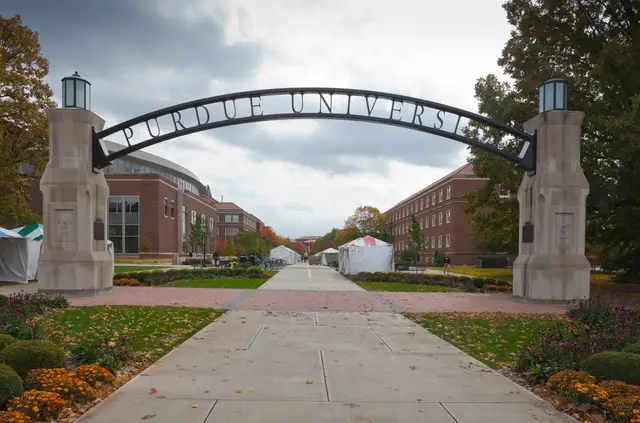
Diego Delso / Wikimedia Commons / "Purdue University, West Lafayette, Indiana, USA" / CC BY-SA 3.0
Purdue University offers graduate degree programs in mechanical engineering that provide opportunities for world-class research. Students receive close support from faculty and industry to develop the skills needed for innovation in various fields, ranging from fuel pumps to heart pumps, carbon fiber to carbon nanotubes, and solid rockets to soft robotics. The university, located in West Lafayette, Indiana, offers the benefits of a Big Ten institution, including cultural events and exciting athletics, all within walking distance. With a diverse population of 40,000 students, including over 25% from outside the US, Purdue provides both a small-town feel and easy access to larger cities like Indianapolis and Chicago. Graduates can benefit from Purdue's industry partnerships and a network of 82,000 engineering alumni worldwide to advance their careers.
Rice University (Brown) Biomedical Engineering school acceptance rate
Rice University (Brown)'s Biomedical Engineering acceptance rate is 25.00%.

Dsazer25 / Wikimedia Commons / "BioScience Research Collaborative" / CC BY-SA 4.0
The Master of Bioengineering (MBE) is a non-thesis program ideal for industry-focused individuals seeking advanced bioengineering training. It offers full-time or part-time enrollment options for candidates holding a BA or BS in engineering or science. The MBE degree provides specialization in two areas: Applied Bioengineering, for those interested in research or medical careers, and Medical Innovation (GMI), designed for the medical technology industry. GMI offers a one-year, full-time curriculum integrating engineering, business, and clinical training. Students gain real-world experience through hands-on medical design projects, global immersion, and collaborations with Rice University, the Texas Medical Center, and other U.S. laboratories.
Scripps Research Institute Chemistry school acceptance rate
Scripps Research Institute's Chemistry acceptance rate is 13%.
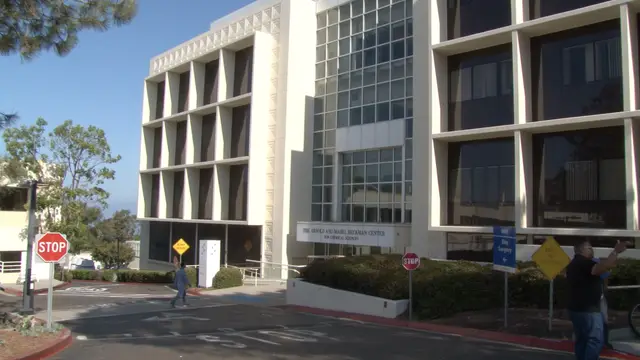
Biomedicalbuff / Wikimedia Commons / "Beckman exterior TSRI" / CC BY-SA 4.0
The Scripps Research Institute's Graduate Program offers an interdisciplinary "Doctoral Program in Chemical and Biological Sciences" at its campuses in La Jolla, California, and Jupiter, Florida. With over 300 students, the program emphasizes an interdisciplinary approach to education and provides mentorship from more than 200 scientific faculty members, including Nobel Laureates. Accredited by the Western Association of Schools and Colleges (WASC) Senior College and University Commission since 1993, the program offers research opportunities, seminars, and professional development workshops. Advanced broadcasting technologies ensure seamless connectivity and interaction between students and faculty across both campuses, fostering a vibrant research community.
Southern California Institute of Architecture Architecture school acceptance rate
Southern California Institute of Architecture's Architecture acceptance rate is 65.00%.

Los Angeles / Wikimedia Commons / "Santa Fe Freight Depot" / CC BY-SA 3.0
The Southern California Institute of Architecture (SCI-Arc) is a renowned graduate school of Architecture established in 1972. Located in Los Angeles, California, it enjoys the advantage of being immersed in a vibrant architectural landscape. SCI-Arc is most known for its avant-garde and experimental approach to architectural education, emphasizing the exploration of innovative design concepts. With a focus on critical thinking and cutting-edge technology, the school has produced numerous notable architects who have made significant contributions to the field. It has consistently been ranked among the top architecture schools globally and has received prestigious awards, including the AIA Education Honor Award. Notably, architect Thom Mayne, founder of the renowned firm Morphosis, is a trustee and the coordinator of the Design of Cities postgraduate program.
Stanford University Biomedical Engineering school acceptance rate
Stanford University's Biomedical Engineering acceptance rate is 15.30%.
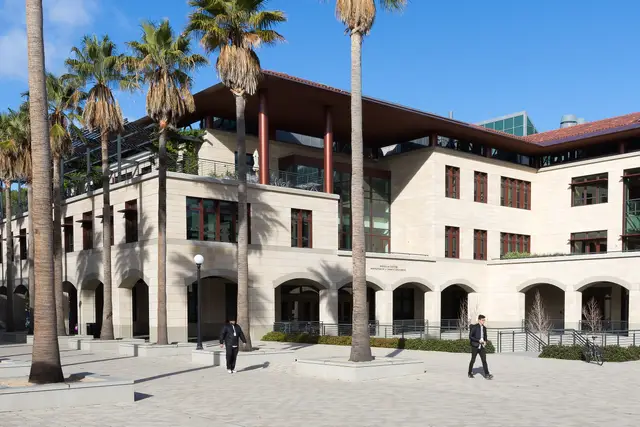
Frank Schulenburg / Wikimedia Commons / "Shriram Center, Stanford University" / CC BY-SA 4.0
Stanford Bioengineering provides master's and doctoral programs for students seeking expertise in the field. The master's program encompasses core bioengineering courses, technical electives, seminars, and unrestricted electives to enhance knowledge. The PhD program combines intensive coursework with innovative research mentored by Stanford faculty, fostering independent intellectual leaders at the intersection of biology, medicine, engineering, and physical sciences. Additionally, bioengineering graduate students have the opportunity to pursue dual and joint programs with the Stanford Schools of Business, Medicine, and Law, such as MS/MBA, MD/PhD, or JD/MS degrees. The Master of Science in Bioengineering focuses on various areas like biomedical computation, regenerative medicine, molecular and cell bioengineering, biomedical imaging, and biomedical devices, allowing students to tailor their studies to their interests and career goals.
Stanford University Business school acceptance rate
Stanford University's Business acceptance rate is 6.89%. The average GRE Verbal Reasoning score for Stanford University Business is 164, and the Quantitative Reasoning score is 163. The average GMAT score for Stanford University Business is 737.
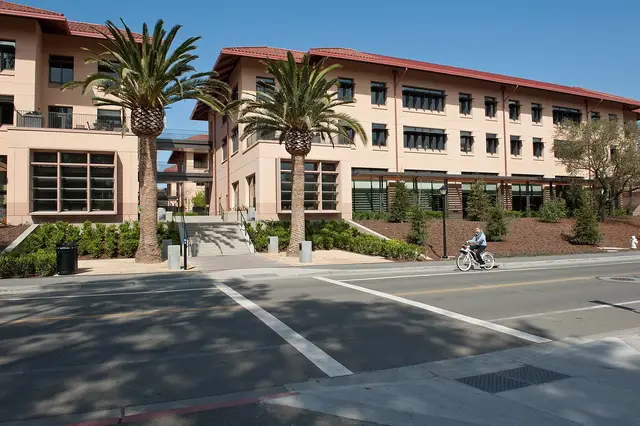
Steve Castillo / Wikimedia Commons / "Stanford University." / CC BY 3.0
Stanford University's Graduate School of Business (GSB) holds an illustrious reputation as one of the world's foremost business institutions. Founded in 1925, the GSB has been at the forefront of innovation, entrepreneurship, and leadership development. The school's location in the heart of Silicon Valley provides unparalleled access to industry pioneers, fostering a vibrant ecosystem of collaboration and idea exchange. Stanford GSB's renowned faculty comprises accomplished scholars and industry experts who engage students through dynamic teaching methods. The school's rigorous curriculum offers flexibility and encourages interdisciplinary exploration. With an acceptance rate of around 6%, Stanford GSB attracts top talent from diverse backgrounds, ensuring a rich and inclusive learning environment. The GSB's commitment to social impact is exemplified through programs like the Stanford Seed, which supports entrepreneurs in emerging economies. By equipping students with the skills to navigate complexity and drive positive change, Stanford GSB prepares graduates to become influential leaders shaping the future of global business.
Stanford University Chemical Engineering school acceptance rate
Stanford University's Chemical Engineering acceptance rate is 15.30%.
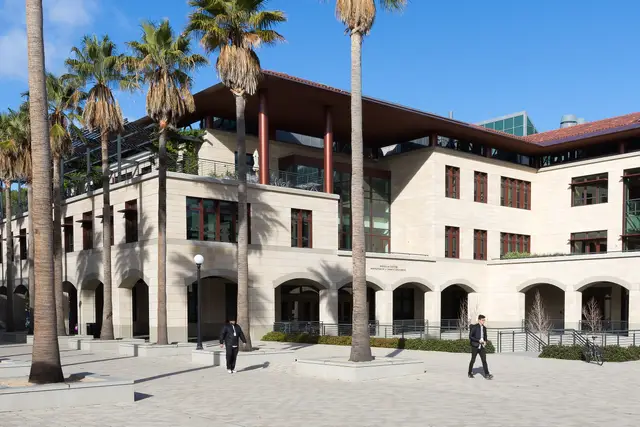
Frank Schulenburg / Wikimedia Commons / "Shriram Center, Stanford University" / CC BY-SA 4.0
The Doctor of Philosophy in Chemical Engineering at Stanford requires completion of 135 graduate units and additional requirements. Research areas include statistical mechanics, biocatalysis, bioengineering, colloid science, and more. The program aims to equip students with knowledge and skills for professional careers or further studies through advanced coursework in fundamental chemical engineering topics. The Ph.D. is awarded to candidates who demonstrate substantial scholarship and research capabilities. Current research covers topics like renewable energy, polymer science, nanotechnology, and surface science. Overall, the program emphasizes independent research and prepares students to make original contributions in Chemical Engineering and related fields.
Stanford University Chemistry school acceptance rate
Stanford University's Chemistry acceptance rate is 3.95%.
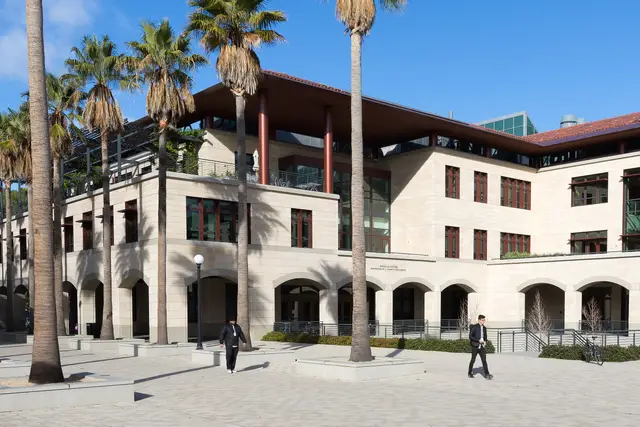
Frank Schulenburg / Wikimedia Commons / "Shriram Center, Stanford University" / CC BY-SA 4.0
The Master of Science program in Chemistry at Stanford University is only available to its current Ph.D. students and through a coterminal program. Applicants must complete a minimum of 45 graduate-level units and an M.S. thesis in addition to their bachelor's degree requirements. With a student-faculty ratio of 5:1 and 69.3% of classes having fewer than 20 students, Stanford offers an intimate learning environment. The university has 17 Nobel laureates and is ranked second globally by QS Global World Ranking. The Department of Chemistry provides diverse opportunities for graduate study, covering various subfields. Academic advising is crucial, with regular meetings, yearly development plans, and timely feedback between advisers and students.
Stanford University Civil Engineering school acceptance rate
Stanford University's Civil Engineering acceptance rate is 15.30%.
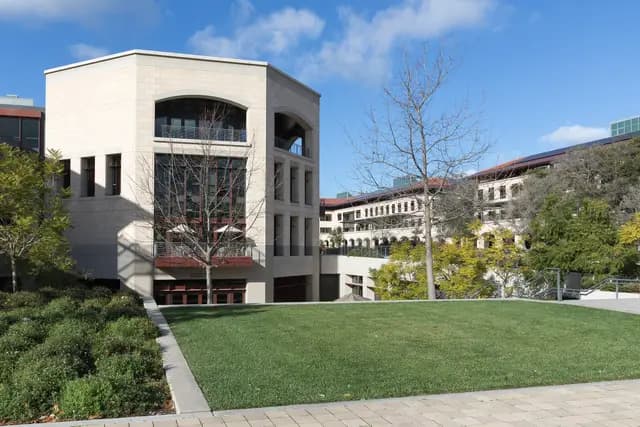
Frank Schulenburg / Wikimedia Commons / "Jen-Hsun Huang Engineering Center in 2016" / CC BY-SA 4.0
The Master of Science in Civil and Environmental Engineering program at Stanford University offers an outstanding education and career prospects for its students. Graduates have the opportunity to engage in research and professional work in the field. The program's interactive curriculum, research opportunities, and experienced faculty provide a rich learning experience. Students develop skills as creative and independent researchers, preparing them for successful careers. The employment rate of Stanford University graduates is high, and the courses are designed to meet industry demands. The program also includes cross-cutting curricula covering topics such as probability, statistics, public policy, ethics, and scientific computing, providing students with a comprehensive education.
Stanford University Communications school acceptance rate
Stanford University's Communications acceptance rate is 7.50%.
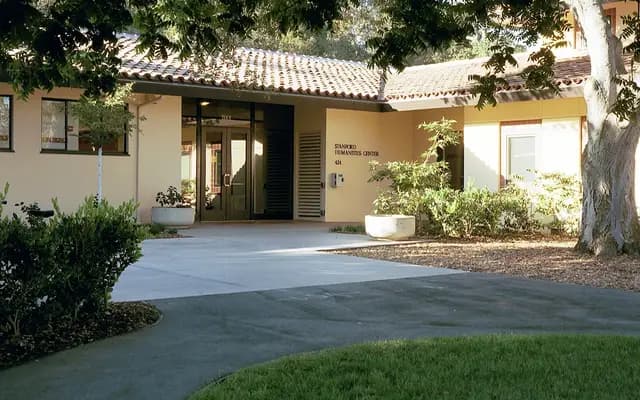
The original uploader was Ratiocinate at English Wikipedia / Wikimedia Commons / "SHC Bowman" / CC BY-SA 3.0
Stanford's Department of Communication conducts research on various forms of media and their societal impact. It explores mass communication processes, media ethics, and the role of media in politics, culture, and society. The department encompasses traditional media such as newspapers and television, as well as emerging platforms like online media and virtual reality. Students are trained as social scientists and media practitioners, with opportunities for individual research using quantitative and qualitative methods. The department offers graduate programs, including a M.A., and Ph.D. The M.A. program focuses on journalism careers, while the Ph.D. program prepares students for teaching and research positions. The John S. Knight Journalism Fellowships support innovative individuals in revolutionizing journalism and combating misinformation.
Stanford University Computer Science school acceptance rate
Stanford University's Computer Science acceptance rate is 16.00%. The average GRE Verbal Reasoning score for Stanford University Computer Science is 162, and the Quantitative Reasoning score is 166.
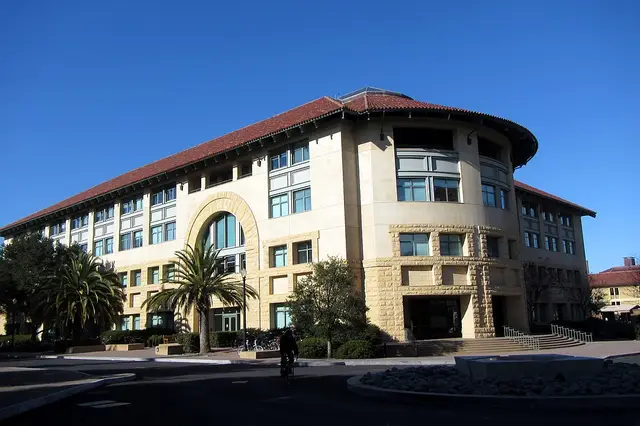
Bohao Zhao / Wikimedia Commons / "Gates Computer Science Building" / CC BY 3.0
Stanford University's M.S. degree in Computer Science is primarily a professional terminal degree, but it also offers a master's degree with distinction in research for students who want to gain research experience before deciding on further studies. The program aims to equip students with the essential knowledge and skills required for a professional career or pursuing a Ph.D. It includes coursework covering foundational elements and specialized areas such as artificial intelligence, biocomputation, and human-computer interaction. The Ph.D. program, on the other hand, focuses on preparing students to make notable contributions in Computer Science through coursework and independent research.
Stanford University Economics school acceptance rate
Stanford University's Economics acceptance rate is 6.10%.
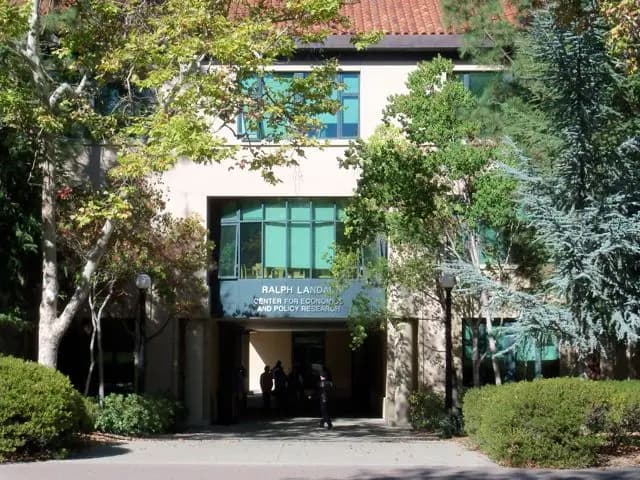
Erp / Wikimedia Commons / "Ralph Landau Building at Stanford University" / CC BY-SA 4.0
Stanford University's Graduate Programs in Economics educate students as research economists, preparing them for academic teaching and economics practice. The curriculum covers modern theory, empirical techniques, and specialized subfields, providing a comprehensive foundation. Students have some flexibility in their course choices, with a predetermined curriculum initially. Strong background in economics, mathematics, and statistics is required for admission. The master's program enhances knowledge and skills for professional careers or further doctoral studies. The Ph.D. program focuses on independent research and making original contributions to economics. The department offers fellowships and assistantships to support students throughout their studies. Stanford's Graduate Programs in Economics provide a rigorous and unique educational experience.
Stanford University Education school acceptance rate
Stanford University's Education acceptance rate is 9.00%. The average GRE Verbal Reasoning score for Stanford University Education is 160, and the Quantitative Reasoning score is 160.
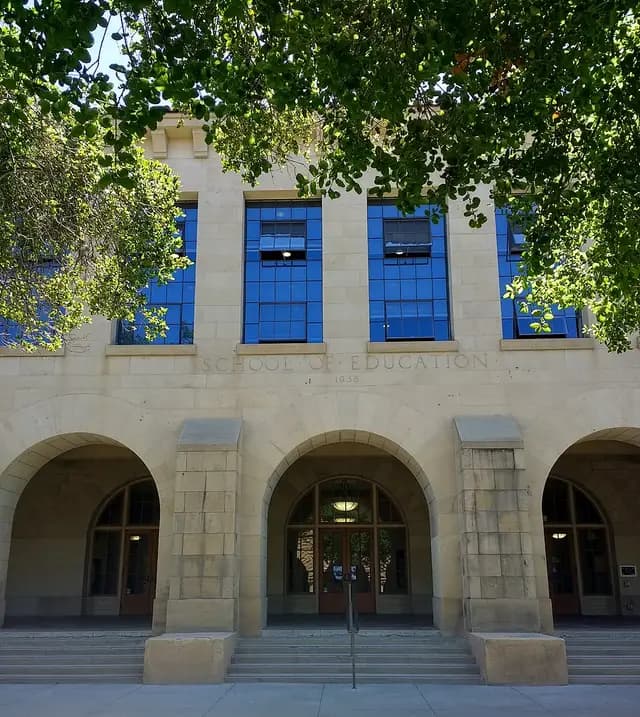
Mx. Granger / Wikimedia Commons / "Stanford Graduate School of Education building" / CC0
Stanford University Graduate School of Education, located in Stanford, California, stands out for its exceptional blend of cutting-edge research and practical application in the field of education. Its locational advantage in the heart of Silicon Valley allows students to tap into a vibrant ecosystem of innovation and entrepreneurship. What sets Stanford's program apart is its emphasis on interdisciplinary collaboration and its commitment to addressing pressing educational challenges. The school's unique offerings include a focus on technology integration, design thinking, and data-driven decision making. Students benefit from engaging with renowned faculty and access to Stanford's extensive network of partnerships, facilitating impactful research and real-world solutions that shape the future of education.

Achievable GRE - $199
Hit your GRE target score on the first try with Achievable's interactive online exam preparation course. Includes everything you need: unlimited quantitative practice questions, an easy-to-understand online textbook, 24 verbal / reading comprehension practice exams, 250 vocabulary words, and unlimited instant essay grading.
Easy-to-understand online textbook
Infinite randomized questions
200+ quant templates
30+ verbal sections
250 vocab words
Unlimited essay grading

Stanford University Electrical Engineering school acceptance rate
Stanford University's Electrical Engineering acceptance rate is 15.30%.
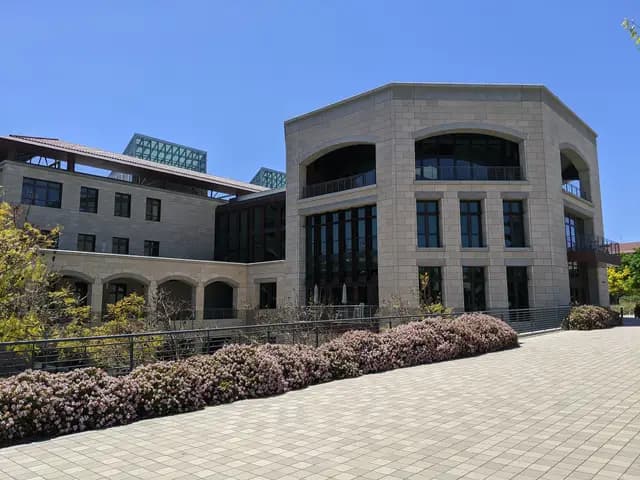
Leijurv / Wikimedia Commons / "Jen-Hsun Huang Engineering Center 3" / CC BY-SA 4.0
The Department of Electrical Engineering at Stanford University is committed to providing academic advising to MS students. The advising process involves collaborative engagement between advisors and students, with a focus on maintaining professionalism and integrity. Upon entering the program, students are assigned a program advisor who helps with course selection and exploring academic and professional opportunities. The same advisor typically stays with the student throughout their master's study. Students can request a change of advisor through the Degree Progress Officer. In addition, the department has a Graduate Teaching Assistant who serves as a peer advisor for course selection. The student services office supports the advising team by providing information on requirements and maintaining records. Graduate students are encouraged to actively seek guidance and be aware of program policies. Furthermore, the department offers scholarships through the Knight-Hennessy Scholars program for high-achieving students pursuing a graduate education in Electrical Engineering at Stanford.
Stanford University Engineering school acceptance rate
Stanford University's Engineering acceptance rate is 13.60%. The average GRE Verbal Reasoning score for Stanford University Engineering is 160, and the Quantitative Reasoning score is 167.

King of Hearts / Wikimedia Commons / "Stanford Oval May 2011" / CC-BY-SA-3.0 / CC BY-SA 3.0
Stanford University's Graduate School of Engineering is unique due to its entrepreneurial culture, Silicon Valley location, and commitment to social impact. The school fosters an entrepreneurial mindset, supporting students and faculty in transforming innovative ideas into practical applications. Situated in Silicon Valley, it benefits from close proximity to tech giants, startups, and venture capital firms, offering unparalleled opportunities for collaboration and industry engagement. Additionally, the school prioritizes social impact, focusing on research and projects that address global challenges such as sustainability, healthcare, and poverty alleviation. These distinct features contribute to Stanford Engineering's reputation as a leading institution that combines innovation, industry connections, and a commitment to making a positive difference in the world.
Stanford University International Relations school acceptance rate
Stanford University's International Relations acceptance rate is 5.00%.

Jawed / Wikimedia Commons / "Stanford University Arches with Memorial Church in the background" / CC BY-SA 4.0
The Master of Arts in Political Science at Stanford University is available only to students pursuing a doctoral degree from another Stanford department or an advanced degree from one of the professional schools like Law, Medicine, or Business. The program aims to provide a dynamic and collaborative environment, with small class sizes for personalized attention and easy interaction with faculty and staff. The curriculum focuses on core policy skills while allowing students to explore their individual interests. The program is housed within the prestigious Freeman Spogli Institute for International Studies (FSI), which conducts top-notch research, engages policymakers, and prepares future leaders. Stanford's entrepreneurial spirit and connections to Silicon Valley offer MIP students unique opportunities for innovation, including programs like Design for Extreme Affordability and Stanford Ignite. MIP Director Francis Fukuyama advocates for new approaches to public problem-solving, which are integrated into the program's curriculum.
Stanford University Journalism school acceptance rate
Stanford University's Journalism acceptance rate is 5.00%.
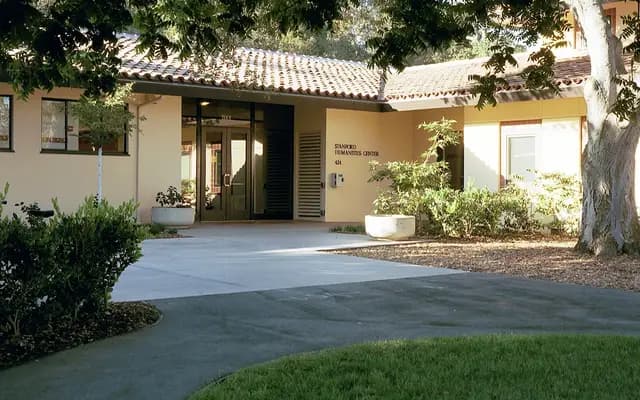
The original uploader was Ratiocinate at English Wikipedia / Wikimedia Commons / "SHC Bowman" / CC BY-SA 3.0
The Stanford Journalism Graduate program transforms journalism by empowering students to produce multimedia, data-driven, and entrepreneurial work influenced by design thinking. With a mission rooted in respect and passion for journalism's core responsibilities in a free society, the program teaches students to uncover, verify, contextualize, and publish truths that inform citizens and hold government institutions accountable. They learn to tell accurate, compelling, and hard-hitting stories while developing tools for discovering important stories and lowering the cost of accountability journalism through data and algorithms. The program aims to advance investigative reporting, foster computational journalism, and prepare students to become future leaders in collaborative journalism communities. Ultimately, their mission is to serve the public's need for factual information in a just and self-governed society, providing a springboard to careers in influential media and technology companies.
Stanford University Law school acceptance rate
Stanford University's Law acceptance rate is 6.30%. The average GRE Verbal Reasoning score for Stanford University Law is 166, and the Quantitative Reasoning score is 160.

King of Hearts / Wikimedia Commons / "Stanford Oval May 2011" / CC BY-SA 3.0
The Stanford University School of Law, located in Stanford, California, is renowned for its exceptional legal education and innovative approach. Founded in 1893, it has a rich historical background that has shaped its prominence. With a stunning campus nestled in the heart of Silicon Valley, it offers students a vibrant environment that merges law and technology. The program boasts an impressive roster of alumni including Chief Justice of the United States William Rehnquist and former Associate Justice Sandra Day O'Connor. Recognized for its rigorous curriculum and faculty expertise, Stanford Law consistently ranks among the top law schools in the United States. It prides itself for its collegial, intimate and egalitarian culture where collaboration and the open exchange of ideas are highly promoted. Students, faculty, staff, alumni — all support and inspire each other to explore, excel and contribute to the world through law.
Stanford University Math school acceptance rate
Stanford University's Math acceptance rate is 3.95%.
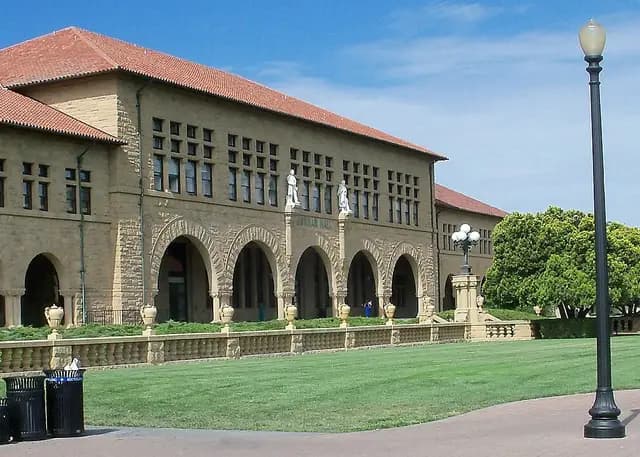
Emma Pease / Wikimedia Commons / "Jordan Hall, Stanford University" / CC BY-SA 4.0
The Department of Mathematics at Stanford University, situated in Stanford, California, is renowned both nationally and internationally for its exceptional contributions to the field of mathematics. Recognized as a leading institution, it offers esteemed programs, seminars, journals, and outreach initiatives to its graduate and doctoral students every year. The department holds a prominent position as one of the top six math PhD programs in the United States, often referred to as the "first tier," alongside prestigious universities such as Harvard, Princeton, MIT, UC Berkeley, and UChicago. Consequently, it attracts a substantial number of highly accomplished American and international students seeking to pursue their mathematical studies in the United States.
Stanford University Mechanical Engineering school acceptance rate
Stanford University's Mechanical Engineering acceptance rate is 15.30%.
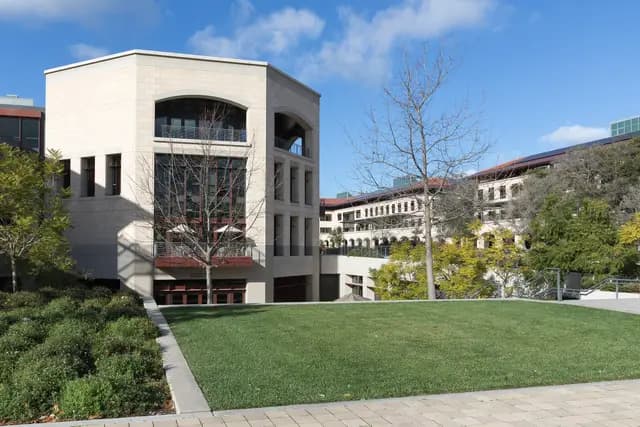
Frank Schulenburg / Wikimedia Commons / "Jen-Hsun Huang Engineering Center in 2016" / CC BY-SA 4.0
Stanford University's graduate program in Mechanical Engineering combines coursework and research for specialized areas. Specializations include automatic controls, energy systems, fluid mechanics, heat transfer, solid mechanics, biomechanical engineering, MEMS, and design. Stanford consistently ranks highly in post-graduate Mechanical Engineering studies. The program offers a Master of Science (MS) in Mechanical Engineering, and an MS in Engineering with specializations in Biomechanical Engineering, Design Impact, or an individually designed major. Post-master's degrees in Engineering and a Doctor of Philosophy (PhD) are also available. Students receive one-on-one mentoring from leading faculty in technological innovation.
Stanford University Medicine school acceptance rate
Stanford University's Medicine acceptance rate is 1.40%.
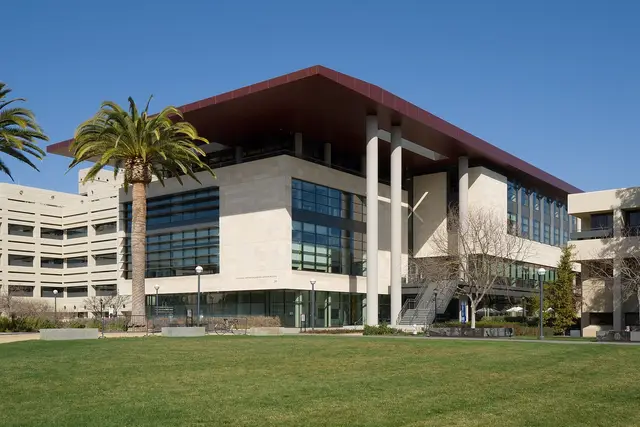
LPS.1 / Wikimedia Commons / "Stanford School of Medicine Li Ka Shing Center" / CC0
The Stanford University School of Medicine, known for its excellence and innovation, stands as a prominent institution in medical education. Renowned for its cutting-edge research and collaborative approach, the program attracts top-notch faculty and students alike. Stanford Medicine's unique curriculum combines rigorous scientific training with hands-on clinical experience, preparing students to tackle complex healthcare challenges. The school's proximity to Silicon Valley offers a distinct advantage, fostering collaborations with technology and biomedical companies for groundbreaking advancements. Stanford Medicine consistently ranks among the top medical schools, with notable recognition in areas like biomedical research and primary care. With a commitment to diversity, inclusion, and a patient-centered approach, Stanford University School of Medicine continues to shape the future of healthcare through its unwavering pursuit of excellence.
Stanford University Physics school acceptance rate
Stanford University's Physics acceptance rate is 5.10%.
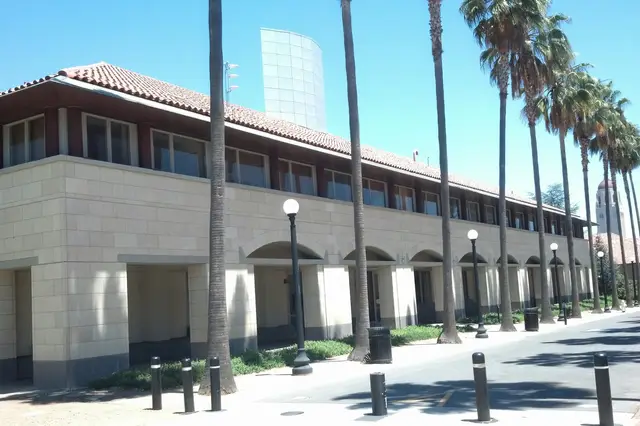
Cullen328 / Wikimedia Commons / "Stanford Physics and Astrophysics" / CC BY-SA 3.0
Stanford University offers outstanding research opportunities for graduate students in the field of Physics. They can engage in cutting-edge research in various departments and schools, such as Physics and Applied Physics, Particle Physics & Astrophysics, Photon Sciences, Engineering, and Medicine. In addition to research, students benefit from a comprehensive academic experience that includes coursework, seminars, teaching roles, and student-led activities. The university emphasizes the importance of maintaining a healthy balance between academic and social commitments, encouraging students to participate in various recreational and community-oriented activities. The Physics Department at Stanford fosters a close-knit community, organizing numerous social events and providing a supportive and stimulating environment for its diverse student body.
Stanford University Psychology school acceptance rate
Stanford University's Psychology acceptance rate is 5.10%.
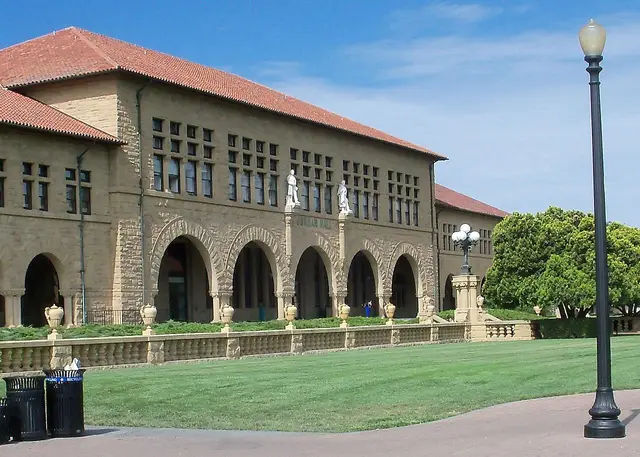
Emma Pease / Wikimedia Commons / "Jordan Hall, Stanford University" / CC BY-SA 4.0
Stanford University's Graduate degree in Psychology boasts a rich history and esteemed reputation within the field. The program delves deep into five main areas of study, including cognitive, developmental, and social psychology, as well as affective science and neuroscience. Its primary goal is to expand students' understanding and expertise in Psychology, equipping them for successful careers or further doctoral studies. To accomplish this, the program entails a comprehensive curriculum comprising specialized courses and independent research projects. The master's program exclusively caters to Ph.D. candidates in Psychology, though exceptions may be made for students enrolled in other graduate programs at the university. The Ph.D. program emphasizes extensive scholarship, independent research, and analytical abilities to enable students to generate original contributions to Psychology's body of knowledge and effectively disseminate such insights.
Syracuse University Journalism school acceptance rate
Syracuse University's Journalism acceptance rate is 65%.
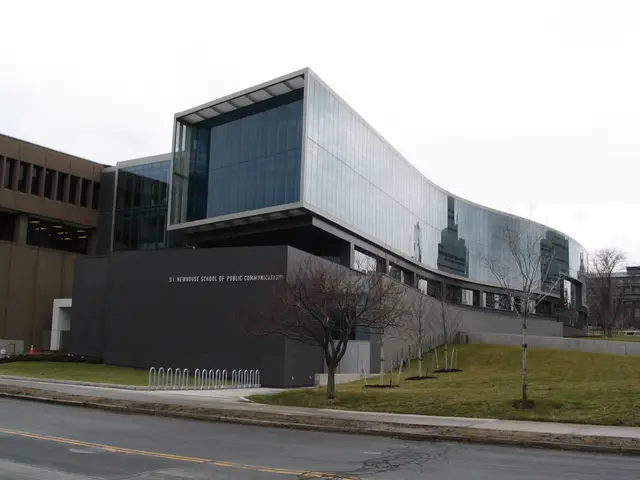
ZeWrestler / Wikimedia Commons / "Newhouse Communications Center III, Syracuse University" / Public domain
The Newhouse School's broadcast and digital journalism program equips individuals with the necessary tools to become part of the crucial free press in today's society. Additionally, graduate students can participate in the Washington Capstone, which offers a summer experience working in the nation's capital and serves as the culmination of their master's program. Newhouse alumni have found success worldwide, holding various roles such as anchors, multimedia journalists, meteorologists, producers, and on-air reporters. Furthermore, students in the program have garnered recognition and accolades in collegiate broadcast competitions for their exceptional radio and television stories. NCC News, the multimedia website of the Newhouse School, features student reporters who cover the latest news in Central New York.
Teachers College, Columbia University Education school acceptance rate
Teachers College, Columbia University's Education acceptance rate is 51.00%. The average GRE Verbal Reasoning score for Teachers College, Columbia University Education is 156, and the Quantitative Reasoning score is 155.
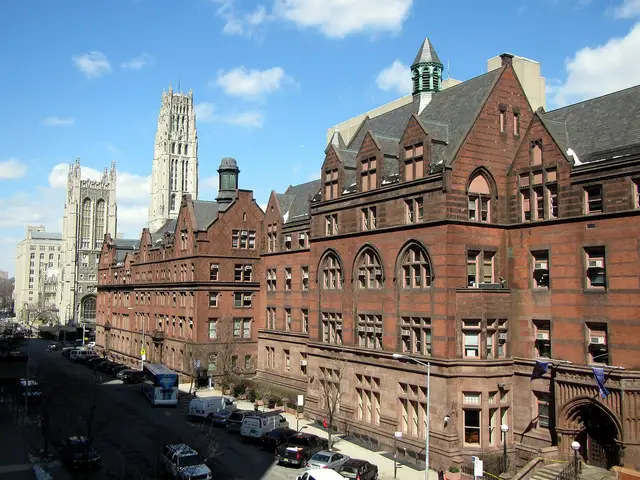
Bohao Zhao / Wikimedia Commons / "Teachers College of Columbia University" / CC BY 3.0
Teachers College, Columbia University Graduate School of Education stands out for several reasons. Firstly, it has a long and prestigious history, being established in 1887 as the first graduate school of education in the United States. This historical significance contributes to its strong reputation and influence in the field. Additionally, Teachers College is known for its commitment to innovation and research. It houses a diverse range of programs and centers that focus on various aspects of education, including psychology, health education, technology, and international education. This multidisciplinary approach allows students to explore different areas of interest and collaborate with experts from various fields. Teachers College also places a strong emphasis on practical experience and engagement with real-world educational settings, providing students with valuable hands-on opportunities to apply their knowledge and skills. Lastly, the school has a vibrant and diverse community, attracting students and faculty from all over the world, fostering a rich intellectual and cultural environment.
Texas A&M University, College Station Engineering school acceptance rate
Texas A&M University, College Station's Engineering acceptance rate is 38.00%. The average GRE Verbal Reasoning score for Texas A&M University, College Station Engineering is 152, and the Quantitative Reasoning score is 163.
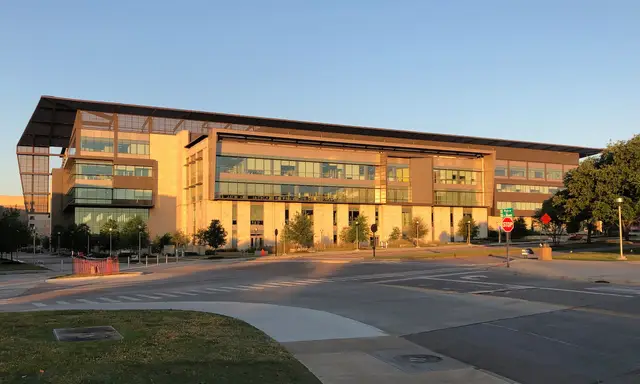
Jasonanaggie / Wikimedia Commons / "Zachry Engineering Education Complex" / CC BY-SA 4.0
The graduate program at the Ingram School of Engineering (ISoE) offers a multidisciplinary education with a focus on academic depth and industry-driven application. Students engage in cutting-edge research projects, gain certifications, and attend training sessions to stay at the forefront of the industry. The ISoE maintains Industrial Advisory Boards to ensure the curriculum remains relevant and meets industry demands. Graduates can pursue careers in various sectors or continue to doctoral studies. The program boasts distinguished alumni employed by companies such as Amazon, AMD, Intel, Lockheed Martin, NXP Semiconductors, Raytheon Technologies, Samsung, and Tesla. Faculty conduct innovative research in areas like sustainable energy, smart manufacturing, machine learning, healthcare, infrastructure, and smart cities.
The New School Interior Design school acceptance rate
The New School's Interior Design acceptance rate is 45.00%.

Ajay Suresh from New York, NY, USA / Wikimedia Commons / "Fanton Hall (Milano School of International Affairs, Management, and Urban Policy)" / CC BY 2.0
The MFA Interior Design program at Parsons is a leading program that emphasizes the role of design as a social practice. It builds on Parsons' century-long history in interior design education and offers a future-focused approach that integrates sustainable design strategies with new technology and materials. The program encourages students to imagine new possibilities for habitable space and provides access to a distinguished faculty of practicing professionals. Located in New York City, the program utilizes the city as a learning laboratory and leverages Parsons' connections to design firms, manufacturers, galleries, and museums. Students also have the opportunity for interdisciplinary collaboration with other related graduate programs. Additionally, there is an option to pursue a double major in Interior Design and Lighting Design for a comprehensive understanding of light and interior space.
Tufts University International Relations school acceptance rate
Tufts University's International Relations acceptance rate is 11.00%.
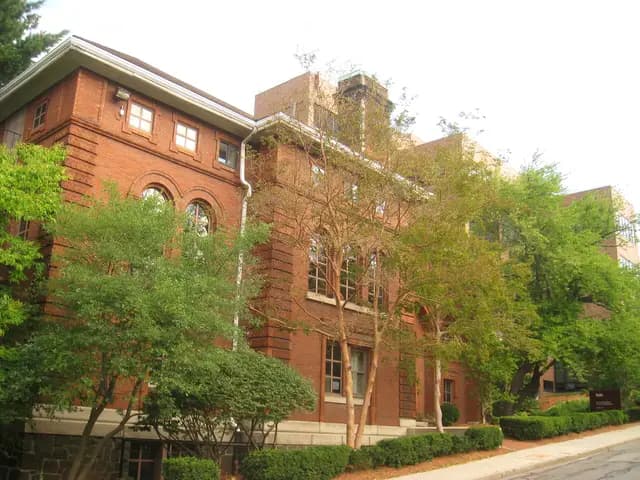
Daderot / Wikimedia Commons / "Fletcher School of Law and Diplomacy - Tufts University" / Public domain
Tufts University's faculty and students collaborate to tackle global challenges and promote a more just world. With a strong grasp of the changing global landscape and specialized skills, scholars prepare for careers in government, diplomacy, and related fields. The university's international relations program spans multiple campuses and encompasses multidisciplinary research, offering dual degrees and joint programs. The esteemed Fletcher School engages in impactful research that addresses economic development, security, sustainability, and humanitarian issues. International Relations graduates find employment in diverse sectors like humanitarian aid, international law, and global technology. With a 95% employment rate and numerous alumni working for the UN or as ambassadors, Tufts cultivates successful professionals. The university also fosters a supportive environment for graduate students to pursue their academic and professional goals, fostering personal growth and a well-rounded education.
University of California, Berkeley Biomedical Engineering school acceptance rate
University of California, Berkeley's Biomedical Engineering acceptance rate is 31.20%.
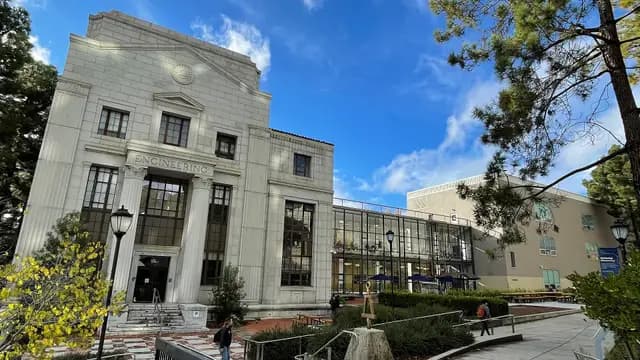
Pillsmarch / Wikimedia Commons / "UC Berkeley College of Engineering, McLaughlin Hall" / CC BY-SA 4.0
The Master of Engineering in Bioengineering at Berkeley is a comprehensive program designed to equip students with the skills and knowledge necessary for leadership roles in the biotech industry. The 10-month program focuses on practical problem-solving, core management concepts, and technical expertise through an integrated engineering and business curriculum. Students have the opportunity to tackle real industry challenges through case studies and a capstone project. The program also offers specialized career services and access to world-class faculty and industry mentors. Students can choose from seven cutting-edge technical concentrations, including General Bioengineering, Biomedical Engineering Design, Biomedical Imaging, Biomaterials & Biomedical Devices, Mechanobiology, Bioinformatics & Computational Biology, and Synthetic Biology.
University of California, Berkeley Chemical Engineering school acceptance rate
University of California, Berkeley's Chemical Engineering acceptance rate is 8.88%.

Firstcultural / Wikimedia Commons / "UC-Berkeley-018-college-of-chemistry" / CC0
The graduate program in chemical and biomolecular engineering at Berkeley offers students the opportunity to engage in original research in applied science. They can pursue a Ph.D. or an M.S. degree, with the latter requiring 24 semester units. At least 12 units must be 200-level courses in Chemical Engineering, and the remaining 12 units can be chosen from upper-division/graduate electives. Although research is not mandatory, students can opt for research credits. A comprehensive exam is conducted at the end of the first semester, testing knowledge in transport phenomena, kinetics, and thermodynamics. The program focuses on core courses, and collaboration between students and faculty is encouraged.
University of California, Berkeley Chemistry school acceptance rate
University of California, Berkeley's Chemistry acceptance rate is 9.30%.

Firstcultural / Wikimedia Commons / "UC-Berkeley-018-college-of-chemistry" / CC0
The Chemistry PhD program prioritizes the development of creative scientific research skills in its students. The main focus of the curriculum is the individual research project, which allows students to engage in independent study. Course requirements are minimal and tailored by advisors to best prepare students for their chosen research field. The program offers concentrations in Physical Chemistry, Synthetic Chemistry, and Chemical Biology, each with specific degree requirements. Students select their research projects after consulting with faculty members and conducting literature reviews. The program includes independent study, seminars covering various topics, a qualifying exam, and teaching assistantships. Financial aid in the form of stipends, tuition waivers, and insurance coverage is provided to all admitted students.
University of California, Berkeley Civil Engineering school acceptance rate
University of California, Berkeley's Civil Engineering acceptance rate is 17.00%.
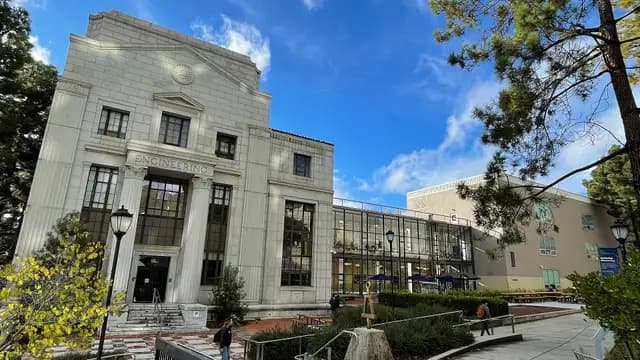
Pillsmarch / Wikimedia Commons / "UC Berkeley College of Engineering, McLaughlin Hall" / CC BY-SA 4.0
The UC Berkeley Department of Civil and Environmental Engineering (CEE) is a global leader in addressing societal challenges through engineering solutions. They conduct cutting-edge research in crucial areas like buildings, energy, transportation, and water systems, emphasizing resilience against hazards like earthquakes and floods. Adapting infrastructure to changing weather and climate conditions is a key focus. CEE is dedicated to developing future engineering leaders and advancing the intellectual foundations of new fields. The department fosters an inclusive community that values innovation, creative curricula, effective teaching, academic mentoring, and access to education for students from diverse backgrounds. CEE's national and international reputation is evident in its consistently top-ranked graduate programs in civil and environmental engineering.
University of California, Berkeley Computer Science school acceptance rate
University of California, Berkeley's Computer Science acceptance rate is 3.40%. The average GRE Verbal Reasoning score for University of California, Berkeley Computer Science is 166, and the Quantitative Reasoning score is 157.
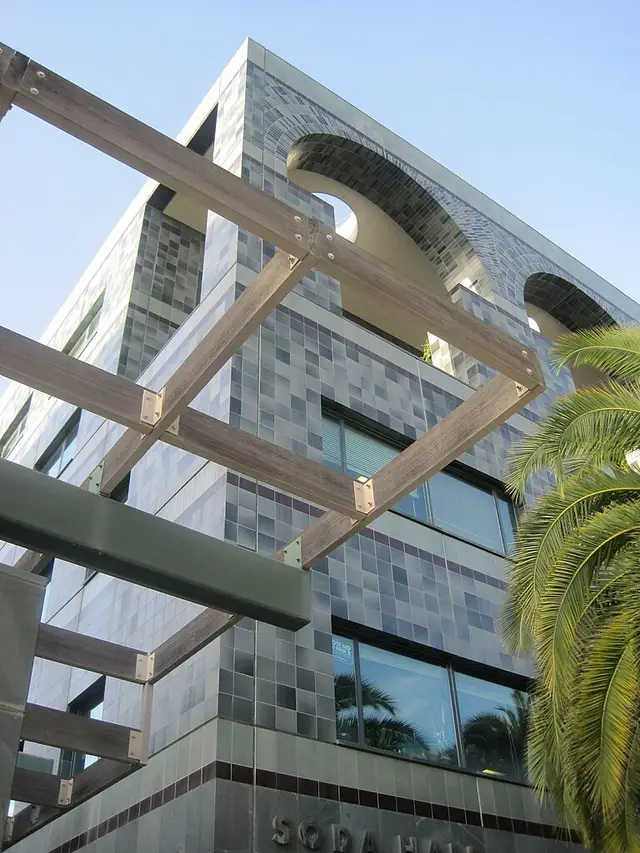
Broken Sphere / Wikimedia Commons / "Soda Hall exterior" / CC BY-SA 3.0
UC Berkeley's Electrical Engineering and Computer Sciences (EECS) department is the first and one of a very few computer sciences departments in the world that is unified with electrical engineering. It boasts a prestigious ranking among global EE and CS departments, combining the fields seamlessly. The department's faculty consists of renowned researchers and educators, as well as up-and-coming talents. They are dedicated to providing holistic education and mentorship to undergraduate and graduate students while fostering a welcoming and diverse environment. UC Berkeley prides itself on being a hub of innovation and collaboration, where faculty and researchers develop groundbreaking projects. The department encourages individuals to join their community as students, visitors, or financial supporters, and highlights their commitment to education, creation, and service.
University of California, Berkeley Economics school acceptance rate
University of California, Berkeley's Economics acceptance rate is 2.50%.
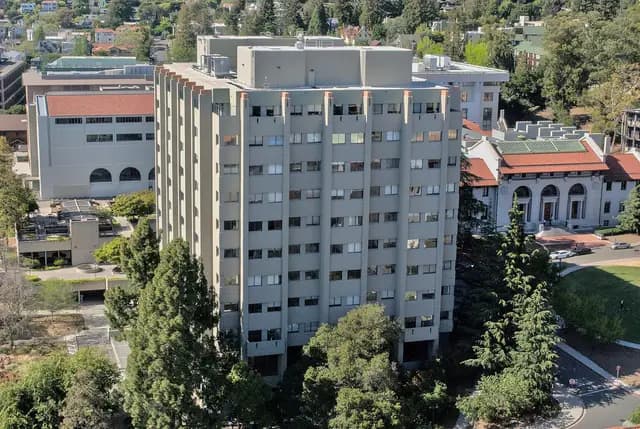
Gabriel Classon (gabeclasson on Flickr) / Wikimedia Commons / "Evans Hall from Sather Tower (52081220749)" / CC BY 2.0
The Master of Economics program at the University of California, Berkeley is highly regarded for its comprehensive study of economics. Known for its global reputation, the university attracts a significant number of international students seeking to pursue this course. What sets studying at the University of California, Berkeley apart is its commitment to providing exceptional education quality, extensive practical learning opportunities, and ample work prospects for international students. The program equips students with the necessary skills to conduct extensive research in the field of economics. With an interactive curriculum, abundant research opportunities, and a distinguished faculty, students can expect a transformative learning experience. Choosing the MS Degree in Economics at the University of California, Berkeley allows students to delve deep into the subject and develop analytical expertise.
University of California, Berkeley Electrical Engineering school acceptance rate
University of California, Berkeley's Electrical Engineering acceptance rate is 3.70%.
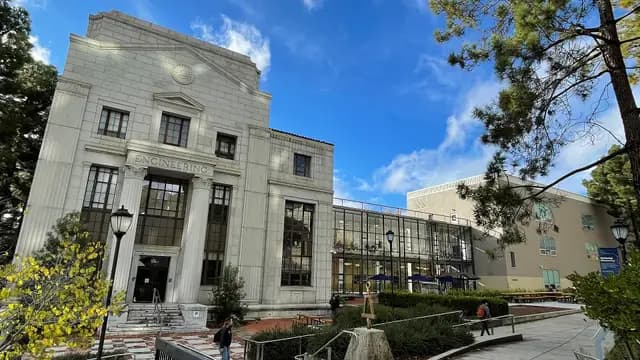
Pillsmarch / Wikimedia Commons / "UC Berkeley College of Engineering, McLaughlin Hall" / CC BY-SA 4.0
The M.Eng. in EECS program at Berkeley is a top-notch graduate program that offers innovative courses in scientific and technical subjects. It recognizes that success in engineering requires skills beyond just scientific knowledge. In today's engineering organizations, teamwork, effective communication (both oral and written), and understanding user needs are crucial. The program prepares students for these real-world challenges by offering a curriculum that covers multidisciplinary development, complex system considerations, and strategic relationships. Students learn from exceptional faculty and interact with a diverse student body. The full-time program spans one academic year, with classes held on the Berkeley campus. Small class sizes promote interaction, and career services support networking and placement opportunities for students. Graduates are well-prepared for rewarding careers in engineering design, development, and management.
University of California, Berkeley Engineering school acceptance rate
University of California, Berkeley's Engineering acceptance rate is 25.20%. The average GRE Verbal Reasoning score for University of California, Berkeley Engineering is 158, and the Quantitative Reasoning score is 168.
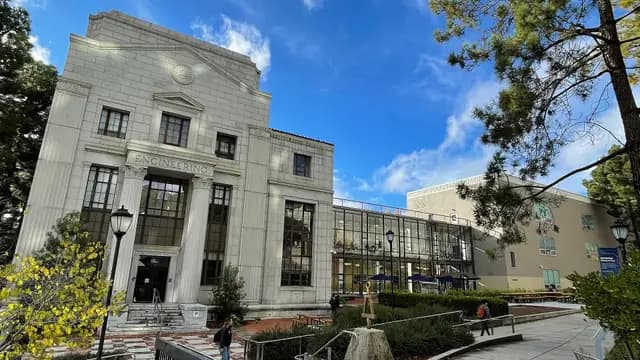
Pillsmarch / Wikimedia Commons / "UC Berkeley College of Engineering, McLaughlin Hall" / CC BY-SA 4.0
Studying at the University of California, Berkeley Graduate School of Engineering offers a transformative experience through rigorous academic programs, interdisciplinary collaboration, and cutting-edge research opportunities. The school's engaging faculty, hands-on learning approach, and emphasis on entrepreneurship and innovation create a vibrant academic environment. Located in the heart of the Bay Area, students benefit from industry partnerships and networking opportunities. The collaborative culture, diverse community, and vibrant campus life contribute to a well-rounded college experience. Overall, Berkeley Engineering equips students with the knowledge, skills, and experiences to make a significant impact in the field of engineering and address global challenges.
University of California, Berkeley Interior Design school acceptance rate
University of California, Berkeley's Interior Design acceptance rate is 20%.
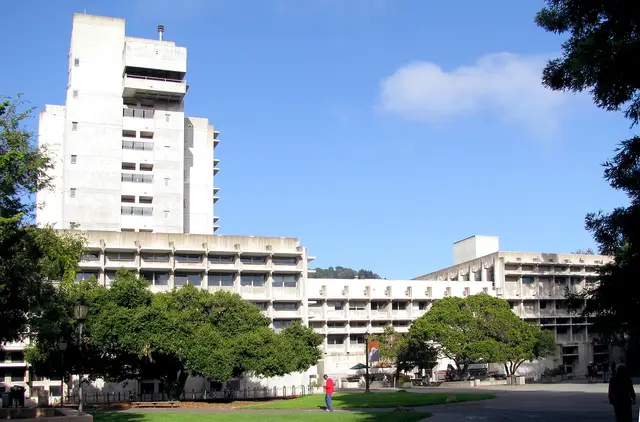
Michael S Bergin / Wikimedia Commons / "UC Berkeley Wurster Hall" / CC BY-SA 3.0
Berkeley College's Interior Design Certificate Program is designed to equip students with the essential skills and knowledge required in the field of interior design. The program offers a comprehensive education that combines studio courses with the study of design theory and history. Students will learn drafting, freehand sketching and rendering, color theory and composition, as well as computer-aided design using software such as AutoCAD, Sketch-up, and Photoshop. The curriculum also covers materials, textiles, and finishes. The program is available at Berkeley College's Paramus and Woodland Park campuses, as well as online. A bachelor's degree in any field is required for registration, and successful completion of the program can provide educational credits necessary for the California Council for Interior Design Certification exam and the National Council for Interior Design Qualification certification exam.
University of California, Berkeley Journalism school acceptance rate
University of California, Berkeley's Journalism acceptance rate is 16.82%.

Gabriel Classon (gabeclasson on Flickr) / Wikimedia Commons / "North Gate Hall, UC Berkeley" / CC BY 2.0
Berkeley Journalism boasts faculty who are mentors, teaching and inspiring the next generation of journalists. Their students are vibrant, diverse, and driven, eager to report stories that matter in any medium. The accomplished alumni lead the way for current students, producing award-winning work. Berkeley Journalism emphasizes hands-on learning, offering platforms for audio, documentary, multimedia, and more. Located in the Bay Area near Silicon Valley, Napa Valley, and cultural activities in Berkeley, it provides an ideal setting. Diversity is a priority, with financial support for underrepresented minority students and collaboration with organizations promoting inclusivity in journalism.
University of California, Berkeley Law school acceptance rate
University of California, Berkeley's Law acceptance rate is 13.70%. The average GRE Verbal Reasoning score for University of California, Berkeley Law is 160, and the Quantitative Reasoning score is 160.
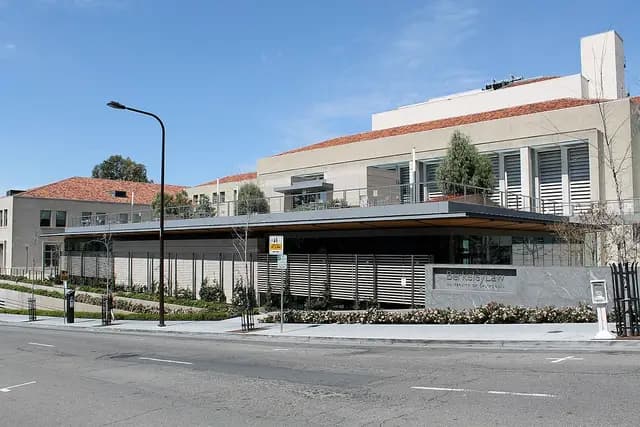
Patrick Nouhailler's / Wikimedia Commons / "UC Berkeley School of Law" / CC BY-SA 3.0
The University of California, Berkeley School of Law, founded in 1894, stands as one of the nation's preeminent law schools. Located in Berkeley, California, its distinguished history and exceptional academic programs have earned it a prominent reputation. The school is renowned for its commitment to public service, social justice, and activism. More specifically, it has a very strong Intellectual Property program, a well-known Environmental Law program, and is expanding its Social Justice program and its Clinical programs. Boasting top-tier faculty, it offers a comprehensive curriculum that emphasizes interdisciplinary studies and experiential learning opportunities. UC Berkeley School of Law consistently ranks among the best law schools in the United States and is also widely known for its research facilities.
University of California, Berkeley Math school acceptance rate
University of California, Berkeley's Math acceptance rate is 8.40%.
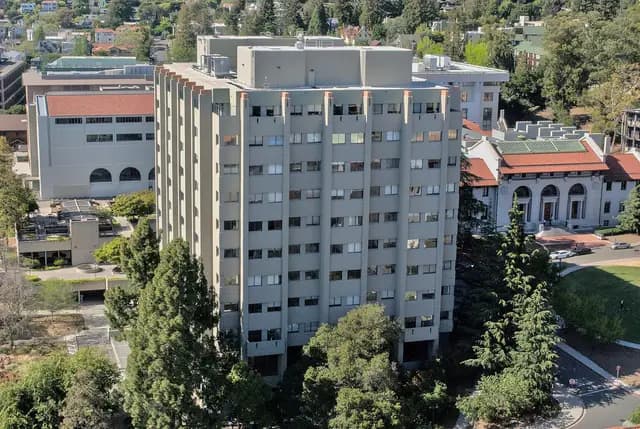
Gabriel Classon (gabeclasson on Flickr) / Wikimedia Commons / "Evans Hall from Sather Tower (52081220749)" / CC BY 2.0
The University of California, Berkeley Graduate School of Mathematics (UC Berkeley Math) stands out for its academic excellence, rich history, and notable achievements. Renowned for its rigorous programs, UC Berkeley Math consistently ranks among the top mathematics departments globally. Its diverse research areas encompass various mathematical disciplines, fostering collaboration and innovation. The department's exceptional faculty, including renowned mathematicians, provide mentorship and engage in cutting-edge research. UC Berkeley Math alumni have made significant contributions in academia, industry, and beyond. With a collaborative environment, notable alumni like Fields Medalists Shing-Tung Yao and William Thurston, and top rankings, UC Berkeley Math remains a world leader in mathematics education and research.
University of California, Berkeley Mechanical Engineering school acceptance rate
University of California, Berkeley's Mechanical Engineering acceptance rate is 12.54%.
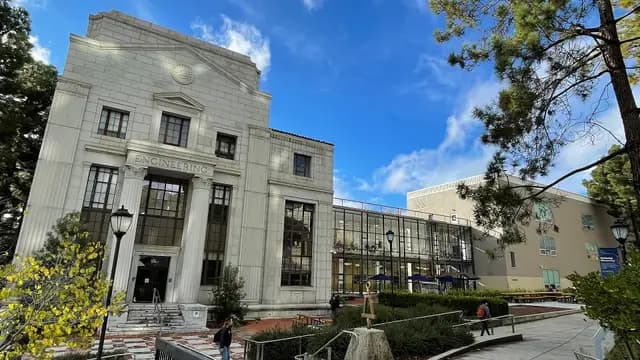
Pillsmarch / Wikimedia Commons / "UC Berkeley College of Engineering, McLaughlin Hall" / CC BY-SA 4.0
The Department of Mechanical Engineering at the University of California, Berkeley offers various graduate degree programs that provide students with a strong foundation in mechanical engineering. Graduates from Berkeley's program are well-prepared to compete in the field and have reported successful careers in engineering practice, management, research, academia, and government. The university offers a vibrant educational and cultural atmosphere, situated near the natural beauty of northern California. The Master of Engineering program is a one-year accelerated program that combines engineering coursework with classes in leadership and management. Students work on industry challenges through case studies and a capstone project. Small classes promote interaction and networking opportunities with peers, teachers, and industry collaborators, and additional services such as career advising and alumni connections are available.
University of California, Berkeley Physics school acceptance rate
University of California, Berkeley's Physics acceptance rate is 5.50%.

Sanfranman59 / Wikimedia Commons / "LeConte Hall (Berkeley, CA)" / CC BY-SA 3.0
The Department of Physics at the University of Berkeley offers graduate programs leading to a PhD degree. Students can also apply for an MA degree while on their path to a PhD, but the department does not accept applications from students solely interested in the MA degree. In some cases, students may pursue a terminal MA degree. The PhD program emphasizes research, covering various areas of theoretical and experimental physics such as astrophysics, cosmology, atomic physics, biophysics, condensed matter, and more. The Lawrence Berkeley National Laboratory provides additional research opportunities in fields like astrophysics, nuclear physics, and materials science. The university promotes diversity and offers support to students from all backgrounds. They aim to create a welcoming environment through weekly events, seminars, and social gatherings. Berkeley's PhD recipients go on to become leaders in academia and industry.
University of California, Berkeley Psychology school acceptance rate
University of California, Berkeley's Psychology acceptance rate is 2.92%.
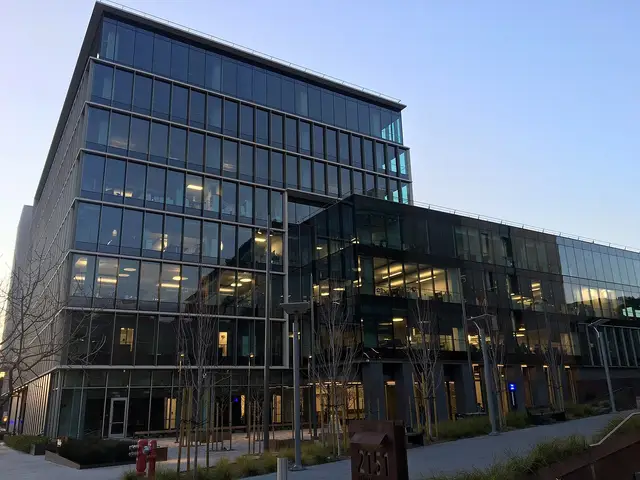
Syghost / Wikimedia Commons / "Berkeley Way West" / CC BY-SA 4.0
The graduate program in Psychology at Berkeley aims to produce scholar-researchers who possess both a broad perspective and deep understanding of the field. The department is divided into six training units, each with its own requirements, including courses, seminars, and supervised research. Students are encouraged to take advantage of the diverse faculty expertise across the Berkeley campus by enrolling in courses outside the Psychology Department. The program is STEM designated and emphasizes the development of methodological, statistical, and critical thinking skills relevant to all areas of psychology research. The department's research areas encompass Behavioral and Systems Neuroscience, Clinical Science, Cognition, Cognitive Neuroscience, Developmental, and Social-Personality Psychology.
University of California, Berkeley (Haas) Business school acceptance rate
University of California, Berkeley (Haas)'s Business acceptance rate is 7.57%. The average GRE Verbal Reasoning score for University of California, Berkeley (Haas) Business is 161, and the Quantitative Reasoning score is 163. The average GMAT score for University of California, Berkeley (Haas) Business is 729.
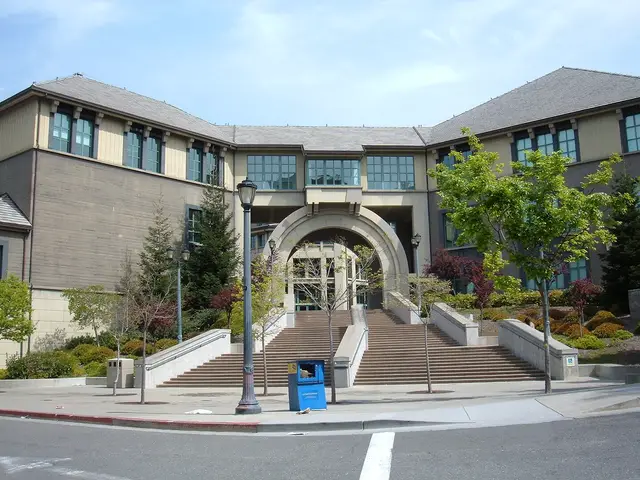
Broken Sphere / Wikimedia Commons / "Haas School of Business west entrance" / CC BY-SA 3.0
Haas School of Business, part of the University of California, Berkeley, has established itself as a pioneering institution in business education since its founding in 1898. With its unique location in the dynamic San Francisco Bay Area, Haas benefits from a vibrant ecosystem of entrepreneurship and technological innovation. The school's culture is defined by collaboration, leadership, and a strong sense of community. Its rigorous academic programs, led by esteemed faculty, equip students with practical skills and knowledge to thrive in a rapidly evolving business landscape. The school also offers student housing in Berkeley to support its students. Notably, Haas boasts exceptional career outcomes, with 95% of graduates securing employment within three months of graduation. With a focus on innovation, inclusivity, and social impact, Haas leaves a lasting impression by nurturing influential leaders who shape the future of business.
University of California, Irvine Accounting school acceptance rate
University of California, Irvine's Accounting acceptance rate is 30.00%.

TFNorman at English Wikipedia / Wikimedia Commons / "Jack Langson Library at UC Irvine is one of the eight original buildings on the campus, designed by architect William Pereira in 1965." / Public domain
The Merage School's MPAc program is designed for graduates and career changers in accounting. The curriculum combines technical mastery with career development to ensure students are prepared for successful accounting careers. The program offers a Summer Intensive option for non-accounting majors. It is STEM-designated and allows eligible students to apply for up to 36 months of OPT, making it attractive to international students seeking immigration sponsorship. Qualified California residents can benefit from a $10,000 scholarship. The program boasts a strong full-time employment rate within six months of graduation. Located in Irvine, the UC Irvine campus provides access to industry hubs and features highly regarded faculty known for their teaching excellence.
University of California, Irvine Education school acceptance rate
University of California, Irvine's Education acceptance rate is 47.30%. The average GRE Verbal Reasoning score for University of California, Irvine Education is 153, and the Quantitative Reasoning score is 153.
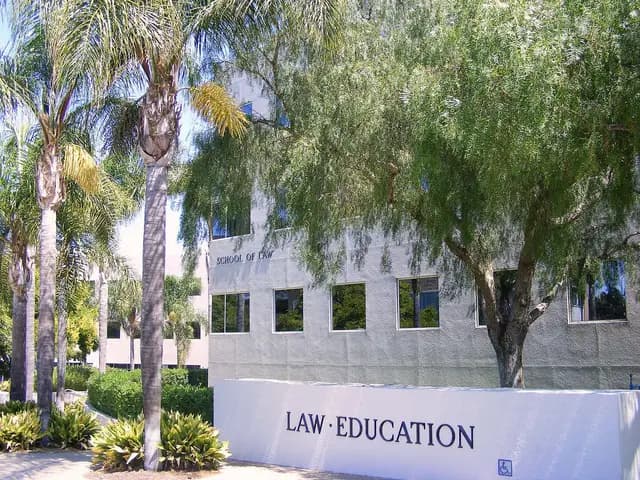
Mathieu Marquer from Paris, FRANCE / Wikimedia Commons / "UC Irvine Law and Education complex" / CC BY-SA 2.0
The UCI School of Education is committed to improving educational opportunities and outcomes for individuals of all ages. With a focus on research, community partnerships, and innovative programming, the school has become a diverse, dynamic, and collaborative institution. Faculty members are internationally recognized researchers, securing grants exceeding $96 million. The school offers master's and doctoral degrees, including a STEM teaching credential program. Community partnerships like OCEAN and the UCI Teacher Academy exemplify the school's commitment to engagement. Led by Dean Frances Contreras, the school prioritizes equity, diversity, and racial justice. U.S. News & World Report ranks it among the top schools of education nationally.
University of California, Los Angeles Architecture school acceptance rate
University of California, Los Angeles's Architecture acceptance rate is 22.00%.

Josh Lee / Wikimedia Commons / "Lecture Room Perloff Hall" / CC BY-SA 3.0
The UCLA Graduate School of Architecture is among the top graduate schools for architecture due to its academic excellence, innovative approach, and location advantage. With a rigorous curriculum and renowned faculty, it offers a high-quality education. The school's emphasis on innovation and pushing the boundaries of traditional practices prepares graduates for evolving challenges. Located in Los Angeles, students benefit from exposure to diverse architectural styles and a thriving design scene. The program encourages interdisciplinary collaboration, fostering holistic thinking and innovative problem-solving. Notable alumni and recognition further establish its reputation. These factors contribute to UCLA's position as a leading institution for architectural education.
University of California, Los Angeles Communications school acceptance rate
University of California, Los Angeles's Communications acceptance rate is 20.00%.
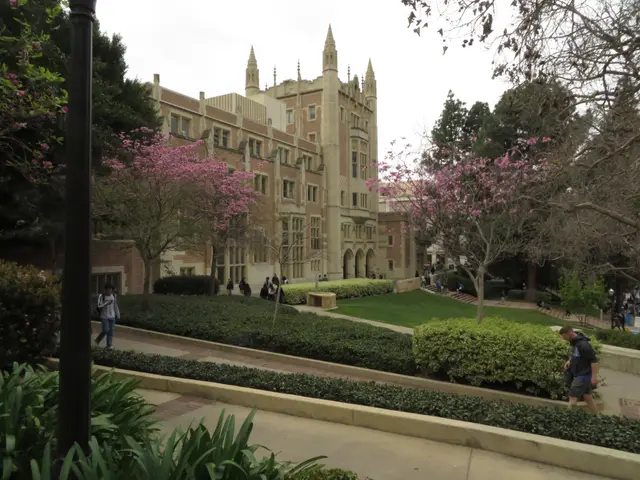
Logan Ward / Wikimedia Commons / "The front lawn of Kerckhoff Hall, as seen in Legally Blonde." / CC BY 2.0
Studying at the University of California, Los Angeles (UCLA) graduate school of communication offers a unique experience. It focuses on a specialized Ph.D. program in Communication, allowing students to earn an M.S. degree alongside their Ph.D. studies. Personalized academic advising is provided by faculty advisors, ensuring tailored guidance and support. The graduate advisor offers counseling on program requirements, policies, and regulations. The department emphasizes monitoring and evaluating student progress, with annual summaries reviewed by faculty. This feedback helps students identify areas for improvement. Overall, UCLA's graduate school of communication offers specialized programs, personalized advising, and a focus on student progress, creating a distinct and enriching educational experience.
University of California, Los Angeles Education school acceptance rate
University of California, Los Angeles's Education acceptance rate is 44.30%. The average GRE Verbal Reasoning score for University of California, Los Angeles Education is 156, and the Quantitative Reasoning score is 157.
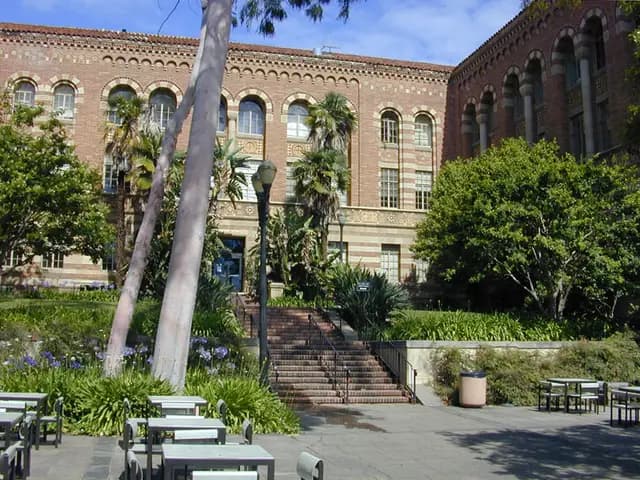
Ucla90024 / Wikimedia Commons / "Moore Hall West Side" / CC BY 3.0
The University of California-Los Angeles (UCLA) Graduate School of Education is renowned for its exceptional academic programs and contributions to the field of education. The school places a special emphasis on addressing social justice issues and preparing educators who can effectively serve diverse student populations. UCLA's Graduate School of Education stands out for its interdisciplinary approach, fostering collaborations with various departments and programs within the university to explore innovative solutions to educational challenges. The program offers a unique blend of theoretical knowledge and practical experience, providing students with opportunities for hands-on learning and impactful community engagement. With a strong emphasis on interdisciplinary collaboration and cutting-edge research, the UCLA Graduate School of Education stands out as a memorable and special institution within the field of education.
University of California, Los Angeles Math school acceptance rate
University of California, Los Angeles's Math acceptance rate is 14.00%.
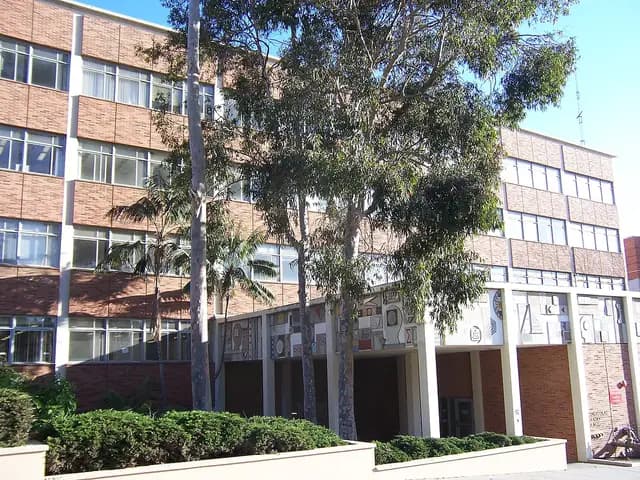
Oleg Alexandrov / Wikimedia Commons / "UCLA Mathematical Sciences Building II" / Public domain
UCLA's Mathematics Department is renowned for its exceptional faculty, top-ranked graduate program, and diverse undergraduate majors. The department houses the Curtis Center, dedicated to mathematical education and K-12 outreach activities. It maintains strong ties with the nearby Institute for Pure and Applied Mathematics. UCLA Math excels in both pure and applied mathematics, ranking #2 in the nation for applied math research. The department is known for cracking challenging pure math problems and holds the 11th global rank among universities. With a focus on advancing mathematical research and addressing real-world issues, UCLA Math shapes the future through innovative solutions.
University of California, Los Angeles Psychology school acceptance rate
University of California, Los Angeles's Psychology acceptance rate is 4.00%.
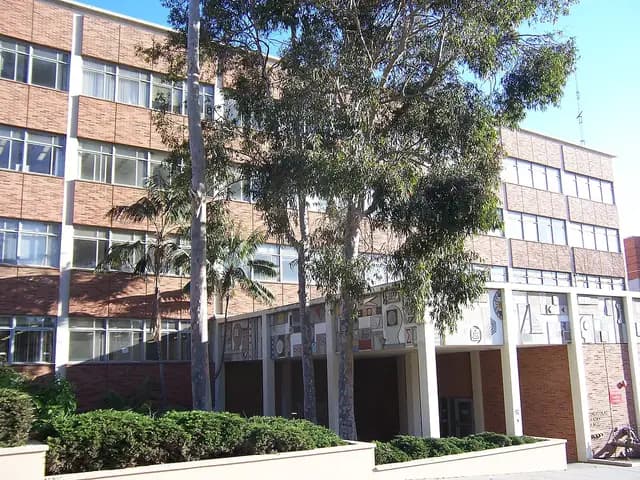
Oleg Alexandrov / Wikimedia Commons / "UCLA Mathematical Sciences Building II" / Public domain
UCLA's Department of Psychology is a leading institution that excels in psychological science, research, and practical application. With a diverse and extensive community, including faculty, Ph.D. students, postdoctoral scholars, and staff, the department is housed in the Psychology Complex with modern facilities. Pritzker Hall, a recently renovated building, is a notable feature. The department focuses on advancing the understanding of human behavior and promoting human welfare through translational research. The renowned UCLA Psychology Clinic offers evidence-based assessment and treatment while serving as a training ground for Ph.D. students and a research site. Collaborations with various disciplines help tackle complex societal issues. The department encourages individuals to contribute to its dynamic academic community.
University of California, San Diego (Jacobs) Biomedical Engineering school acceptance rate
University of California, San Diego (Jacobs)'s Biomedical Engineering acceptance rate is 43.00%.

Znode / Wikimedia Commons / "UCSD-Warren_Pano" / CC BY-SA 3.0
The UC San Diego Bioengineering Graduate Program is focused on preparing engineers for careers in the medical and biological engineering industries. Located in the UTC & Sorrento Valley area, the university benefits from its proximity to a diverse range of biotechnology, pharmaceutical, and medical technology companies. With over 200 life-sciences companies within a 10-mile radius, students have ample opportunities for industry collaboration and technology transfer. The program emphasizes Integrative Bioengineering, encompassing research from the molecular level to the whole organism, and fostering collaboration between engineering, biomedical sciences, industry, and clinical medicine. Specializations in tissue engineering, biomechanics, bioinformatics, and cardiovascular systems biology are offered within the department.
University of California, San Francisco Medicine school acceptance rate
University of California, San Francisco's Medicine acceptance rate is 2.60%.

Hourann Bosci from Perth, Australia / Wikimedia Commons / "UCSF Medical Center and Sutro Tower in 2008" / CC BY-SA 2.0
The University of California, San Francisco (UCSF) School of Medicine, established in 1864, stands out as an exceptional institution in medical education. Situated in the vibrant city of San Francisco, the program benefits from its location near world-renowned hospitals and research institutions. It is known for its emphasis on scientific research, with a substantial portion of its faculty being members of the prestigious National Academy of Medicine. UCSF School of Medicine has consistently received recognition for its excellence, ranking #5 in the U.S. News & World Report's Best Medical Schools for Research in 2022. The program boasts an impressive student outcome, with a remarkable 97% residency match rate. With a commitment to advancing healthcare through innovation and interdisciplinary collaboration, UCSF School of Medicine continues to shape the future of medicine.
University of California, Santa Barbara Chemical Engineering school acceptance rate
University of California, Santa Barbara's Chemical Engineering acceptance rate is 25.00%.
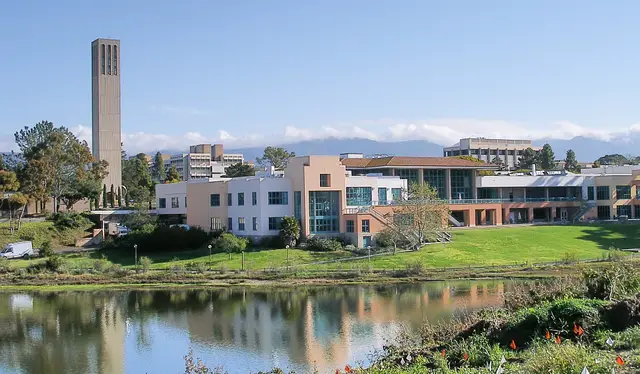
Coolcaesar at English Wikipedia / Wikimedia Commons / "UCSB University Center and Storke Tower" / CC BY-SA 3.0
UC Santa Barbara's Chemical Engineering graduate program is globally renowned, ranked #2 by the National Research Council. Emphasizing research careers, the program offers a broad education in chemical engineering, materials science, and bioengineering. Specialized research areas include Materials & Interfaces, Bioengineering, Energy & Sustainability, and Modeling, Theory & Simulation. The program's focus on interdisciplinary activities with broad technological and societal impact sets it apart. Graduates find opportunities in industry and academia. The distinguished faculty, recognized as leaders in their fields, foster collaboration and interdisciplinary work, contributing to the program's reputation as one of the top Chemical Engineering programs in the country.
University of Chicago Chemistry school acceptance rate
University of Chicago's Chemistry acceptance rate is 28.00%.
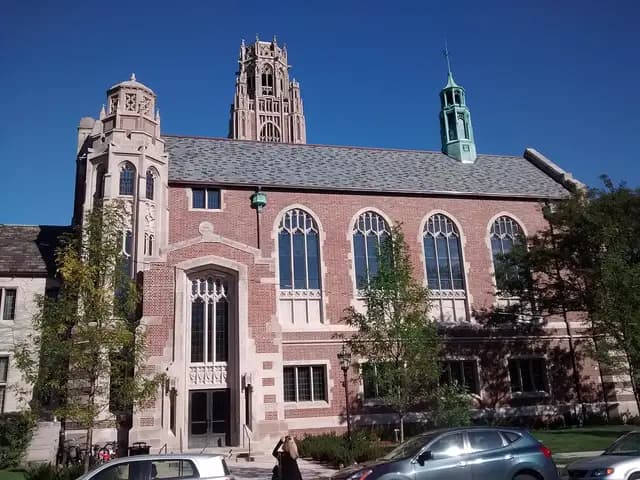
Mx. Granger / Wikimedia Commons / "Saieh Hall for Economics" / CC0
The Department of Chemistry at the University of Chicago offers a flexible and interdisciplinary graduate program. Students have the freedom to choose their research advisor early on and engage in research by spring. There are no cumulative or major examinations, and students can take courses in other departments, even earning a chemistry degree for research done under the supervision of faculty from other departments. In the first year, students must complete six graduate-level courses with a B average, undergo basic examinations, and participate in presentations and lab rotations. By the second year, students prepare for the Ph.D. candidacy examination, presenting a research prospectus for admission to candidacy.
University of Chicago Economics school acceptance rate
University of Chicago's Economics acceptance rate is 3.57%.
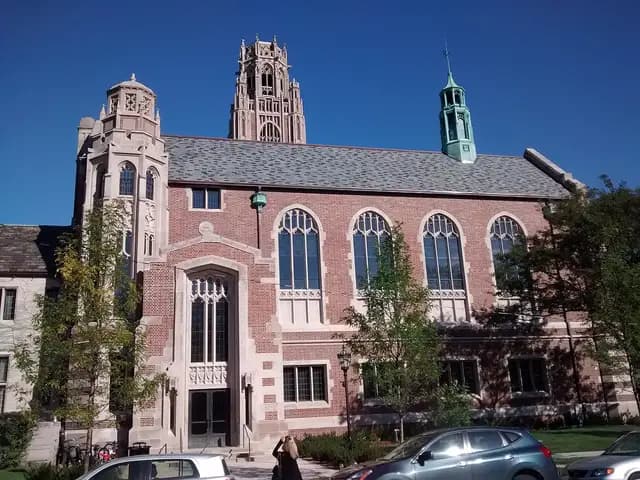
Mx. Granger / Wikimedia Commons / "Saieh Hall for Economics" / CC0
The Department of Economics at the University of Chicago is internationally recognized and highly esteemed for its faculty and teaching quality. With a competitive selection process, the department receives hundreds of applications for a limited number of graduate student positions each year. In addition to fulfilling formal admission requirements, prospective students can explore various complementary programs offered by the department. The department is dedicated to supporting its doctoral students in securing academic, nonacademic, and research positions worldwide. They provide resources such as informational sessions, a placement brochure distributed to numerous organizations, job opening postings, and mock interviews. Successful applicants receive comprehensive financial support, including tuition coverage, insurance, stipends, and research funds for five years.
University of Chicago International Relations school acceptance rate
University of Chicago's International Relations acceptance rate is 79.00%.
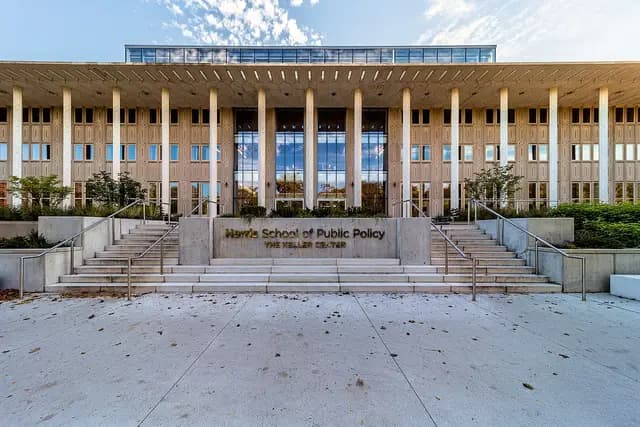
Kenneth C. Zirkel / Wikimedia Commons / "Harris School of Public Policy at the Keller Center" / CC BY-SA 4.0
The Committee on International Relations (CIR) at the University of Chicago offers a joint M.A. degree in International Relations for qualified students. Established in 1928, it is the oldest graduate program in international affairs in the United States. The CIR adopts an interdisciplinary approach, bringing together faculty from various departments and schools within the university. Students in the program engage in a comprehensive curriculum that covers a wide range of subjects related to international issues. They specialize in two fields of study and complete an original MA thesis. The CIR also provides professional development opportunities, including internships, career treks, and access to global centers.
University of Chicago Law school acceptance rate
University of Chicago's Law acceptance rate is 11.90%. The average GRE Verbal Reasoning score for University of Chicago Law is 169, and the Quantitative Reasoning score is 165.

University of Chicago Law School Communications Staff / Wikimedia Commons / "Lawschool 2008-09 2008-10-09 0017" / CC BY 3.0
The University of Chicago School of Law is a distinguished institution renowned for its rigorous academic curriculum and intellectual approach to legal education. Located on a residential campus in Chicago, Illinois, the school has a rich history dating back to its founding in 1902. It is widely recognized for its emphasis on interdisciplinary studies and the development of critical thinking skills. The school offers several prestigious degrees, including the Juris Doctor (J.D.), which it was the first American law school to offer. It has been consistently ranked among the top law schools in the United States, and its faculty members have received numerous accolades for their contributions to legal scholarship.
University of Chicago Math school acceptance rate
University of Chicago's Math acceptance rate is 8.49%.
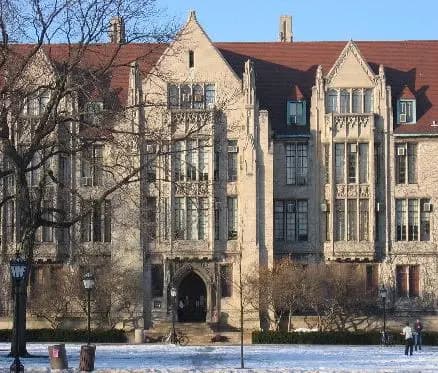
w:User:Crimson3981 / Wikimedia Commons / "Eckhart Hall" / Public domain
The Department of Mathematics offers a Ph.D. program that focuses on providing students with extensive knowledge and rigorous training in various areas of mathematics. The program boasts a first-year curriculum designed to immerse students in cutting-edge mathematical research. With an average of 80 Ph.D. students and an annual intake of 15-20 students, the program is highly selective and aimed at exceptional individuals. Close collaboration with faculty and peers is emphasized, enabling students to actively participate in research and student-led seminars. Located in the vibrant community of Hyde Park, the university benefits from its proximity to downtown Chicago and other renowned institutions, enhancing the overall academic experience.
University of Chicago Physics school acceptance rate
University of Chicago's Physics acceptance rate is 15.00%.
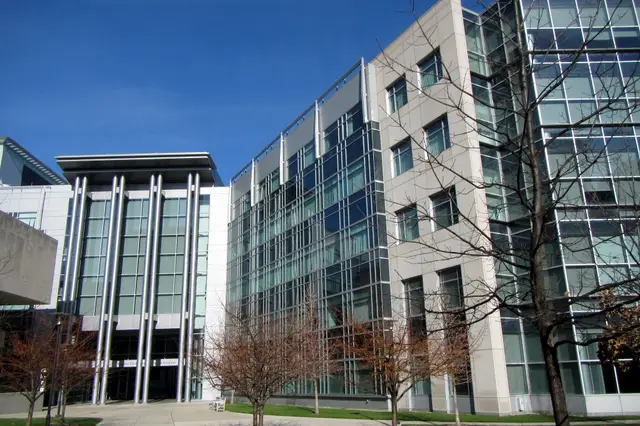
Bohao Zhao / Wikimedia Commons / "Gordon Center for Integrative Science" / CC BY 3.0
The University of Chicago's Physics Department has a rich history and is dedicated to creating an inclusive and diverse academic environment. The department emphasizes cross-disciplinary research and houses several multi-disciplinary institutes and centers. It values the contributions that diversity brings to both life and science, fostering collaboration among individuals from different backgrounds. Since its establishment, the department has achieved notable accomplishments in physics, attracting significant grants and conducting groundbreaking research. Prominent figures like A. A. Michelson, Robert A. Millikan, Arthur H. Compton, and Enrico Fermi have contributed to its success. The department's focus on excellence in teaching and research continues to shape its mission today, with ongoing discoveries and scientific contributions by its members.
University of Chicago Booth Accounting school acceptance rate
University of Chicago Booth's Accounting acceptance rate is 14.27%.
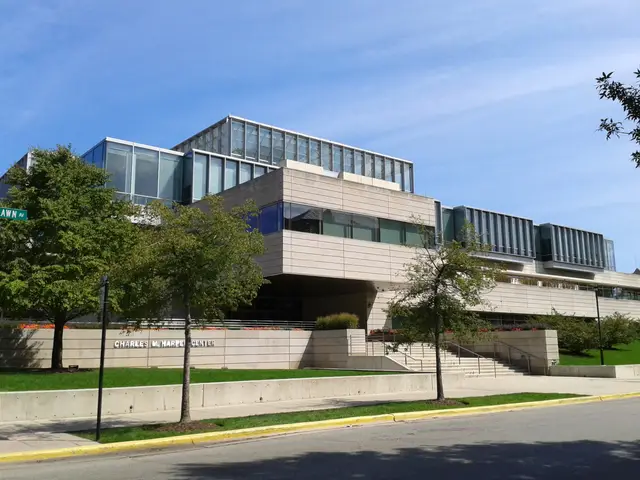
Matthew G. Bisanz / Wikimedia Commons / "Harper Center at the University of Chicago." / CC BY-SA 3.0
Chicago Booth's MBA concentration in accounting stands out with its multidisciplinary approach, integrating finance, economics and strategy. The esteemed faculty not only contribute to academic literature but also engage in accounting practice, policymaking, and mentorship. The Chookaszian Accounting Research Center serves as a hub for accounting research and publishes the prestigious Journal of Accounting Research. Students have the flexibility to choose four accounting courses tailored to their interests. Additionally, the program offers abundant opportunities for involvement in student groups, competitions, and activities, fostering skill development and a vibrant global network. With these unique features, Chicago Booth's accounting program provides a comprehensive and dynamic educational experience for aspiring accountants.
University of Chicago Booth Business school acceptance rate
University of Chicago Booth's Business acceptance rate is 29%. The average GRE Verbal Reasoning score for University of Chicago Booth Business is 161, and the Quantitative Reasoning score is 163. The average GMAT score for University of Chicago Booth Business is 736.
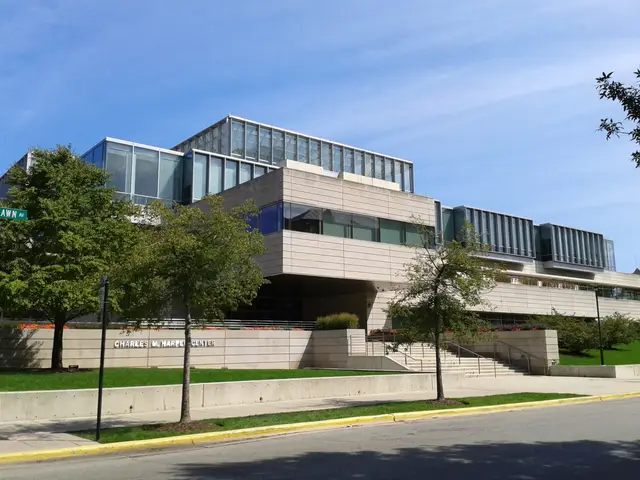
Matthew G. Bisanz / Wikimedia Commons / "Harper Center at the University of Chicago." / CC BY-SA 3.0
The University of Chicago Booth School of Business is also known as Chicago Booth. It's graduate business school of the University of Chicago, a private university in Chicago, Illinois that is highly respected for its Economics faculty in particular. Chicago Booth is the second-oldest business school in the U.S., and was founded in 1898, and has more Nobel laureates in the Economic Sciences than any other business school in the world with 10. Chicago Booth has has the third-largest endowment of any business school in the United States. Students choose Chicago Booth because of its economics prowess and its strong sense of academic freedom. Students have a lot of freedom to take risks and set their own course within the curriculum.
University of Cincinnati Architecture school acceptance rate
University of Cincinnati's Architecture acceptance rate is 59.00%.
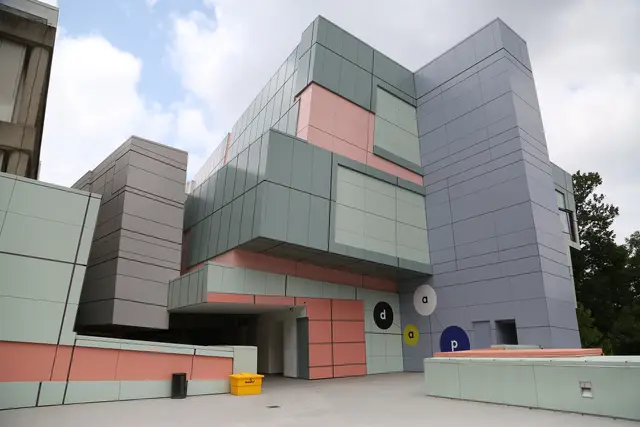
Bbjelovuk / Wikimedia Commons / "DAAP Building" / CC BY-SA 4.0
The University of Cincinnati Graduate School of Architecture's cooperative education model sets it apart from many other programs. The opportunity to gain real-world work experience alongside academic study gives students a competitive edge and a deeper understanding of the architectural profession. Students have the opportunity to engage with the city's rich architectural heritage, participate in local design initiatives, and explore architectural landmarks. Furthermore, it is well-equipped facilities with state-of-the-art facilities such as design studios, digital fabrication labs, and research centers. These resources provide students with opportunities for hands-on learning, experimentation, and the realization of their design ideas. The program's consistent ranking among the top architecture schools in the country, along with its extensive alumni network, opens doors to exciting career prospects.
University of Cincinnati Interior Design school acceptance rate
University of Cincinnati's Interior Design acceptance rate is 76%.
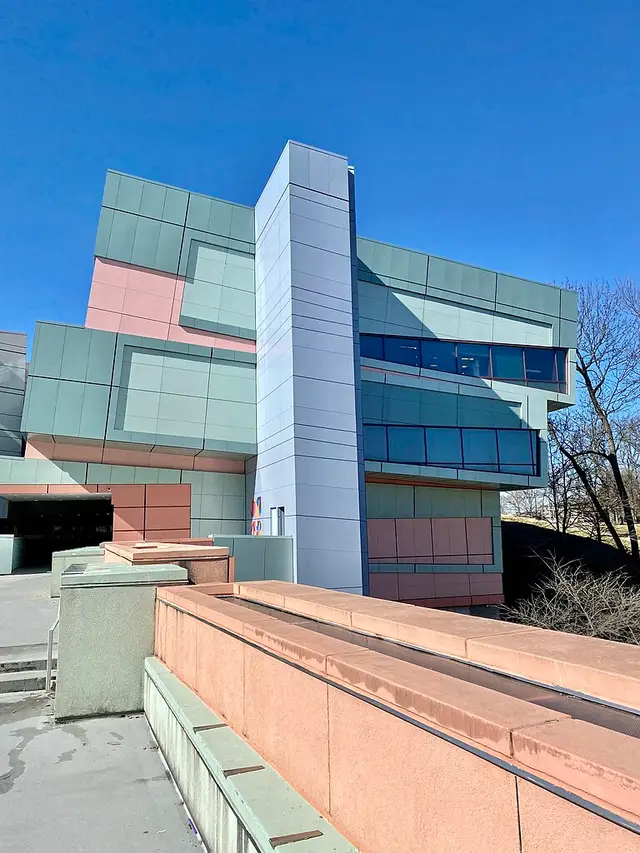
w_lemay / Wikimedia Commons / "Aronoff Center, DAAP, University of Cincinnati, CUF, Cincinnati, OH" / CC BY-SA 2.0
The Masters of Interior Design program at the University of Cincinnati is highly recommended for students seeking comprehensive education in the field. It offers exceptional learning opportunities and practical training, particularly for international students. Graduates of the program are equipped to engage in research work and pursue professional careers in Interior Design. Obtaining a master's degree enhances employment prospects and earning potential. The University of Cincinnati provides an interactive curriculum, research prospects, and a skilled teaching faculty, ensuring a rewarding learning experience. This program fosters creativity and independence in research, making it an excellent choice for students aspiring to build successful careers in the industry. The University of Cincinnati boasts a high employment rate for its graduates and tailors its courses to meet current and future industry demands.
University of Delaware Chemical Engineering school acceptance rate
University of Delaware's Chemical Engineering acceptance rate is 21.00%.
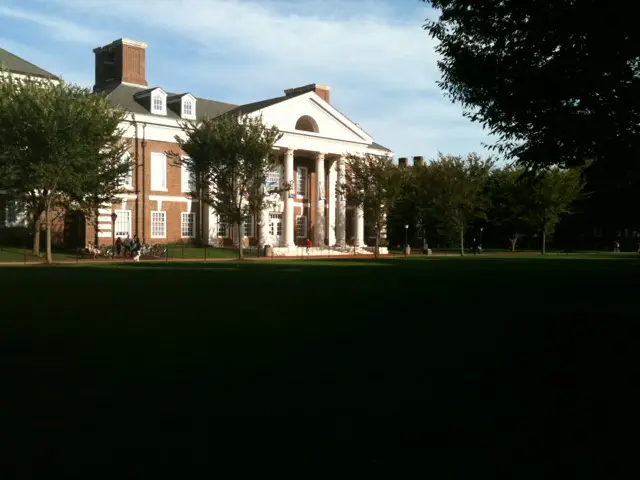
Ottawa80 / Wikimedia Commons / "UD Dupont Hall" / Public domain
The Department of Chemical Engineering offers graduate programs (M.Ch.E. and Ph.D.) focused on developing students' engineering skills for the benefit of society. The programs include core courses, electives, and independent research guided by faculty. The department is located in the Allan P. Colburn Laboratory, housing facilities for research in various areas such as catalysis, polymer engineering, biochemical and biomedical engineering, and more. Close industry contacts and visiting scholars enhance students' understanding of engineering in real-world contexts. A dual degree option with an MBA is available. Concentrations include biomolecular, catalysis and energy, data and systems, and soft matter.
University of Denver Communications school acceptance rate
University of Denver's Communications acceptance rate is 91.00%.
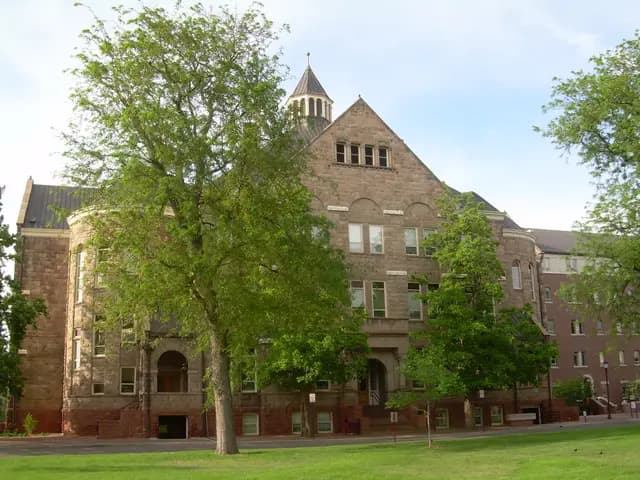
User:CW211 / Wikimedia Commons / "University of Denver campus" / CC BY-SA 3.0
The Department of Communication Studies has a rich history dating back to 1912, and it continues to be at the forefront of speech and communication studies. Located in Denver, the capital of Colorado, the department provides students with exceptional opportunities for internships and community collaborations. Their program focuses on Communication Management, teaching students the art and science of persuasive communication. Students develop expertise in data-driven storytelling, mastering the skills needed for interpersonal conversations, organizational change, digital communication, and training. The department explores a wide range of communication issues, including racial formations, privacy in family relationships, and arts-based approaches to grief and loss. Students are encouraged to actively participate in current debates and engage in research projects alongside faculty members.
University of Florida Interior Design school acceptance rate
University of Florida's Interior Design acceptance rate is 33.00%.

William M / Wikimedia Commons / "UF Architecture Building North" / CC BY-SA 3.0
The Master's of Interior Design (MID) program at UF prepares students for diverse careers in the field. The program offers specialization opportunities and is internationally renowned. Students focus on the intersection of research and practice, with a written thesis being the main requirement for the degree. The program offers different tracks to cater to students' needs: Designer Track (for those with a previous Interior Design bachelor's degree), Not Yet a Designer Track (for those without a relevant degree), and a 4+1 Combination Degree (for UF Interior Design undergraduates). Faculty mentors are engaged in various research areas, including healthcare, teaching and learning, creativity, sustainability, and psychology.
University of Illinois, Urbana-Champaign Accounting school acceptance rate
University of Illinois, Urbana-Champaign's Accounting acceptance rate is 79.13%.
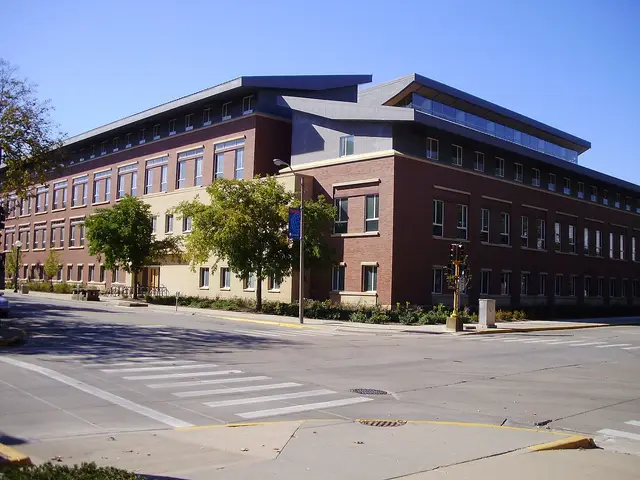
H.al-shawaf / Wikimedia Commons / "Business Instructional Facility" / CC BY-SA 3.0
The Master of Science in Accountancy (MSA) program at Gies College of Business is a unique and accessible opportunity for students from various academic backgrounds to enhance their accounting skills and become business leaders in just one year. With a highly ranked faculty and a focus on delivering an outstanding student experience, the program offers cutting-edge accounting curriculums and emphasizes data analytics and both technical and non-technical business skills. The MSA program at Gies has a remarkable track record, with 100% of domestic graduates securing employment within three months and international graduates achieving 91% successful outcomes within six months. It provides a comprehensive education, a competitive edge in the job market, and a supportive environment for international students seeking a top-ranked, STEM-designated graduate accounting degree.
University of Illinois, Urbana-Champaign Chemistry school acceptance rate
University of Illinois, Urbana-Champaign's Chemistry acceptance rate is 39.00%.
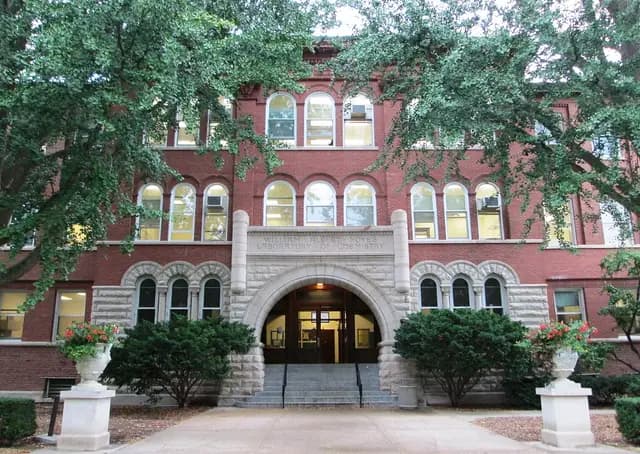
Beyond My Ken / Wikimedia Commons / "William Albert Noyes Laboratory of Chemistry University of Illinois at Urbana-Champaign" / CC BY-SA 4.0
The Department of Chemistry offers a PhD program with requirements including coursework, research, teaching, and examinations. Students can choose their research advisor and begin their research in the first year. The department provides diverse research opportunities in Analytical, Chemical Biology, Inorganic, Materials, Organic, and Physical chemistry. The formal course requirement can be fulfilled in about two years, with flexibility in course selection. Students are expected to participate in departmental seminars and present a talk in their second year. The preliminary exam evaluates research progress, while the final exam involves an oral presentation of the thesis project. Teaching assistant duties are assigned based on student backgrounds and interests. The degree awarded upon completion is the Doctor of Philosophy in Chemistry.
University of Illinois, Urbana-Champaign Civil Engineering school acceptance rate
University of Illinois, Urbana-Champaign's Civil Engineering acceptance rate is 56.98%.
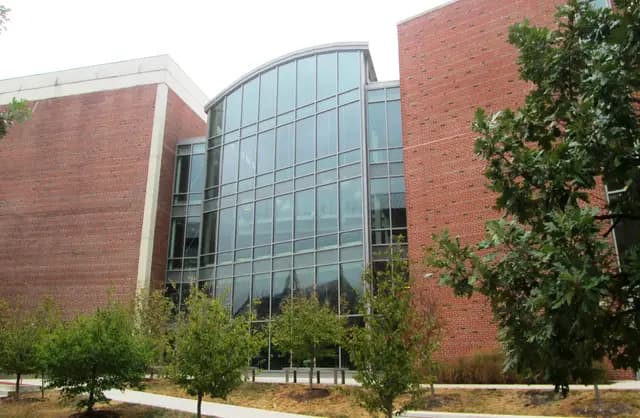
Beyond My Ken / Wikimedia Commons / "M. T. Geoffrey Yeh Student Center Nathan M. Newmark Civil Engineering Laboratory University of Illinois at Urbana-Champaign (2)" / CC BY-SA 4.0
The University of Illinois Urbana-Champaign's Department of Civil and Environmental Engineering (CEE) is renowned for its exceptional graduate programs, as well as groundbreaking research that enhances global quality of life. With a faculty composed of world-class experts, CEE at Illinois has established a reputation for academic excellence and accessibility to students. The department hosts various student organizations, including a thriving chapter of the American Society of Civil Engineers. Over the years, Illinois civil engineers have played pivotal roles in iconic infrastructure projects such as the Golden Gate Bridge and the New York subway. Today, they continue to innovate and contribute to global infrastructure development.
University of Illinois, Urbana-Champaign Computer Science school acceptance rate
University of Illinois, Urbana-Champaign's Computer Science acceptance rate is 26.68%.

Joe Futrelle / Wikimedia Commons / "Thomas M. Siebel Center for Computer Science" / CC BY-SA 2.0
The University of Illinois, Urbana-Champaign's graduate program in Computer Science holds the prestigious 5th rank in the U.S. News and World Report's Best Computer Sciences Schools issue. The big university boasts a large campus and dedicates over $640 million annually to research and development. The Grainger College of Engineering, renowned worldwide, hosts the Illinois Computer Science department. This diverse academic environment presents ample opportunities for CS graduate students to engage in innovative collaborative research that extends beyond computing and intersects with fields like medicine, business, arts, and media. Furthermore, the Department of Computer Science offers application fee waivers to exceptional candidates who are U.S. citizens or permanent residents, aiming for a full-time doctoral or Master of Science (MS) degree in Computer Science, and hail from underrepresented communities in the field.
University of Illinois, Urbana-Champaign Electrical Engineering school acceptance rate
University of Illinois, Urbana-Champaign's Electrical Engineering acceptance rate is 27.62%.
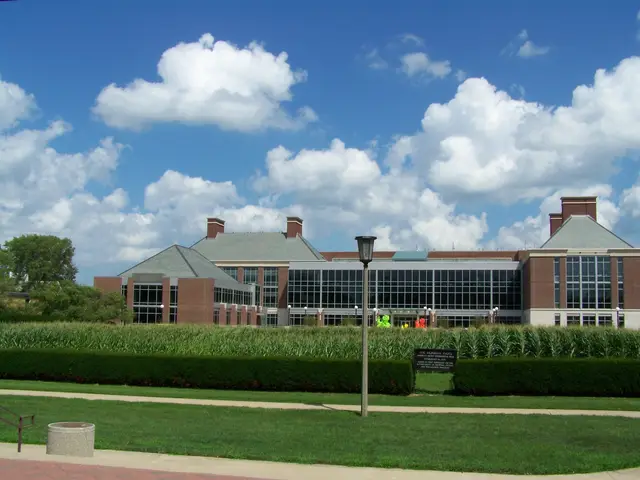
Amphylite / Wikimedia Commons / "UIUC Corn field" / CC BY-SA 4.0
The University of Illinois, Urbana-Champaign's Department of Electrical & Computer Engineering offers professional graduate degree program designed for students seeking to enhance their technical knowledge in the field. It is particularly suitable for those who plan to enter the workforce after completing their studies. The program offers graduate studies leading to a Master of Science, Doctor of Philosophy, and Master of Engineering in Electrical & Computer Engineering. The department covers various specialties, including applied computational theory, bioengineering, communications, computer systems, decision and control, optics, power systems, and more. Students can also specialize in biomechanics, cancer nanotechnology, or computational science and engineering. The faculty members have diverse research interests and affiliations with other departments and research institutes, providing ample opportunities for research collaborations. The department also houses interdisciplinary programs, laboratories, and research centers.
University of Illinois, Urbana-Champaign Journalism school acceptance rate
University of Illinois, Urbana-Champaign's Journalism acceptance rate is 55.88%.
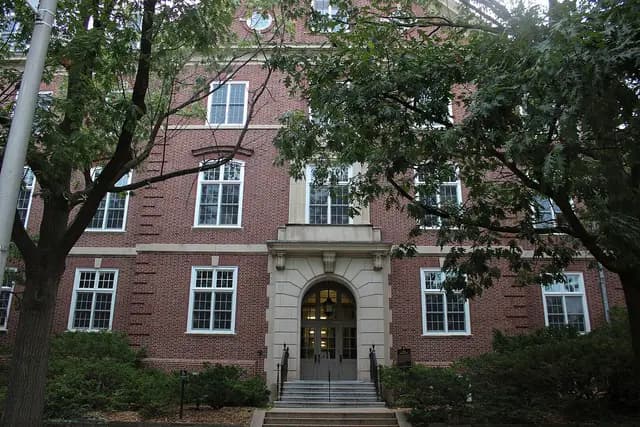
University of Illinois Library / Wikimedia Commons / "Gregory Hall (Communications Library)" / CC BY 2.0
The Department of Journalism at the University of Illinois offers a graduate program focused on preparing students for careers in digital media and newsrooms. The Master of Science in Journalism (MS) program caters to three types of students: recent graduates in journalism or related fields seeking specialization, mid-career journalists looking to enhance their skills, and individuals from diverse backgrounds wanting to combine expertise in other areas with journalism skills. The faculty comprises esteemed practitioners and scholars who teach a wide range of media subjects, including investigative journalism, data analysis, science writing, and social media. Students have access to top research institutes and opportunities to publish their work through professional newsrooms and media outlets. The university also provides hands-on journalism experiences through various media platforms.
University of Illinois, Urbana-Champaign Mechanical Engineering school acceptance rate
University of Illinois, Urbana-Champaign's Mechanical Engineering acceptance rate is 45%.
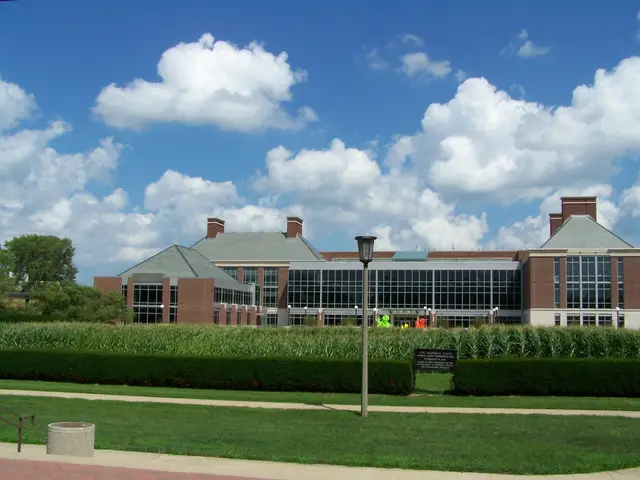
Amphylite / Wikimedia Commons / "UIUC Corn field" / CC BY-SA 4.0
The Master of Engineering in Mechanical Engineering (M.Eng.ME) program at the Grainger College of Engineering, Illinois, is a professionally focused master's degree program that offers advanced knowledge and practical experiences beyond the undergraduate level. With a reputation for excellence, the program attracts renowned faculty and exceptional students from around the world. Students can complete the program in as little as one year of full-time study or up to five years for online students who may also work full-time. The program is highly flexible and allows students to customize their coursework based on their interests and goals, with guidance from a faculty advisor.
University of Illinois, Urbana-Champaign Physics school acceptance rate
University of Illinois, Urbana-Champaign's Physics acceptance rate is 13.30%.
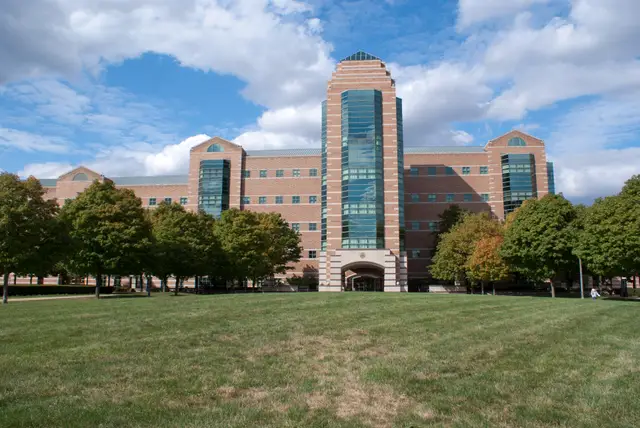
SPDvinny / Wikimedia Commons / "A view of the Beckman Institute from the south. It is the northern-most building on the Beckman Quad at the University of Illinois" / CC BY-SA 3.0
The Department of Physics offers graduate programs leading to the degrees of Master of Science and Doctor of Philosophy in Physics. Their approach focuses on interdisciplinary interactions and integrated research training. Research opportunities are available in various physics subdisciplines, including condensed matter, high energy, nuclear, astrophysics, atomic, molecular, optical, complex systems, quantum information, and biological physics. The department provides state-of-the-art research facilities in both traditional and advanced physics areas. Students can choose experimental, theoretical, or computational thesis projects and have the option to earn concurrent master's degrees in fields like materials science and engineering or computer science. Graduates have successful careers worldwide in education, academia, national labs, and private industry.
University of Illinois, Urbana-Champaign Psychology school acceptance rate
University of Illinois, Urbana-Champaign's Psychology acceptance rate is 9.71%.
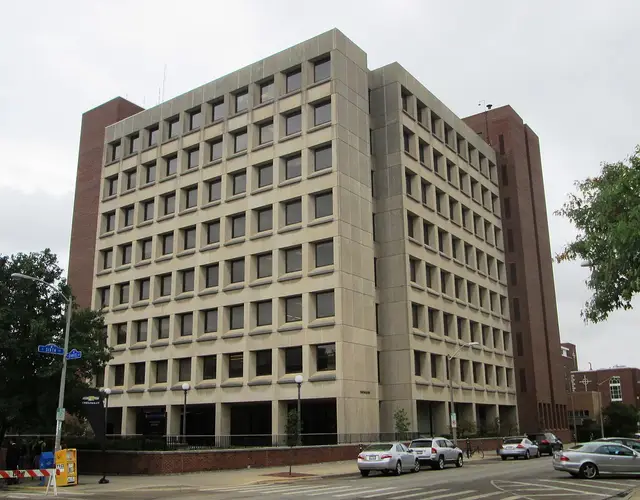
Beyond My Ken / Wikimedia Commons / "Psychology Building University of Illinois at Urbana-Champaign" / CC BY-SA 4.0
The Department of Psychology offers graduate programs for the degrees of Master of Science and Doctor of Philosophy. The Ph.D. programs cover diverse areas of psychology, including Attention & Perception, Behavioral Neuroscience, Clinical-Community, Cognitive Neuroscience, Cognitive, Developmental, Industrial-Organizational, Quantitative, and Social-Personality. Teaching experience is a crucial part of the Ph.D. program, typically fulfilled through a teaching assistantship. The focus is on preparing students for research and academic careers, with active involvement in research throughout their studies. Interdisciplinary study is encouraged both within psychology and across other fields. Students have access to ample resources, including personal office space, research facilities, and collaboration opportunities. Financial aid is available for up to six years, and completion of the doctoral degree generally takes 4-6 years.
University of Kentucky Interior Design school acceptance rate
University of Kentucky's Interior Design acceptance rate is 94%.
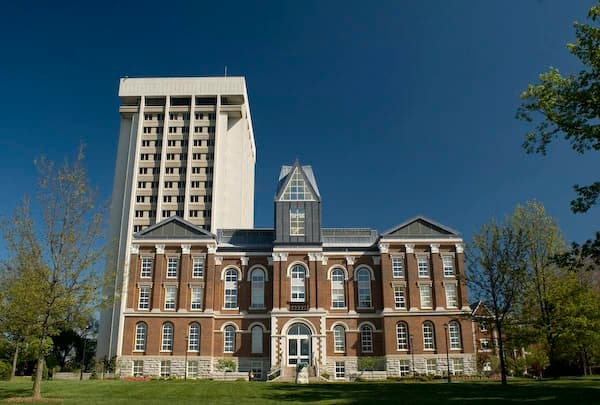
Seicer / Wikimedia Commons/ Main building, University of Kentucky / CC BY-SA 3.0
The Master of Arts in Interiors program prepares students for careers in various design fields, such as environmental design, interior design, interior architecture, adaptive reuse, and exhibition design. It also offers opportunities for further study in Ph.D. programs focused on design and the built environment. The program emphasizes the development of visual communication, critical thinking, research, and writing skills, with a particular focus on the historical and theoretical aspects of environmental design and interiority. The faculty and students engage in community partnerships and collaborate with professional design organizations to address real-world issues. The program benefits from access to advanced design fabrication facilities, lectures, and interdisciplinary opportunities within the university. Students can choose between a 2-year or 3-year degree plan, depending on their background in design disciplines.
University of Maryland, College Park Journalism school acceptance rate
University of Maryland, College Park's Journalism acceptance rate is 38.00%.
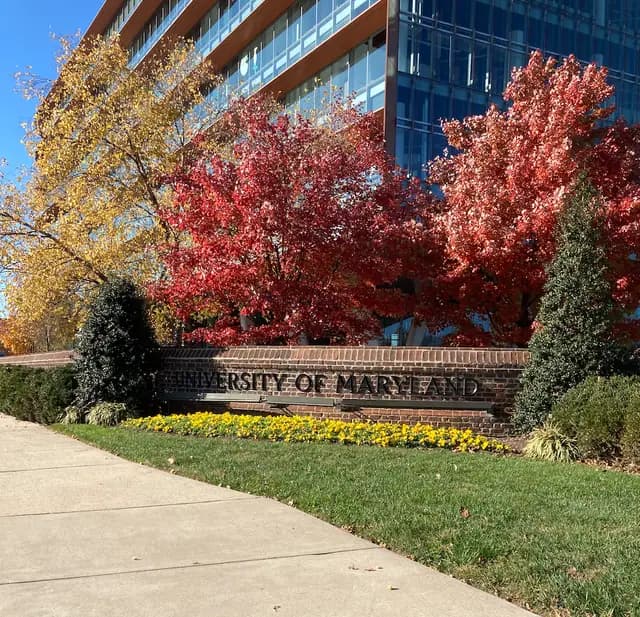
Wispeye / Wikimedia Commons / "A picture of the University of Maryland entrance by the Brendan Iribe Center for Computer Science" /CC BY-SA 4.0
Merrill College at the University of Maryland offers specialized education in journalism, media, and related fields at the master's and doctoral levels. With a curriculum focused solely on journalism, the college prepares students for careers in various sectors, including research, teaching, and media. Its faculty consists of esteemed professionals who have been honored with Pulitzer Prizes and Emmy Awards and have conducted significant media research. Merrill College provides immersive experiences, including the renowned Capital News Service, and offers small class sizes for personalized attention. Graduates leave with strong communication skills, technological proficiency, and a deep understanding of data analysis, preparing them for success in journalism and beyond.
University of Michigan, Ann Arbor Civil Engineering school acceptance rate
University of Michigan, Ann Arbor's Civil Engineering acceptance rate is 52.00%.
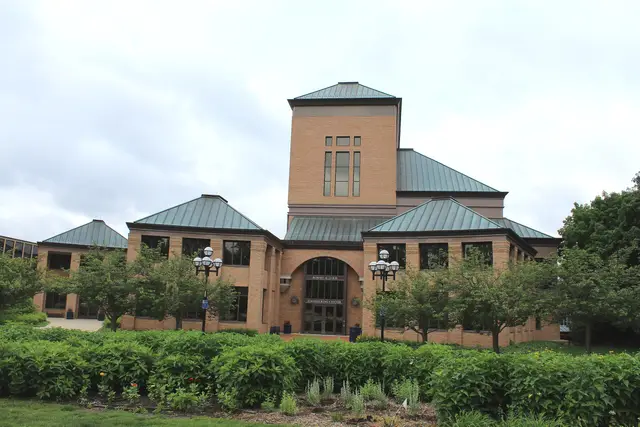
Dwight Burdette / Wikimedia Commons / "Robert H. Lurie Engineering Center, University of Michigan Campus, Ann Arbor" / CC BY 3.0
The Civil and Environmental Engineering department at the University of Michigan consistently ranks among the top 10 in the United States, offering exceptional graduate studies with high-quality faculty and cutting-edge facilities. The vibrant community and pleasant atmosphere of Ann Arbor create an appealing environment for living, studying, and conducting research. Engaging in various activities and innovative programs enriches academic pursuits, while health and wellness resources are available to support students' overall well-being. Recognizing the value of diverse teams, the department strives to increase the enrollment of female students and students of color, providing a supportive and inclusive environment for their success. Furthermore, U-M engineering graduates with a master's degree can expect higher earning potential, with average salaries varying based on degree, experience, and desired work location.
University of Michigan, Ann Arbor Education school acceptance rate
University of Michigan, Ann Arbor's Education acceptance rate is 89.40%. The average GRE Verbal Reasoning score for University of Michigan, Ann Arbor Education is 157, and the Quantitative Reasoning score is 156.
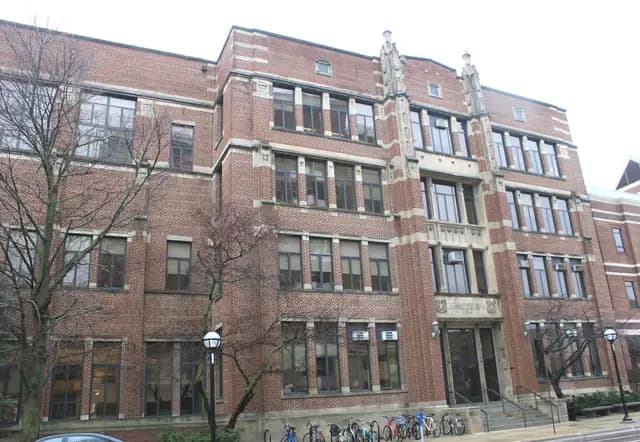
Dwight Burdette / Wikimedia Commons / "School of Education Building, University of Michigan, Ann Arbor, Michigan" / CC BY 3.0
The Educational Studies department offers a faculty that is globally recognized and equipped to foster intellectual curiosity and expand knowledge about crucial educational issues. These include equity and social justice in schools, understanding the learning process and motivation, effective teaching methods for core subjects, the integration of technology and educational innovations, the historical and philosophical foundations of education, and the use of evidence in shaping education policy and public discourse. Graduates of the program pursue academic and research careers, administrative roles in educational institutions and agencies, and positions in teacher education, professional development, and curriculum development across various sectors.
University of Michigan, Ann Arbor Electrical Engineering school acceptance rate
University of Michigan, Ann Arbor's Electrical Engineering acceptance rate is 43.00%.
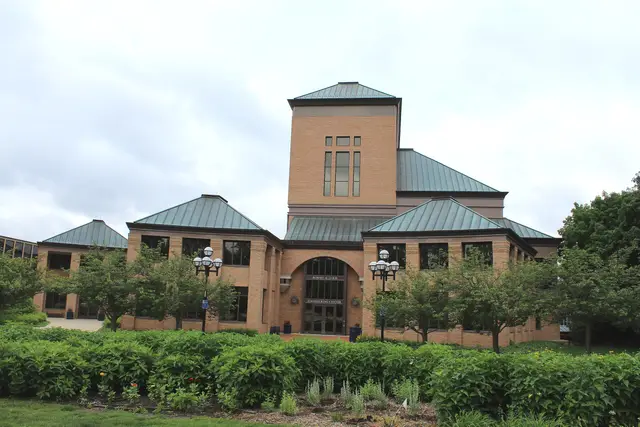
Dwight Burdette / Wikimedia Commons / "Robert H. Lurie Engineering Center, University of Michigan Campus, Ann Arbor" / CC BY 3.0
The Master of Engineering (MEng) degree in Electrical and Computer Engineering at UM is a professional, terminal degree aimed at students planning to enter the industry. It offers three concentration areas: Data Science and Machine Learning (DS/ML), Autonomous Systems (AS), and Microelectronics and Integrated Circuits (MI). The program focuses on rigorous theory, practical training, engineering projects, and industrial skills, as well as communication, project management, leadership, and entrepreneurial training. The concentrations in Autonomous Systems, Data Science and Machine Learning, and Microelectronics and Integrated Circuits provide specialized knowledge and skills in their respective fields. The MEng degree requires completion of 26 credits and can be finished in one year or two semesters. The program is known for its esteemed faculty, progressive curriculum, and emphasis on diversity, interdisciplinary collaboration, and innovation.
University of Michigan, Ann Arbor Engineering school acceptance rate
University of Michigan, Ann Arbor's Engineering acceptance rate is 44.90%. The average GRE Verbal Reasoning score for University of Michigan, Ann Arbor Engineering is 155, and the Quantitative Reasoning score is 166.
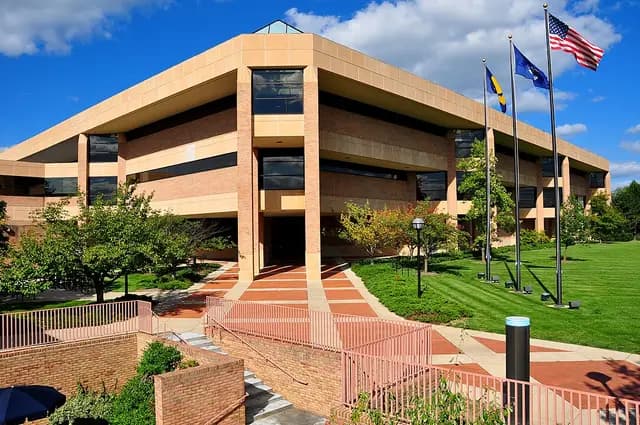
Andrew Horne / Wikimedia Commons / "Duderstadt Center" / CC BY-SA 3.0
The University of Michigan offers an interdisciplinary research environment where students can collaborate with peers from various top-ranked units. They have the opportunity to work on significant projects related to autonomous vehicles, cybersecurity, and protecting the Great Lakes. The university boasts an impressive alumni base of over 85,000 individuals, including notable figures such as former astronaut James McDivitt, Larry Page (co-founder of Google), and Katie Bouman (developer of the algorithm used to filter the first images of a black hole). Students can also explore the state-of-the-art Ford Motor Company Robotics Building, which features facilities for robotics research. Located in Ann Arbor, a city less than an hour away from Detroit, students can enjoy a balanced lifestyle with access to outdoor activities like kayaking on the Huron River and exploring parks and trails. Additionally, the city offers a variety of global cuisine options in its historic downtown area.
University of Michigan, Ann Arbor Law school acceptance rate
University of Michigan, Ann Arbor's Law acceptance rate is 10.60%.
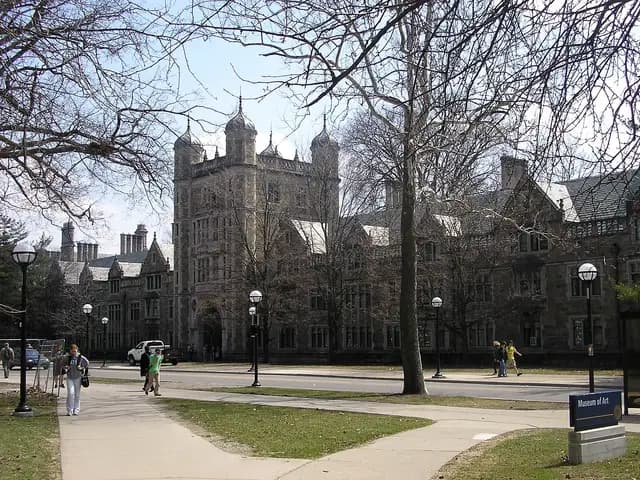
User: (WT-shared) Jha4ceb at wts wikivoyage / Wikimedia Commons / "University of Michigan Campus in Ann Arbor, Michigan" / CC BY-SA 4.0
Founded in 1859, the University of Michigan, Ann Arbor School of Law is one of the oldest law schools in the US. Located in the Cook Quadrangle on the university's central campus, it boasts both aesthetic beauty and functional excellence. The program is recognized for its rigorous academics, commitment to public service, and international reputation. Producing highly accomplished graduates, the school has a strong alumni network in influential legal positions. Unique offerings include dual-degree programs, allowing students to earn a J.D. alongside a master's degree in areas like business administration, public policy, or social work. This emphasis on interdisciplinary education expands career opportunities for students.
University of Michigan, Ann Arbor Mechanical Engineering school acceptance rate
University of Michigan, Ann Arbor's Mechanical Engineering acceptance rate is 13.00%.
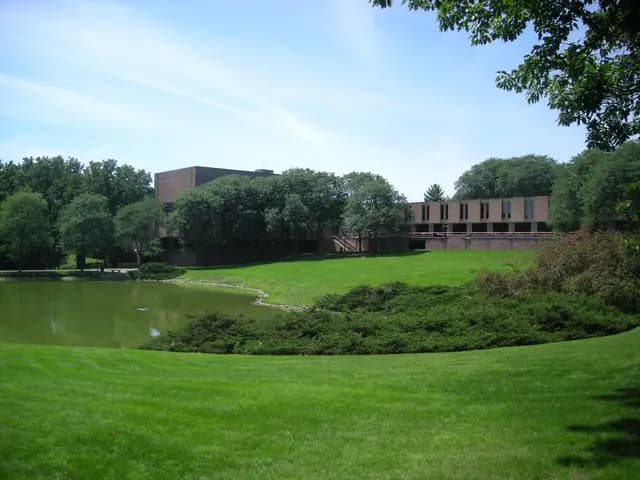
Michael Barera / Wikimedia Commons / "The Earl V. Moore Building on the north campus of the University of Michigan in Ann Arbor, Michigan" / CC BY-SA 4.0
The University of Michigan boasts an unparalleled combination of expertise, resources, and facilities, with 100 graduate programs ranking in the top 10 nationwide. Their mechanical engineering graduate programs capitalize on this interdisciplinary powerhouse, fostering groundbreaking research and knowledge that impact academia and society. Founded in 1868 with just one professor, the ME Department at UM has grown significantly. It now includes 72 tenured or tenure-track faculty, 19 research faculty and lecturers, 55 staff members, over 850 undergraduate students, and more than 500 graduate students, including 250+ pursuing Ph.D. degrees. With a rich history and clear vision, the University of Michigan shapes the future of mechanical engineering through innovative paradigms.
University of Michigan, Ann Arbor Psychology school acceptance rate
University of Michigan, Ann Arbor's Psychology acceptance rate is 6.00%.
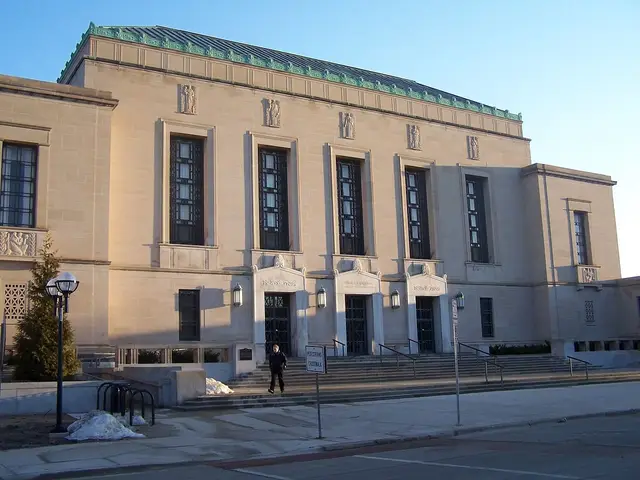
Annebethmi at English Wikipedia / Wikimedia Commons / "Horace H. Rackham School of Graduate Studies (March 2008)" / CC BY-SA 3.0
The University of Michigan, Ann Arbor's Department of Psychology is renowned for its excellence in graduate programs, consistently ranking among the top in the nation. In 2015, it tied with Harvard for 4th place on the U.S. News & World Report's list of top-ranked graduate psychology programs. The department's success can be attributed to the quality of its students, graduates, programs, and faculty. The faculty members are globally recognized for their contributions to the field, driving new discoveries and knowledge in psychology. The department is dedicated to its students' success, offering innovative courses, engaging them in real research, and maintaining an exceptional graduate education record. With specialized PhD degrees in various areas of psychology, as well as joint programs with Social Work, Education, and Women's Studies, graduates are well-prepared for careers in academia, research, healthcare, and more.
University of Michigan, Ann Arbor (Ross) Accounting school acceptance rate
University of Michigan, Ann Arbor (Ross)'s Accounting acceptance rate is 9.94%.
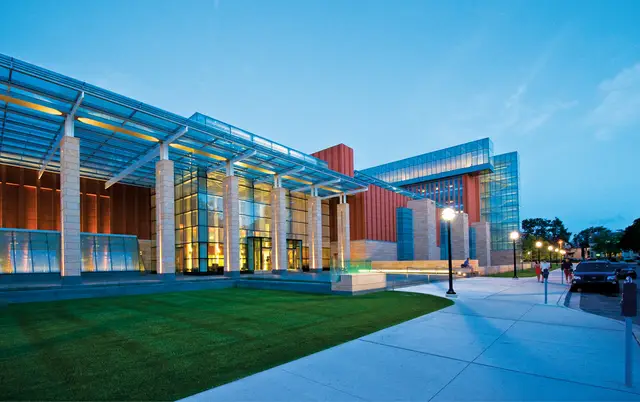
Michigan Ross / Wikimedia Commons / "Ross School Exterior" / CC BY-SA 3.0
The Ross Master of Accounting is a highly regarded program that equips college graduates with the skills and knowledge necessary to excel in the field. It is an eight-month, STEM-designated degree program that prepares students for a career as a Certified Public Accountant (CPA) and beyond. The curriculum encompasses a comprehensive accounting foundation, supplemented by MBA electives such as data analytics. Graduates of the program have a competitive edge in the job market, with top companies, including the Big Four, regularly hiring them. Additionally, students have the opportunity to enhance their business skills and network through cross-disciplinary coursework and events like the EY Accounting and Public Policy Symposium. The program also boasts a high CPA exam passing rate and has produced numerous Elijah Watt Sells Award recipients.
University of Michigan, Ann Arbor (Ross) Business school acceptance rate
University of Michigan, Ann Arbor (Ross)'s Business acceptance rate is 9.94%. The average GRE Verbal Reasoning score for University of Michigan, Ann Arbor (Ross) Business is 160, and the Quantitative Reasoning score is 160. The average GMAT score for University of Michigan, Ann Arbor (Ross) Business is 720.
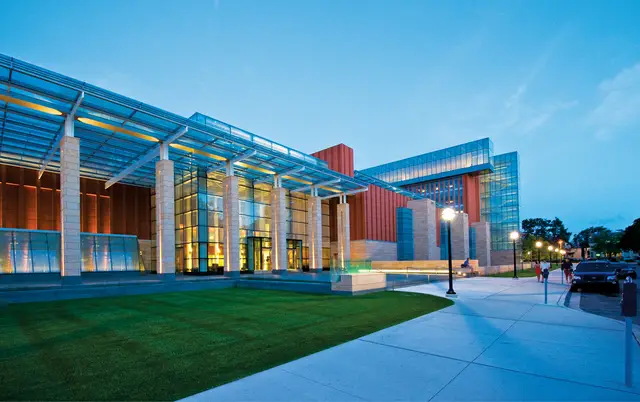
Michigan Ross / Wikimedia Commons / "Ross School Exterior" / CC BY-SA 3.0
Established in 1924, the University of Michigan, Ann Arbor (Ross) School of Business has garnered a reputation for excellence that sets it apart from other institutions. With numerous accolades, including being consistently ranked among the top business schools globally, Ross offers a transformative educational experience. The program prides itself on its action-based learning approach, allowing students to apply classroom knowledge to real-world challenges through programs like the Ross Experiences in Action-Based Learning (REAL) initiative. Located in Ann Arbor, Michigan, the school benefits from its close proximity to major corporations and a thriving entrepreneurial ecosystem, offering students unparalleled networking and internship opportunities. The impressive statistics speak for themselves, with high employment rates and starting salaries for graduates. Ross fosters a supportive and collaborative environment, empowering students to become innovative leaders who make a positive impact in their chosen fields.
University of Minnesota, Twin Cities Chemical Engineering school acceptance rate
University of Minnesota, Twin Cities's Chemical Engineering acceptance rate is 20.62%.
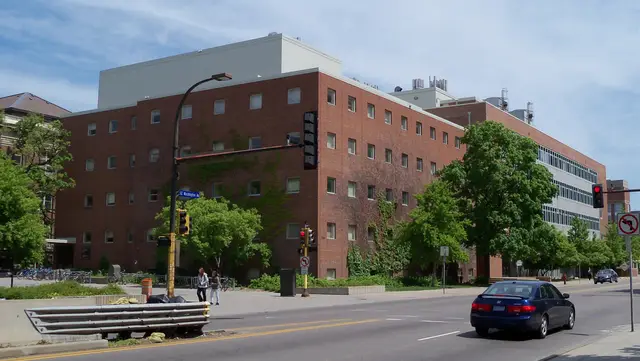
AlexiusHoratius / Wikimedia Commons / "Amundson Hall Minnesota 5" / CC BY-SA 3.0
The M.S. in Data Science for Chemical Engineering and Materials Science is a groundbreaking program that combines expertise in chemical engineering, materials science, and data science. It is the first joint degree offered by the Department of Chemical Engineering and Materials Science and Engineering (CEMS). The program equips students with the essential skills to seamlessly integrate digital technologies into their work. The curriculum includes core courses on statistical analysis, machine learning, and optimization, with applications in various engineering fields. Students can specialize in areas such as artificial intelligence, high-performance computing, automation and robotics, or data analytics. A unique feature is the option to undertake a capstone project with esteemed CEMS faculty, collaborating with other departments or industry advisors. This interdisciplinary training and cutting-edge projects make graduates highly desirable in industries such as chemical, biotechnology, and materials.
University of Missouri, Columbia Journalism school acceptance rate
University of Missouri, Columbia's Journalism acceptance rate is 77.00%.
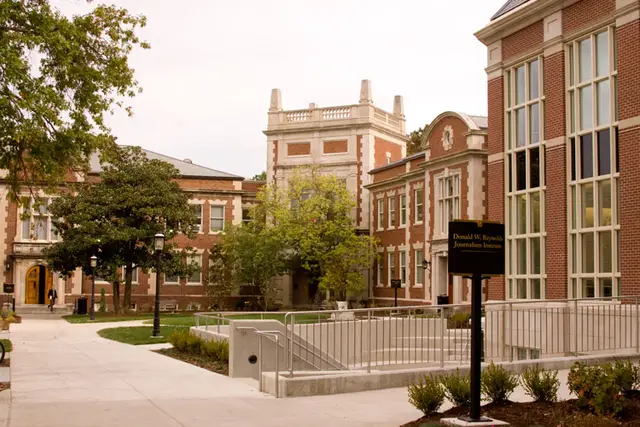
Mojourcomm / Wikimedia Commons / "Jschool-quad" / Public domain
The Missouri School of Journalism, the world's first of its kind, is a leading institution with 80 faculty members, 200 master's degree students, and 30 doctoral degree students. Its student body represents over 30 countries, with half of the graduate students being international. The School operates numerous media outlets and communications agencies, including newspapers, radio stations, magazines, and more. The Donald W. Reynolds Journalism Institute serves as a state-of-the-art research and development center. The School is also home to prestigious professional organizations. Graduates from Missouri hold key positions in prominent news organizations, advertising agencies, and magazines. The program offers excellent preparation for doctoral studies, and faculty members support students in publishing their work. Studying at Missouri means joining an esteemed community of accomplished journalists.
University of Nebraska Lincoln Interior Design school acceptance rate
University of Nebraska Lincoln's Interior Design acceptance rate is 78%.
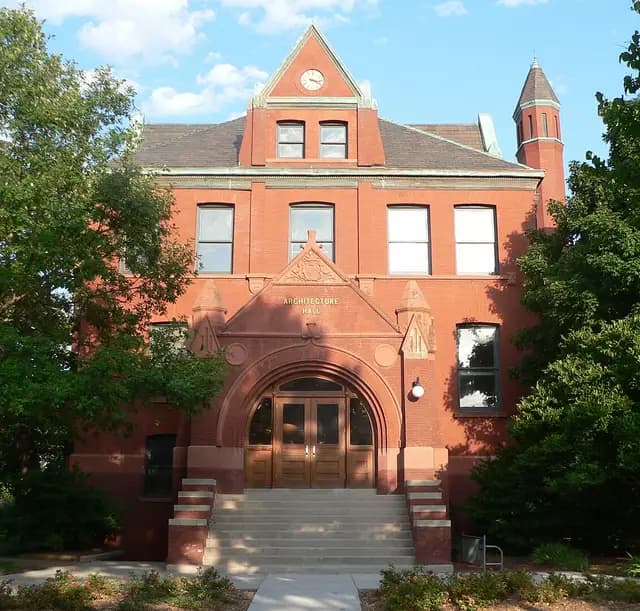
Ammodramus / Wikimedia Commons / "UNL Architecture Hall" / CC0
The University of Nebraska-Lincoln, established in 1869, provides online Master of Science (MS) in Architecture with a specialization in Interior Design program. As a proud member of the Big Ten Conference, the Big Ten Academic Alliance, and the Association of Public and Land-grant Universities (APLU), it award-winning faculty prepares individuals for leadership roles in the field. Students are equipped with the skills needed to identify, research, and creatively solve problems related to interior environments. The program covers a range of topics, including design analysis, space planning, aesthetics, and sustainability. Students gain hands-on experience through field-work opportunities and develop research and theory-based problem-solving skills. The program caters to graduates of an interior design program and offers specialization options.
University of North Carolina, Chapel Hill (Kenan-Flagler) Accounting school acceptance rate
University of North Carolina, Chapel Hill (Kenan-Flagler)'s Accounting acceptance rate is 25.00%.
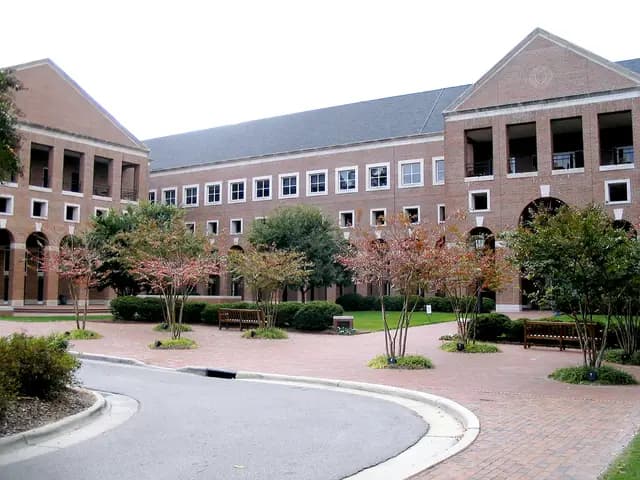
DP08 at en.wikipedia. / Wikimedia Commons / "UNC Kenan-Flagler Business School" / Public domain
The UNC Kenan-Flagler MAC program is a highly inclusive and prestigious program that welcomes students from any undergraduate major or professional background. It offers deep accounting skills and knowledge that will benefit individuals starting, switching, or advancing their careers. UNC's alumni network, ranked #1 by LinkedIn, provides valuable connections and support. Graduates can expect strong salaries, with the potential to earn over $60K at the start of their career and over $100K after 5 years. The program boasts a 98% employment rate and a 100% greatness rating, attracting top firms and major corporations. It can be completed in just one year, allowing students to transition quickly from student to professional. The program's rankings on LinkedIn, University HQ, Academic Influence, and U.S. News & World Report affirm its excellence and commitment to delivering an exceptional educational experience, both online and on-campus.
University of Pennsylvania Biomedical Engineering school acceptance rate
University of Pennsylvania's Biomedical Engineering acceptance rate is 15.00%.
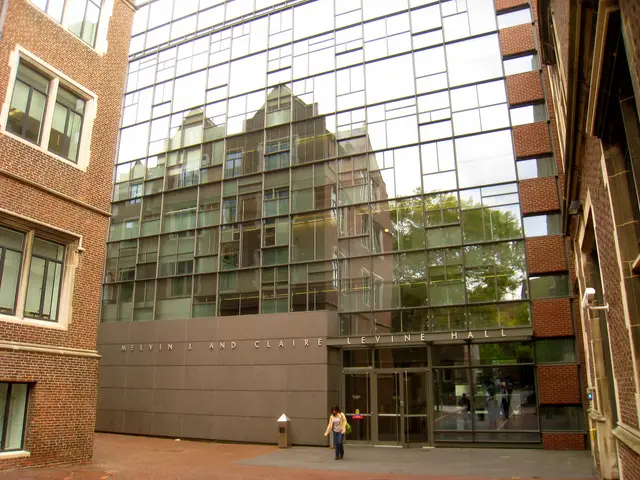
Daderot / Wikimedia Commons / "Levine Hall (University of Pennsylvania) - IMG 6634" / Public domain
The Bioengineering master's program at the University of Pennsylvania offers an interdisciplinary education focused on scientific and engineering principles, with a specific emphasis on the latest advancements in the field of Bioengineering. The program aims to equip students with the skills necessary to thrive in various sectors, including industry, research and development, government, and academia. The curriculum provides rigorous training in engineering, with a particular focus on biological and medical sciences. Students have the flexibility to choose their own graduate coursework from a range of disciplines, and they can access resources from multiple research laboratories on campus. The program offers both thesis and non-thesis degree tracks, and students typically complete their studies within twelve to eighteen months.
University of Pennsylvania Communications school acceptance rate
University of Pennsylvania's Communications acceptance rate is 7.00%.
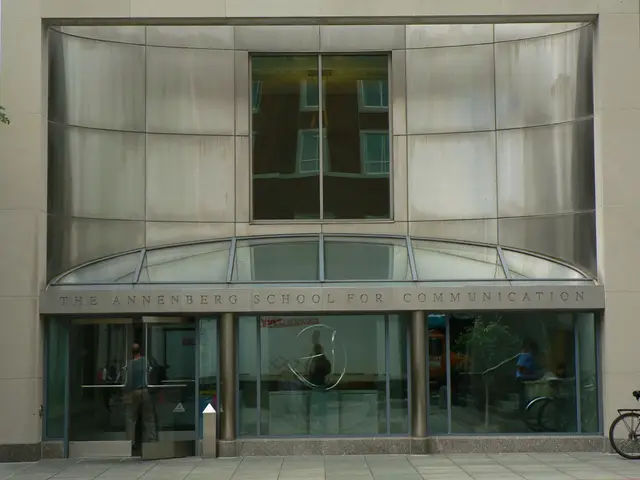
Marc Smith / Wikimedia Commons / "ASC at Penn" / CC BY-SA 2.0
The Annenberg School for Communication is a vibrant and diverse community of scholars dedicated to exploring the impact of media on global issues. With a prestigious doctoral program, it offers a supportive environment for advancing knowledge in communication. Founded by Walter Annenberg, the school focuses on research, education, and service to deepen our understanding of communication's role in public life. Renowned faculty, students, and alumni, along with access to resources from the University of Pennsylvania, contribute to its excellence. While there is no standalone master's degree program, students are directly admitted to the doctoral program and receive financial support for their academic pursuits. The close-knit community fosters collaboration and support among scholars and staff.
University of Pennsylvania Economics school acceptance rate
University of Pennsylvania's Economics acceptance rate is 8.10%.
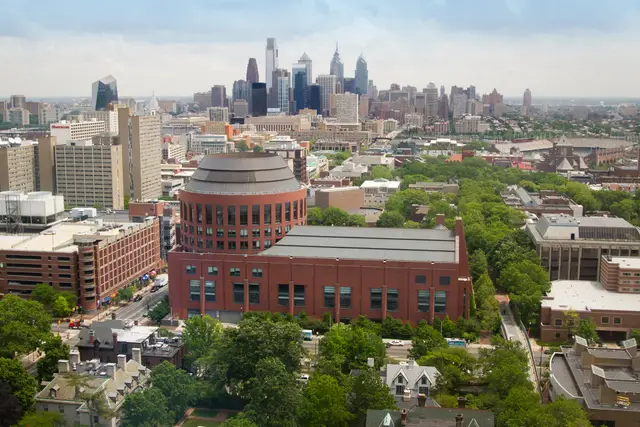
WestCoastivieS / Wikimedia Commons / "Huntsman Hall at the University of Pennsylvania" / CC0
The University of Pennsylvania's graduate economics program, administered by the Graduate Group in Economics, offers a Ph.D. degree. The program focuses on training students to excel in economic research, covering all major areas of economics, with notable strengths in microeconomics, macroeconomics, and empirical analysis. The program prepares graduates for prestigious positions in academia, research institutions, and government agencies worldwide. The program requires full-time commitment towards the Ph.D. degree, and part-time and terminal Master's applications are not considered. Students gain a strong foundation in economic theory and econometric methods before delving into their own research. The program typically takes around 5.25 years to complete, and students receive financial support through fellowships, research assistantships, and teaching assistantships during their initial five years of study.
University of Pennsylvania Education school acceptance rate
University of Pennsylvania's Education acceptance rate is 34%.
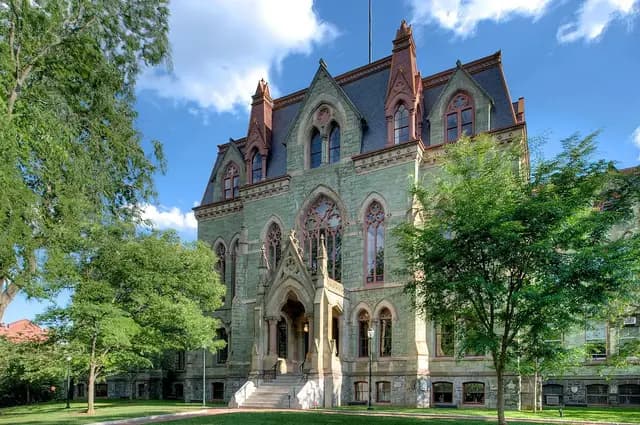
Bestbudbrian / Wikimedia Commons / "North facade of College Hall, Penn Campus" / CC BY-SA 4.0
Established in 1914, the University of Pennsylvania Graduate School of Education (Penn GSE) is a renowned institution historically known for its excellence in education and in both qualitative and quantitative research. It is also notable for its entrepreneurism, developing custom degree programs for practicing professionals and unique partnerships with local educators. Penn GSE stands out with its innovative programs and unique offerings, such as the renowned Penn Residency Master's in Teaching program, which combines rigorous coursework with a year-long immersive teaching experience in urban schools. This distinctive approach allows students to gain hands-on experience while developing a deep understanding of educational theory and practice.
University of Pennsylvania (Carey) Law school acceptance rate
University of Pennsylvania (Carey)'s Law acceptance rate is 8.05%. The average GRE Verbal Reasoning score for University of Pennsylvania (Carey) Law is 164, and the Quantitative Reasoning score is 161.
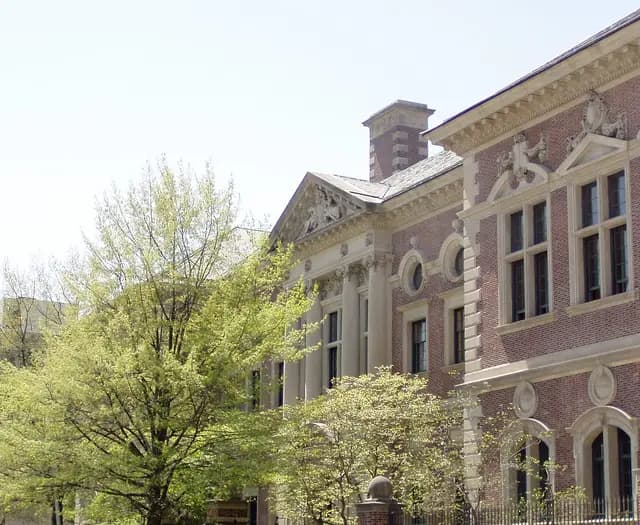
Jeffrey M. Vinocur / Wikimedia Commons / "University of Pennsylvania Law School" / CC BY-SA 3.0
The University of Pennsylvania (Carey) School of Law, established in 1850, is renowned for its rich history and prestigious reputation in legal education. It is known for its joint degree programs, which allow students to earn two degrees in less than the usual amount of time The program stands out for its emphasis on interdisciplinary learning, allowing students to explore connections between law and various fields such as business, technology, and healthcare. The school consistently ranks among the top law schools in the United States and boasts impressive student outcome rates, with graduates securing prestigious positions in both the public and private sectors.
University of Pennsylvania (Perelman) Medicine school acceptance rate
University of Pennsylvania (Perelman)'s Medicine acceptance rate is 3.80%.
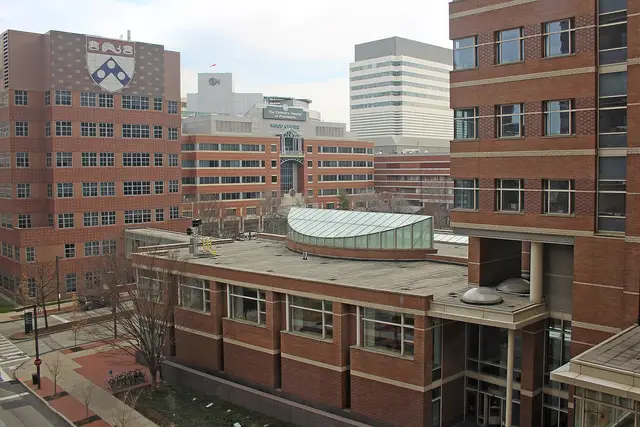
Ajaxean / Wikimedia Commons / "University of Pennsylvania (Perelman)" / CC BY-SA 3.0
Founded in 1765, the University of Pennsylvania (Perelman) School of Medicine is the nation's first medical school and home to the first teaching hospital. Situated in Philadelphia, Pennsylvania, the school enjoys a prime location with close proximity to renowned hospitals and research facilities. One unique aspect of the program is the Perelman School of Medicine's commitment to interdisciplinary collaboration, with opportunities for students to engage in research across various disciplines. The school has garnered recognition for its research prowess, with faculty members receiving numerous prestigious awards, including Nobel Prizes. The school has been ranked #3 in the U.S. News & World Report's Best Medical Schools for Research in 2022. With an impressive residency match rate of 98% and a focus on producing compassionate and innovative physicians, the Perelman School of Medicine at the University of Pennsylvania stands as a pillar of excellence in medical education.
University of Pennsylvania (Wharton) Accounting school acceptance rate
University of Pennsylvania (Wharton)'s Accounting acceptance rate is 13.88%.
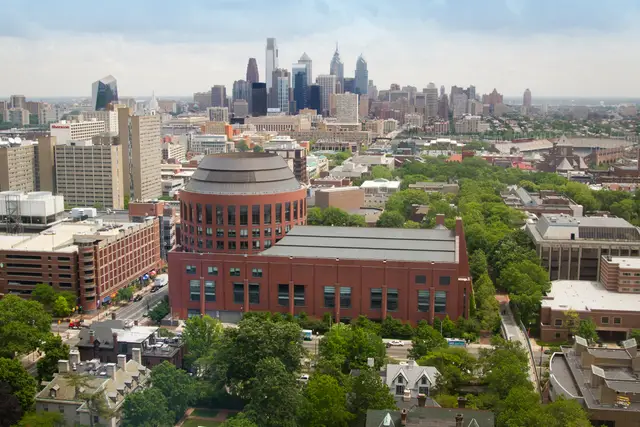
WestCoastivieS / Wikimedia Commons / "Huntsman Hall at the University of Pennsylvania" / CC0
The Accounting major at the Wharton School stands out for its focus on equipping students with skills to measure and communicate economic activities. It emphasizes the generation and reliability of accounting information, preparing students for careers where data analysis is crucial. The program's unique aspect lies in its flexibility, allowing students to tailor their curriculum and pursue certification as a CPA or CMA. The Wharton School's renowned faculty members bring real-world insights, and its strong industry connections provide networking opportunities and diverse career prospects. This combination of specialized curriculum, faculty expertise, flexibility, and professional certification options sets the Wharton School's Accounting major apart.
University of Pennsylvania (Wharton) Business school acceptance rate
University of Pennsylvania (Wharton)'s Business acceptance rate is 13.88%. The average GRE Verbal Reasoning score for University of Pennsylvania (Wharton) Business is 162, and the Quantitative Reasoning score is 162. The average GMAT score for University of Pennsylvania (Wharton) Business is 733.
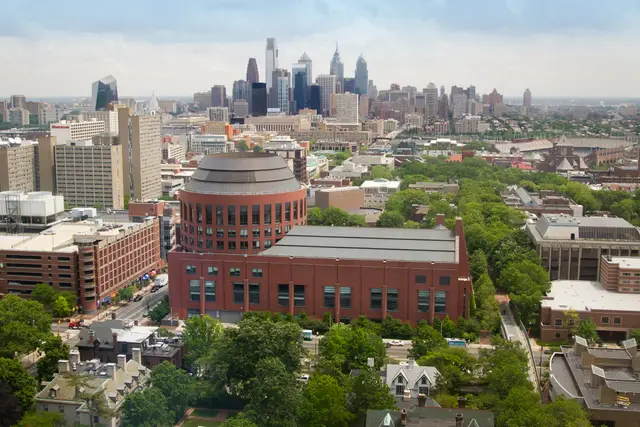
WestCoastivieS / Wikimedia Commons / "Huntsman Hall at the University of Pennsylvania" / CC0
The Wharton School of the University of Pennsylvania, established in 1881, holds an esteemed position as one of the world's foremost business institutions. Renowned for its rigorous academic programs and groundbreaking research, Wharton consistently ranks among the top business schools globally. With an acceptance rate of around 19%, Wharton attracts a diverse and talented student body. The school's curriculum combines theoretical knowledge with hands-on experiential learning, preparing graduates for success in the ever-evolving business landscape. Wharton's extensive alumni network spans over 100 countries and includes influential leaders across industries. The school's commitment to innovation is reflected in initiatives like the Wharton Innovation Fund, which supports entrepreneurial ventures. Furthermore, Wharton graduates enjoy exceptional career prospects, with 95% securing employment within three months of graduation. With a legacy of excellence, Wharton continues to shape the future of business through its cutting-edge research, global perspective, and transformative educational experiences.
University of San Diego Engineering school acceptance rate
University of San Diego's Engineering acceptance rate is 47%.

Walleigh / Wikimedia Commons / "The Donald P. Shiley Center for Science and Technology on the campus of the University of San Diego, San Diego, CA, USA." / CC BY-SA 3.0
The University of San Diego's Master of Science in Engineering Management and Leadership (MS-EML) program is designed to bridge the gap between advanced engineering expertise and strategic leadership. Offered fully online, the program equips engineers with the business acumen and managerial skills needed to lead complex projects and high-performing teams in technology-driven industries. Emphasizing systems thinking, ethical decision-making, and innovation, the MS-EML curriculum prepares professionals to tackle real-world engineering challenges with a focus on sustainable and socially responsible solutions. With a strong foundation in both technical and leadership competencies, graduates are well-positioned to drive organizational growth and shape the future of engineering enterprises.
University of South Florida Accounting school acceptance rate
University of South Florida's Accounting acceptance rate is 49.00%.
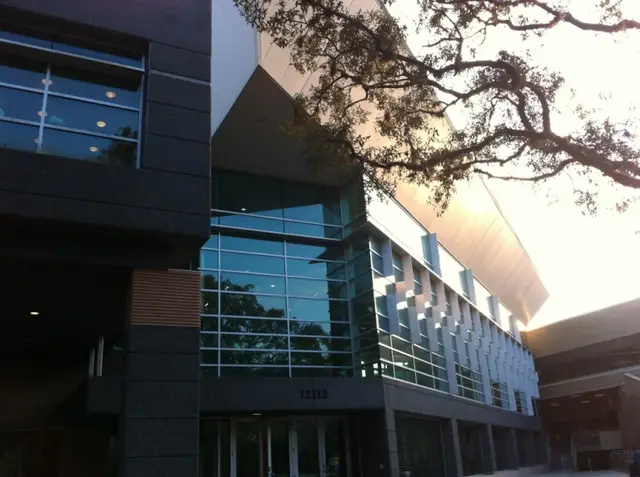
FightingRaven531 / Wikimedia Commons / "College of Business at USF" /CC BY-SA 3.0
The Master of Accountancy (M.Acc.) program at Lynn Pippenger School of Accountancy offers an in-depth education in accounting beyond the undergraduate level, focusing on areas like data analytics. It prepares students for careers in business, government, and public accounting. To be admitted, candidates must have an accredited undergraduate degree in accounting. The University of South Florida (USF) has seen remarkable growth, ranking as the fastest-rising university in the U.S. by U.S. News. USF provides a vibrant campus life with diverse student resources, over 600 clubs, 19 varsity sports, and a thriving arts scene. Located in Tampa, students also have access to beautiful beaches, cultural institutions, and professional sports teams.
University of Texas, Austin Computer Science school acceptance rate
University of Texas, Austin's Computer Science acceptance rate is 9%.
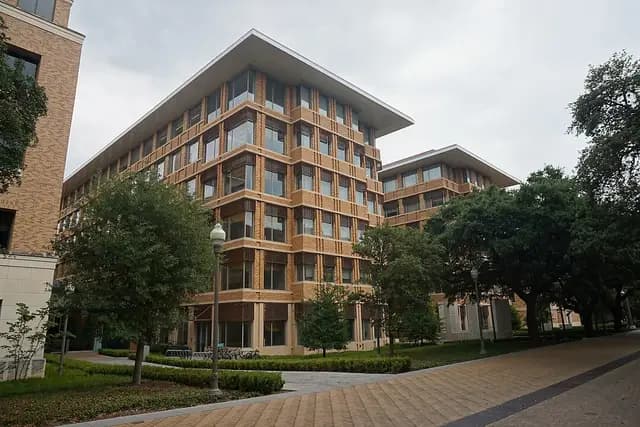
Michael Barera / Wikimedia Commons / "University of Texas at Austin August 2019 21 (Gates-Dell Complex)" / CC BY-SA 4.0
UT Computer Science has played a vital role in the digital revolution since its inception. Established in 1966, the same year DARPA initiated the Internet project and long before the founding of tech giants Apple and Microsoft, the program has consistently ranked among the top 10 in the nation. Research forms the bedrock of the department's graduate program, with notable strengths in Systems, Artificial Intelligence and Robotics, Networks, Security, Data Mining and Visualization, Bioinformatics, Theory, and Formal Methods and Verification. The department boasts an esteemed faculty of over 40 leaders in CS research, including Turing Award recipients, members of National Academies, and advisors to the President. Their research groups offer graduate students opportunities to contribute to groundbreaking endeavors with global impact.
University of Texas, Austin Journalism school acceptance rate
University of Texas, Austin's Journalism acceptance rate is 31.80%.

Andman8 / Wikimedia Commons / "Jesse H. Jones Communication Center" / CC BY 3.0
The Journalism and Media graduate program at The University of Texas at Austin is highly regarded and offers three different degrees: a Ph.D., a Master's Research and Theory, and a Journalism Pro-track Master's degree. The School of Journalism, which started in 1914, has evolved into Texas' largest and most significant program in its field. It now offers a wide range of courses, covering topics from mobile app development to international reporting in the digital era. Graduates from this program have gone on to work in esteemed media organizations worldwide, such as The New York Times, The Washington Post, Reuters, and ESPN. The School boasts a strong network of successful alumni and partnerships with news organizations, providing students with valuable internship and job opportunities in major media markets locally and nationally. The program's excellence is exemplified by the numerous Pulitzer Prizes won by its faculty and alumni.
University of Texas, Austin (Cockrell) Chemical Engineering school acceptance rate
University of Texas, Austin (Cockrell)'s Chemical Engineering acceptance rate is 20%.
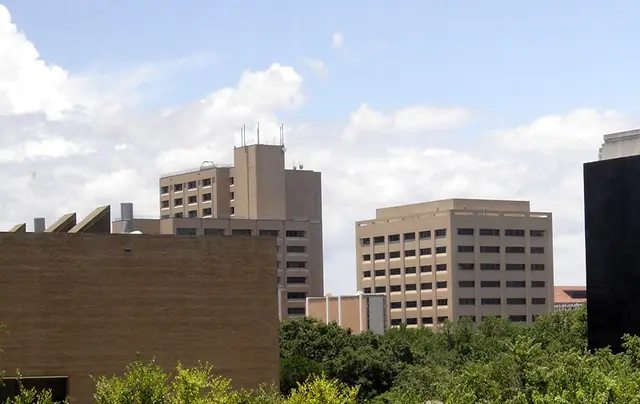
I, Zereshk / Wikimedia Commons / "UT Austin Engineering Buildings" / CC BY-SA 3.0
The University of Texas at Austin's chemical engineering program, ranked No. 8 in the nation, offers students the chance to develop technical and teamwork skills through a world-class faculty. The program focuses on groundbreaking research in energy, human health, and sustainability. With a commitment to diversity, equity, and inclusion, the program guarantees 100% full funding, including tuition, health insurance, and a competitive stipend. The university also provides support for families, including academic milestone extensions, on-site lactation rooms, and access to the UT Child Development Center. Students benefit from a vibrant community of engineering organizations and interdisciplinary opportunities, with access to resources across campus.
University of Texas, Austin (Cockrell) Civil Engineering school acceptance rate
University of Texas, Austin (Cockrell)'s Civil Engineering acceptance rate is 17.70%.
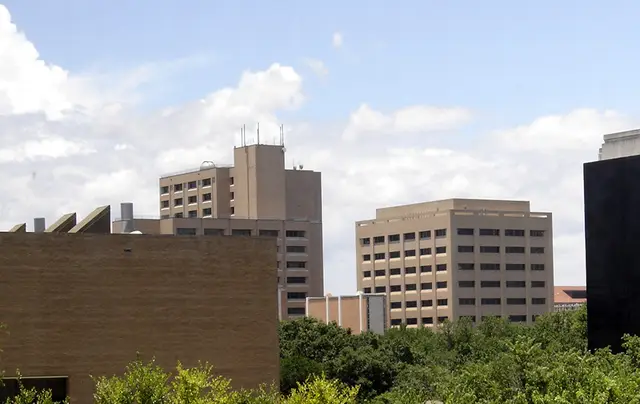
I, Zereshk / Wikimedia Commons / "UT Austin Engineering Buildings" / CC BY-SA 3.0
The Department of Civil, Architectural, and Environmental Engineering is renowned worldwide for its graduate program, which develops students into leaders in engineering practice, research, and education. The department invites applications from highly qualified and motivated students seeking M.S.E. and Ph.D. degrees. With a focus on the complex challenges related to cities, water, and energy, the program aims to equip students with the necessary knowledge and teamwork skills to innovate future solutions and sustainable systems. The department boasts state-of-the-art facilities and research centers that provide students with opportunities for exploration and collaboration. Graduates are prepared to excel in various sectors, including industry, academia, civil service, and more. While an engineering undergraduate degree is preferred, exceptional candidates with other backgrounds may be considered and may need to complete additional leveling courses. The program offers different areas of study, including Building Energy and Environments, Environmental and Water Resources Engineering, Structural Engineering, and more. There is also a dual degree option in collaboration with the LBJ School of Public Affairs.
University of Texas, Austin (Cockrell) Engineering school acceptance rate
University of Texas, Austin (Cockrell)'s Engineering acceptance rate is 18.5%. The average GRE Verbal Reasoning score for University of Texas, Austin (Cockrell) Engineering is 157, and the Quantitative Reasoning score is 165.
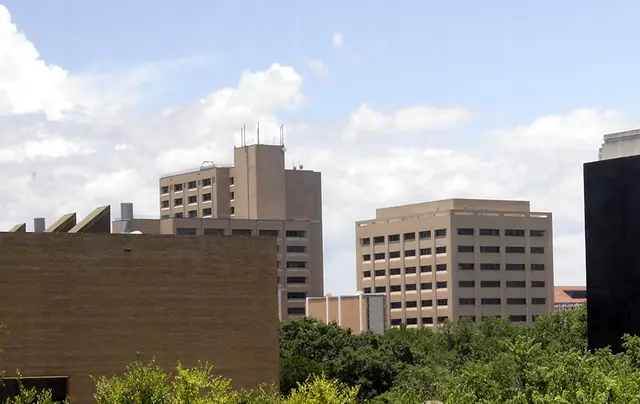
I, Zereshk / Wikimedia Commons / "UT Austin Engineering Buildings" / CC BY-SA 3.0
The Cockrell School of Engineering at the University of Texas, Austin has made significant social contributions through its research and initiatives in various engineering fields. It has played a crucial role in advancing sustainable energy solutions, focusing on renewable energy technologies and energy-efficient systems. The school's contributions to healthcare engineering include the development of innovative medical devices, improving healthcare delivery systems, and conducting research on biomedical technologies. Additionally, the Cockrell School has addressed water scarcity and environmental sustainability through research in water resources and environmental engineering, including water management, wastewater treatment technologies, and sustainable infrastructure. These efforts have had a positive impact on society by addressing pressing challenges and promoting sustainability through engineering innovation.
University of Texas, Austin (McCombs) Accounting school acceptance rate
University of Texas, Austin (McCombs)'s Accounting acceptance rate is 28.50%.
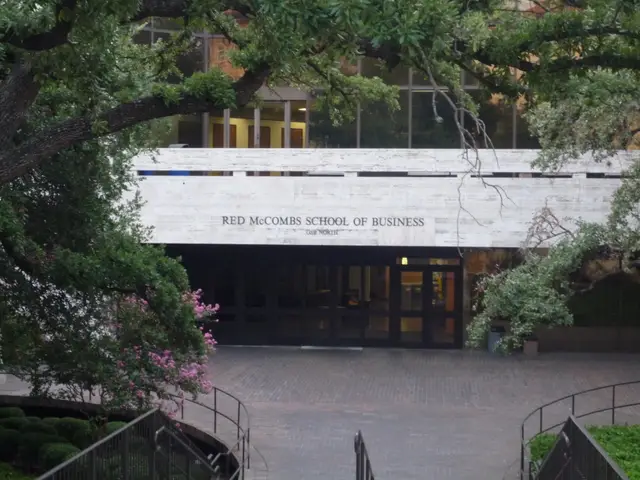
Utexas / Wikimedia Commons / "Red McCombs School of Business" / Public domain
The Texas McCombs MPA program offers a diverse and comprehensive education to prepare students for success worldwide. With three distinct approaches to career advancement, students can choose the path that suits them best. The program features well-designed courses taught by esteemed faculty, study abroad opportunities in Prague, and unique internships. Core classes provide a solid accounting foundation, while MBA electives cover various areas such as finance, management, information technology, strategy, and marketing. Over 400 companies, including top-tier public accounting firms and industry leaders, actively recruit Texas McCombs MPA students, offering excellent career acceleration opportunities. The program also boasts higher CPA exam pass rates and is located in the thriving city of Austin, Texas.
University of Virginia Law school acceptance rate
University of Virginia's Law acceptance rate is 9.70%. The average GRE Verbal Reasoning score for University of Virginia Law is 162, and the Quantitative Reasoning score is 158.
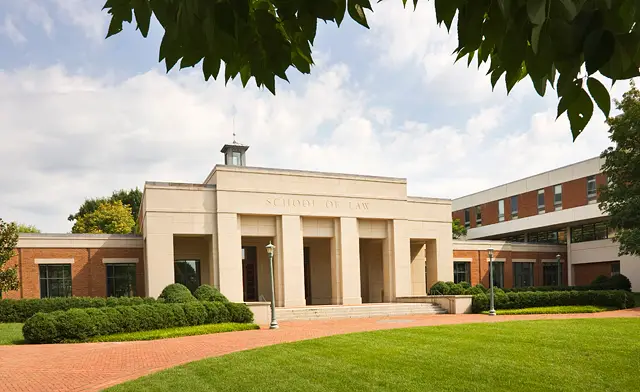
Mmw3v at English Wikipedia / Wikimedia Commons / "University of Virginia School of Law" / CC BY 3.0
The University of Virginia School of Law, established in 1819, holds a prominent position in legal education. Located in Charlottesville, Virginia, it benefits from its historical significance and picturesque surroundings. One of the unique aspects of the University of Virginia School of Law is its distinctive academic program known as the "Law and Business Program." This program allows students to pursue a joint J.D./M.B.A. degree, combining legal and business studies to prepare graduates for a wide range of career opportunities at the intersection of law and business. It equips students with a comprehensive understanding of both disciplines, enhancing their analytical and decision-making skills.
University of Washington Computer Science school acceptance rate
University of Washington's Computer Science acceptance rate is 9.00%.

Joe Mabel / Wikimedia Commons / "UW Paul G Allen Center, interior pano 02" / CC BY-SA 4.0
The MSCSS program offers students a comprehensive understanding of computer science concepts through research and study guided by esteemed faculty and industry fellows. Students can choose to pursue a thesis, capstone project, or explore a variety of electives to expand their learning. Close relationships with high-tech industry partners provide real-world perspectives. Graduates of the program hold positions as software development engineers, program managers, cybersecurity experts, data scientists, and systems developers worldwide. The program aims to equip graduates with the skills to conduct independent research, understand software system architecture, adapt to emerging technologies, analyze and solve computing-related problems, and effectively communicate in team environments. Students also develop the ability to apply theoretical foundations, use relevant tools, and recognize the importance of continuous professional development.
University of Washington Medicine school acceptance rate
University of Washington's Medicine acceptance rate is 3.70%.

Atomic Taco / Wikimedia Commons / "UWMC" / CC BY-SA 3.0
The University of Washington School of Medicine, established in 1946, has a rich history of medical education and innovation. It was founded as a response to the pressing need for physicians in the region following World War II. The school quickly gained prominence for its pioneering research and commitment to advancing healthcare. Notably, the University of Washington School of Medicine played a crucial role in the development of the kidney dialysis machine and the first successful heart transplant in the United States. The school prides itself on its unique WWAMI (Washington, Wyoming, Alaska, Montana, Idaho) program, which extends medical education and training to underserved communities in the region. With a focus on interprofessional collaboration, students benefit from a comprehensive and interdisciplinary approach to healthcare. With an impressive graduation rate of 99%, the school consistently produces highly skilled physicians dedicated to improving patient care and advancing medical knowledge.
University of Wisconsin, Madison Education school acceptance rate
University of Wisconsin, Madison's Education acceptance rate is 43.10%. The average GRE Verbal Reasoning score for University of Wisconsin, Madison Education is 156, and the Quantitative Reasoning score is 157.
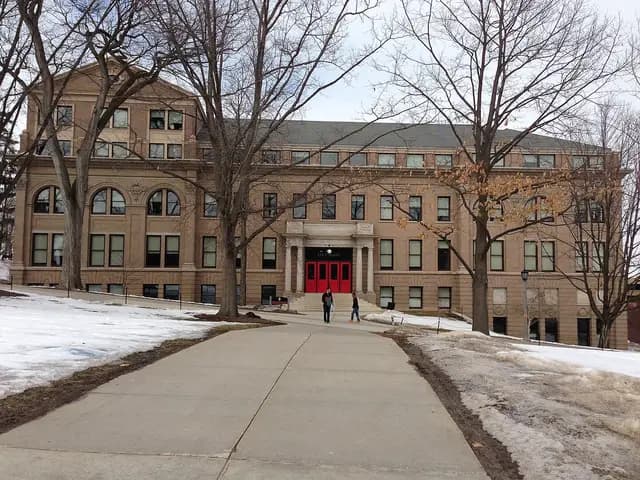
Czar / Wikimedia Commons / "University of Wisconsin–Madison Education Building" / CC0
The University of Wisconsin-Madison, founded in 1848, is a public land-grant university and a major research institution. The students, staff, and faculty engage in a world-class education while solving real-world problems.It encourages students to explore connections between education and fields such as psychology, sociology, economics, and public policy, fostering a holistic understanding of the complexities of education. It is known for its innovative programs and initiatives, such as its partnerships with local schools and community organizations, which provide hands-on learning experiences and opportunities for students to make a meaningful impact. Notably, it boasts a diverse student body, fostering an inclusive learning environment that values and celebrates different perspectives.
Vanderbilt University (Peabody) Education school acceptance rate
Vanderbilt University (Peabody)'s Education acceptance rate is 56.12%. The average GRE Verbal Reasoning score for Vanderbilt University (Peabody) Education is 158, and the Quantitative Reasoning score is 158.
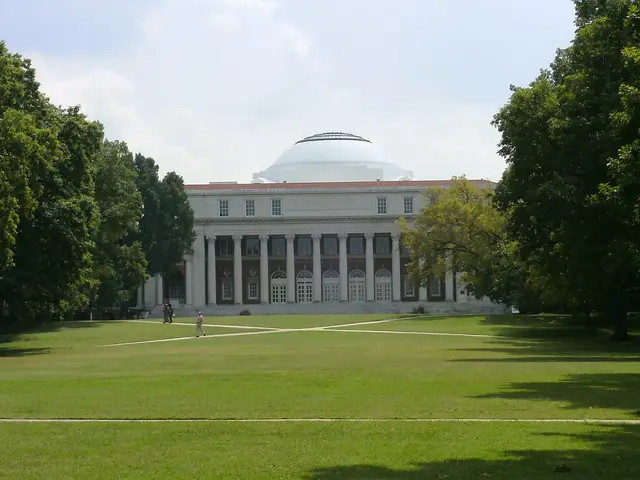
Jbaker08 / Wikimedia Commons / "Peabodyvu" / Public domain
The Vanderbilt University (Peabody) Graduate School of Education, established in 1875, has a reputation for empirical rigor in educational neuroscience; child, family, and community development; special education; the learning sciences; and educational leadership and policy. This interdisciplinary focus allows students to gain a comprehensive understanding of education and develop innovative solutions. Additionally, Peabody is dedicated to promoting equity and inclusivity in education, actively working to eliminate disparities and provide opportunities for all learners. Its strong focus on social justice and diversity sets it apart and attracts students who are passionate about creating positive change in education. Considered a “Southern Ivy” school, Vanderbilt boasts an alumni base of national leaders, professional athletes, and Nobel Prize laureates. Located in the bustling city of Nashville, Tennessee, it enjoys the advantage of being situated in a city ranked as one of the friendliest cities in America.
Virginia Tech Architecture school acceptance rate
Virginia Tech's Architecture acceptance rate is 75.00%.
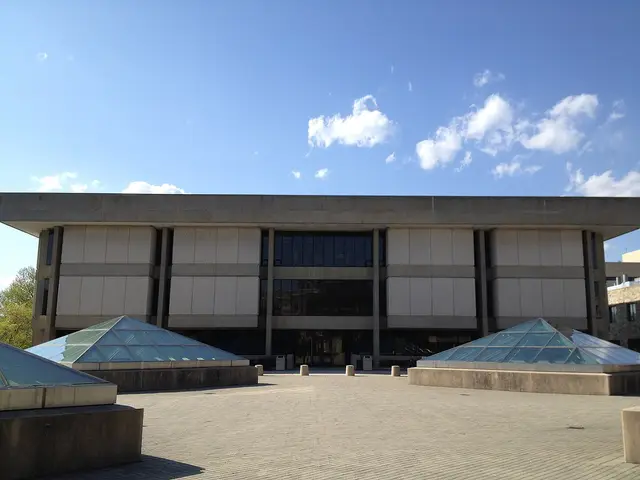
Eric T Gunther / Wikimedia Commons / "Cowgill Hall Virginia Tech" / CC BY 3.0
The Virginia Tech Graduate School of Architecture, established in 1964, is renowned for its excellence in architectural education and research. Located in Blacksburg, Virginia, it benefits from its proximity to the beautiful Appalachian Mountains, providing a unique setting for students to explore the integration of design and nature. In addition to the graduate degrees, the school offers Interdisciplinary Graduate Education Programs. These programs allow students to further tailor their education in areas of concentration by integrating knowledge from various fields, such as engineering and urban planning. Hence, students develop a broader perspective and are equipped to address complex architectural challenges effectively.
Virginia Tech Civil Engineering school acceptance rate
Virginia Tech's Civil Engineering acceptance rate is 68.00%.
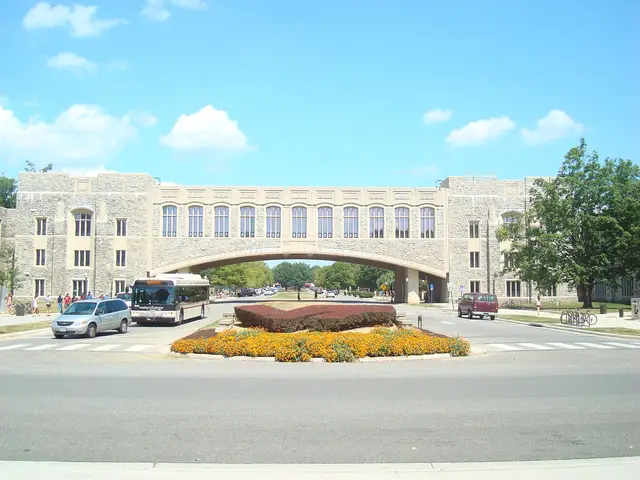
PumpkinSky / Wikimedia Commons / "VaTech Torgersen Hall Bridge" / CC BY-SA 3.0
The Charles E. Via, Jr. Department of Civil and Environmental Engineering is a prestigious program ranked among the top 10 in the US. With over 70 faculty members and a large student body of 400 graduate students, it is one of the largest departments in the country. The department offers comprehensive educational programs covering various areas of civil engineering practice and is home to more than 15 centers and laboratories for research and instruction. Its mission is to provide a high-quality learning environment, conduct research that promotes sustainable engineering, and contribute to society through leadership and service. Financial aid is available, and graduate students can join several student organizations related to their field of study.
Washington University in St. Louis Architecture school acceptance rate
Washington University in St. Louis's Architecture acceptance rate is 78.00%.
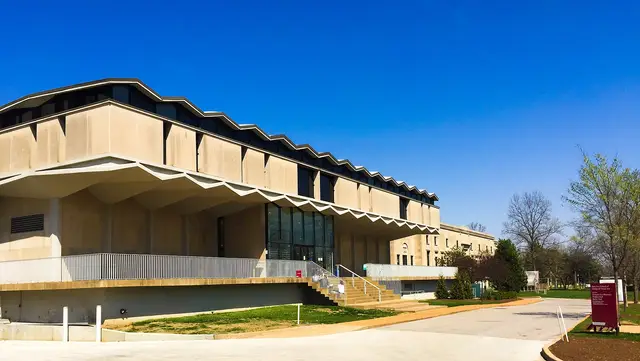
LittleT889 / Wikimedia Commons / "Steinberg Hall" / CC BY-SA 4.0
The Washington University in St. Louis Graduate School of Architecture has made significant contributions to architectural advancement throughout its history. One of its notable contributions is its role in the development of the modernist movement in the United States. In the mid-20th century, the school became a hotbed of experimentation and innovation, attracting influential architects and educators. Architects such as Minoru Yamasaki, who later designed the World Trade Center towers, and Gyo Obata, co-founder of the global firm HOK, studied and taught at the school during this time, shaping the future of modern architecture. Moreover, the school has been actively involved in exploring environmentally conscious architectural practices, including energy-efficient building systems, green materials, and sustainable urban planning.
Yale University Business school acceptance rate
Yale University's Business acceptance rate is 9.00%. The average GRE Verbal Reasoning score for Yale University Business is 164, and the Quantitative Reasoning score is 166. The average GMAT score for Yale University Business is 725.
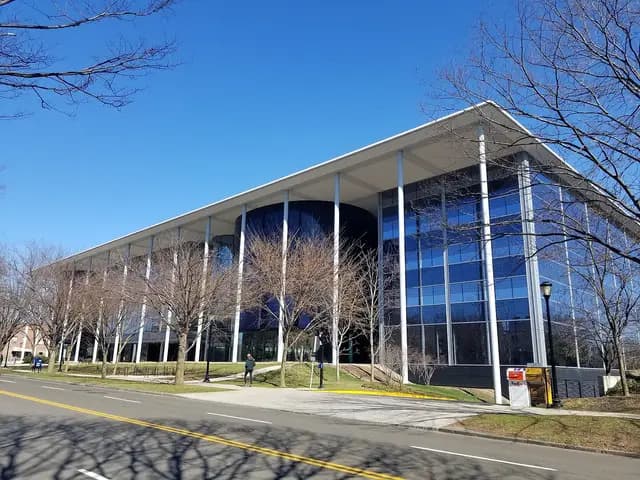
HOUYIMIN / Wikimedia Commons / "Edward P. Evans Hall" / CC BY-SA 4.0
Yale University's School of Management (SOM), established in 1976, has quickly risen to prominence as a top-tier business institution with its distinctive approach to education. SOM combines rigorous academics, experiential learning, and a focus on societal impact to prepare students for success in the business world. SOM attracts talented and diverse students who are passionate about making a difference. The school's commitment to excellence is reflected in its impressive career outcomes, with 94% of the class of 2020 securing employment within three months of graduation. Notably, SOM graduates thrive in a variety of industries, including consulting, technology, finance, and social impact organizations. With its rich history, rigorous programs, and emphasis on social responsibility, Yale SOM continues to shape the next generation of business leaders.
Yale University Economics school acceptance rate
Yale University's Economics acceptance rate is 7.00%.
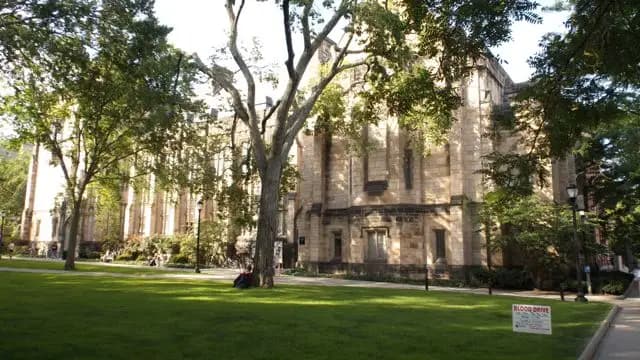
Donschueler / Wikimedia Commons / "Harkness Hall at Yale" / CC BY-SA 3.0
Yale's Department of Economics, alongside its affiliated research centers, is renowned for its research and teaching in economics. With a diverse faculty of over 60 members, the department explores various subfields and contributes to economic policy through cutting-edge quantitative analysis. Notably, four faculty members have received the Nobel Prize in Economics. The department hosts over 135 Ph.D. students and 50 pre-doctoral fellows from diverse backgrounds worldwide. Additionally, it maintains strong connections with other professional schools at Yale, facilitating interdisciplinary collaboration. The faculty's broad research and teaching interests cover a wide range of topics, providing students with a comprehensive education in economics. The department promotes critical thinking, exposing students to different methodologies and perspectives in economics.
Yale University Law school acceptance rate
Yale University's Law acceptance rate is 4.06%. The average GRE Verbal Reasoning score for Yale University Law is 168, and the Quantitative Reasoning score is 166.
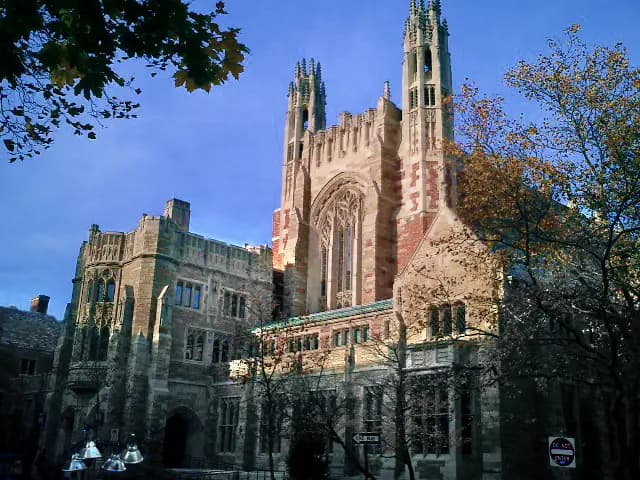
Shmitra at the English-language Wikipedia / Wikimedia Commons / "Yale Law School in the Sterling Law Building" / CC BY-SA 3.0
The Yale University School of Law, founded in 1824, is a prestigious institution and has been ranked as the best law school in the United States by U.S. News & World Report every year between 1990 and 2022. Located in New Haven, Connecticut, it benefits from its proximity to numerous federal and state courts, providing students with unparalleled access to legal resources and practical experiences. The program is distinguished by its small class sizes, fostering a close-knit community and enabling students to engage in meaningful discussions with world-class faculty members. Known for its emphasis on public interest law, Yale Law School produces graduates committed to social justice and public service. It has produced notable alumni such as former U.S. presidents, Supreme Court justices, and influential legal scholars. Recognized as one of the top law schools in the world, it consistently ranks at the top of national and global rankings, reflecting its academic excellence and dedication to producing exceptional legal professionals.
Yale University Medicine school acceptance rate
Yale University's Medicine acceptance rate is 4.80%.

Emilie Foyer / Wikimedia Commons / "Yale University 08" / CC BY-SA 3.0
The Yale University School of Medicine, founded in 1810, is a renowned institution the boasts an impressive research portfolio. Situated in New Haven, Connecticut, the program benefits from its close proximity to Yale-New Haven Hospital, fostering a robust clinical environment. Notably, it was the first U.S. medical school to require a thesis for graduation. The school ranked #8 in the U.S. News & World Report's Best Medical Schools for Research in 2022. Graduates emerge as exceptional clinicians and researchers. Notable alumni include Nobel laureates, groundbreaking researchers, and renowned physicians. With a rich history and commitment to advancing healthcare, the Yale University School of Medicine remains a pillar of excellence in medical education and research.
Yale University Psychology school acceptance rate
Yale University's Psychology acceptance rate is 6.00%.
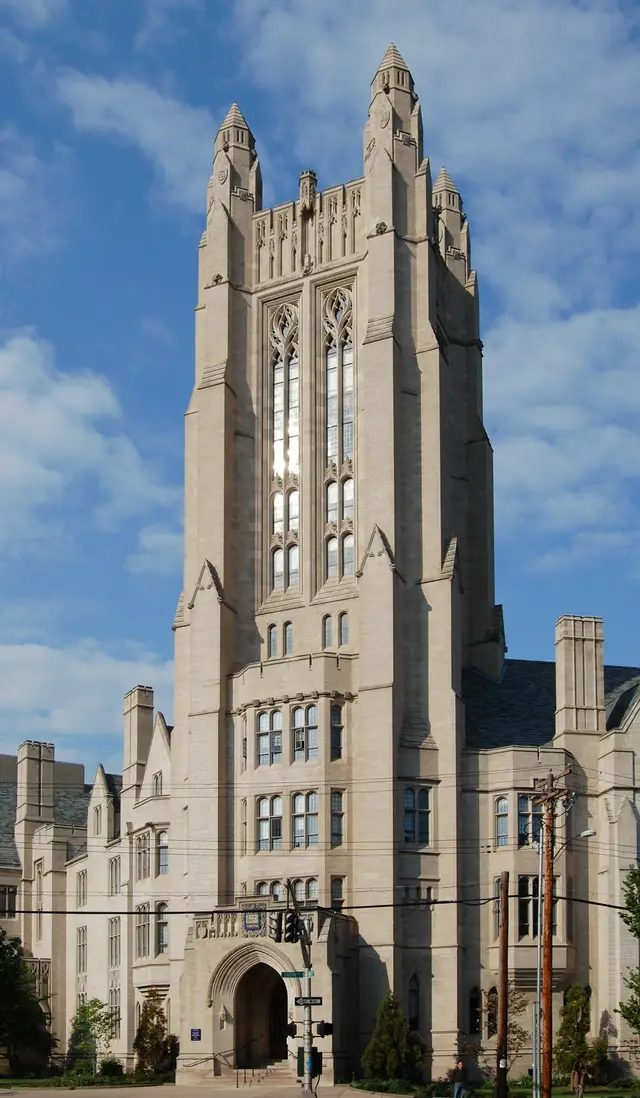
Alex Guerrero / Wikimedia Commons / "Sheffield Sterling Strathcona Hall" / CC BY-SA 2.0
The Department of Psychology at Yale University boasts a faculty at the forefront of research and scholarship in the field. Graduate education in psychology focuses on training researchers who will advance the science of psychology. The program admits approximately 15 new Ph.D. students annually, allowing them to specialize in one of five areas of concentration while fostering collaboration across labs and interdisciplinary programs. The department recruits exceptional scholars in clinical, cognitive, developmental, neuroscience, and social-personality psychology, with an emphasis on interdisciplinary interests. The program encourages research that integrates diverse perspectives and addresses real-world issues. With a commitment to individualized attention and inclusiveness, the department provides a stimulating and challenging environment for students.
Conclusion
And there you have it - the top graduate schools. These are some of the best schools in the country for, and admission into any of them would be a great accomplishment that could set you up for a strong career. Good luck!
Interested in the top graduate schools by program?
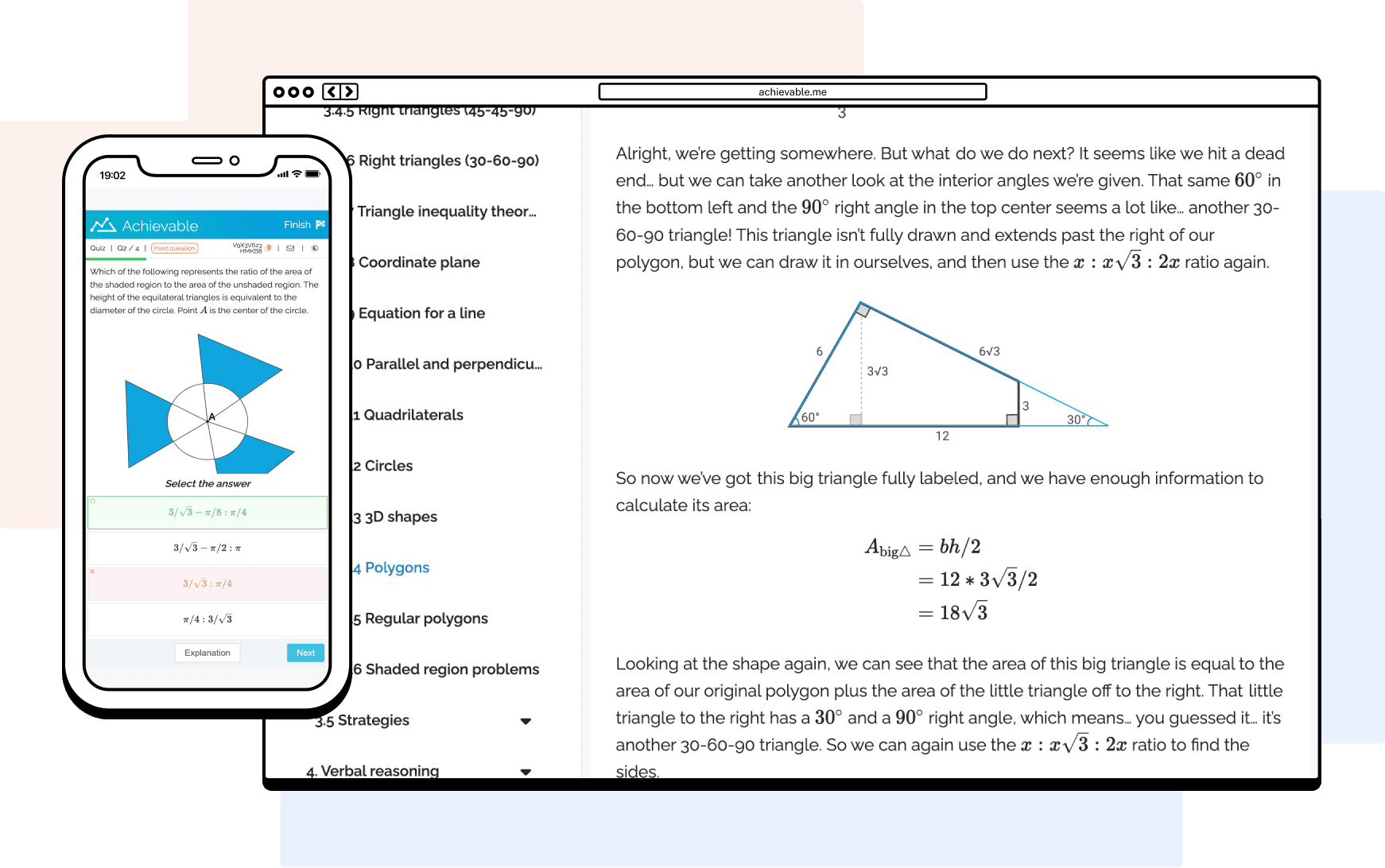
Hit your target score
Achievable is the best online GRE exam prep course: effective, personalized, and convenient. With Achievable, you'll spend less time studying and hit your target score with confidence.
